Feed aggregator
Book Review: Rose of Jericho by Alex Grecian
I received a review copy from the publisher. This does not affect the contents of my review and all opinions are my own.
 Rose of Jericho by Alex Grecian
Rose of Jericho by Alex Grecian
Mogsy’s Rating: 4 of 5 stars
Genre: Horror
Series: Stand Alone
Publisher: Nightfire (March 11, 2025)
Length: 352 pages
Author Information: Website
Rose of Jericho by Alex Grecian returns to the dark and supernatural world first introduced in Red Rabbit, his 1880s western horror novel. While this is technically a follow-up that revisits the witchy trio of Sadie Grace, Rabbit, and Rose, it still stands solidly on its own, allowing new readers to jump in without needing prior knowledge. And personally, I found this new book to be even stronger and more immersive than its predecessor.
The book begins with a tragedy. A man named Moses Burke loses both his beloved wife and newborn child, and in his grief, takes on Death himself and murders him. Readers are transported back to the remote village of Ascension, Massachusetts, where the result of Death’s absence is subsequently illustrated in a bizarre string of events that go against the natural order. A gruesome accident that should have killed a boy instead leaves him walking around with a hole in his chest. Likewise, a terminally ill woman finds that the progression of her disease has halted, so she can suddenly get out of bed and go about her day. A hanged man calls out while still hanging from the noose, even with his neck broken and eyes pecked out by crows. And on and on it goes. It appears people can no longer die! While this revelation is met with confusion, there is also no small amount of excitement.
However, the longer this reality persists, the more the town and its residents are feeling its dark effects. Inside, those who should have been dead are changing, becoming more dangerous. Newly arrived in town, Rabbit, Sadie Grace, and Rose watch as chaos descends upon Ascension. As the three women attempt to find out what’s going on, they must also contend with the restless entities that haunt Bethany Hall, the old house they are staying in while they help take care of Rose’s sick cousin.
Unsurprisingly, Rose of Jericho delves into some thought-provoking themes, questioning the significance of mortality by exploring the balance between life and death. The Grim Reaper is literally killed off in a fit of rage, and the ripples created by this one impulsive act result in grave consequences for everyone on the planet. For the deeply religious townsfolk of Ascension, you can just imagine their struggle to reconcile their beliefs with what’s happening around them, and though readers only get to see the effects on this one little slice of the world, we can easily surmise that all hell has broken loose across the globe as well.
Speaking of Ascension, the author also does a fantastic job of bringing the town to life, making it feel even more vivid and immersive than I remember from Red Rabbit. This sort-of sequel gave us a chance to see more of the town, providing a deeper look into its people, customs, and day-to-day struggles—though admittedly, describing their “daily life” takes on a more sinister meaning when we’re talking about a world where no on can truly die. As the characters go on existing in this strange limbo, we watch some of them embrace what they believe is a gift or miracle, while others who are more skeptical end up succumbing to fear and paranoia.
All in all, Rose of Jericho is a unique dark fantasy novel that balances horror and grim humor while providing plenty of food for thought. The overall vibe is a mixture of eerie gothic and surreal western, presenting a weird but refreshing premise that keeps the story engaging and unpredictable. I found Alex Grecian’s prose and character work to be much stronger here than in Red Rabbit, but whether you’re returning to this world or a complete newcomer, I believe Rose of Jericho is an interesting and strange journey worth taking.
![]()
![]()
Free Fiction Monday: Rehab
Caitlin Carter seeks purpose. She needs to, or so her counselors at the VA keep telling her. Find a reason to live. Forget the past.
The past haunts her, especially because she lives in her old hometown. The place where the trouble started.
Until she finds exploring her past might help her find a future…just not the way she expects.
A powerful story about veterans and the traumas they continue to face even at home.
“Rehab” is available for one week on this site. The ebook is also available on all retail stores, as well as here.
Rehab By Kristine Kathryn Rusch
Not quite homeless. That’s how she described herself to herself. Not quite homeless but not quite home, either.
Caitlin Carter started her walk back from her appointment at the VA. The stately old building had been at the edge of mansion row for more than forty years, as the neighborhood slowly slipped into decline.
She barely saw it any more. She grew up only a few blocks away, and the mansions had never really been at their peak—not in her lifetime.
She wore two stocking caps over her skull, one pulled down almost to her eyebrows, and two pairs of gloves over her hands, which she still stuck in her pockets. One of the many gifts of her desert tours was a broken internal thermometer—light cold seemed too cold, harsh cold seemed warm, deadly cold felt welcoming—and she made sure she dressed like the sensible Midwestern girl she had been, back before she decided to chuck it all for the sake of some excitement or (oh, hell, let’s be honest) to tell her law-and-order father to go fuck himself.
So many issues, so little time. At least that was what she joked with the shrink the last time she heard, “I’m afraid our time is up.” Yeah, she always just got started, and then the time was up, and she was sent into the cold, literally, at least this winter.
No matter what she did, she couldn’t get her parents out of her mind. She’d moved back in with them six months ago—not in her old bedroom because that belonged to some other girl. A girl who graduated high school, smiled wide, dressed in pink, and had totally dorky boyfriends. A girl with trophies on her shelf from volleyball tournaments, certificates from math contests framed over her bed, and one rather nasty juvie file in a shadow box below a shattered mirror.
Yeah, that girl had issues.
The woman has more.
She lived in the grandmother apartment over her parents’ garage. One bedroom, half kitchen, tiny bathroom, ugly living area. The smell of exhaust filled the place every time her father moved the car.
She found the smell of exhaust comforting.
She needed comforting, because the apartment wasn’t. Her parents weren’t either. Her mother couldn’t meet her eyes, even now, and her father, for all his talk of wasted potential, still mentioned that one night, the joyride, the anger, the accident, leading to what would’ve been a couple of felonies had she been one week older, or had Michael actually died of his injuries.
Caitlin had told her father she hadn’t known Michael had put a gun in her glove box and carried a knife inside his boot. She claimed she hadn’t known about the weapons till she and Michael had ripped off the liquor store that failed to serve them, and sped off, crashing through the windows of a car dealership not half a block away.
Not the worst thing that happened to her, by far.
The thing her father blamed, though. Technically, he hadn’t paid off the judge, but she knew there was a tit-for-tat, probably dealing with secrets. Her father loved secrets, knew where the bodies were buried, liked to haul out the skeletons when he needed them.
And he’d needed them that night, when he traded her years in a juvie facility and/or some prison somewhere for mandatory military service. Sounded like punishment to her at the time.
Life-saving, turned out.
She carefully picked her way across the ice-covered street, to the unshoveled sidewalks of mansion row. Her breath fanned out around her like exhaust from the engines of a dozen jeeps.
It had taken nearly a year to work her way up the VA’s waiting list. Counselors—especially those dealing with the psychological problems—were in high demand.
Her problems had started long before she joined up, got exacerbated by her tours. If it weren’t for the nightmares—the screaming, pound-her-fist-through-the-wall nightmares—she probably wouldn’t have signed up for counseling in the first place.
Thrown out of three separate apartments at the far end of town. License restricted for driving drunk, which limited her choices—especially here, where the phrase “bus service” was an oxymoron and public transportation meant taking a tourist trolley that circled the downtown.
She had to move close to the VA because if she missed one appointment, just one, she got knocked down to the bottom of the waiting list again, and much as she hated the shrink talk and the sharing and the crappy way she felt when the sessions were over, she hated not having someone to talk to—really talk to—worse.
So she walked, every day, even when it was ten below, like today. No matter what her mother said, Caitlin didn’t wear a ski mask over her face—that would bring back flashbacks to high school and the rebellion and the power-high she got from pulling cash from some stupid clerk’s till. (Okay, so she had known about the gun, but she’d only told the shrink that last week. It’d been her gun (which she stole from another kid’s locker), and Michael had been too injured to ever contradict her—at least when it counted, during the so-called court case, the judgment that sent her on the path that led to this icy sidewalk, this everyday walk.)
She tucked her chin inside the parka, letting the fake fur caress her face. Whenever she felt the fake fur, she knew she was okay—not too cold—because if she were too cold, she’d feel nothing at all.
Time to walk back to the undecorated apartment and wait until she had to show up for one of her three five-hour shifts at the nearby coffee shop, the only place that would hire vets and let them be around people. Didn’t matter that most of the customers were also vets. Didn’t matter that she rarely said more than “That’ll be $2.50” and “Here’s your change, sir.” At least she got out of the house.
Or so she said to herself.
She saved the mansion for the way back. She loved the mansion. She had loved it since she was a child.
She used to walk down this stately old boulevard near her parents’ house, and imagine living in the mansions. Back then, they were apartments, mostly, although some were still single-family dwellings. All had fallen on hard times, or so everyone thought.
But even harder times had been on the horizon.
Now most of the mansions were boarded up, with plywood over the windows and doors. Her favorite was on the corner of two boulevards, and it seemed to take up half the block. When she was a kid, an old lady lived there, alone. Sometimes Caitlin saw the old lady, tottering her way to the really fancy car that she left parked in the driveway.
But mostly, Caitlin wondered how one person could live in such a large place. It had three stories, plus an attic and a basement and the biggest garage Caitlin had ever seen.
She used to hoist herself up on top of the stone fence and peer into the yard, imagining what it would be like to own the house. Then the old lady called the cops on her, and Caitlin never climbed the fence again.
She had forgotten about the place until she lost her last apartment, and walked to her parents’ house when the VA admitted it couldn’t help her if she didn’t help herself. They said she needed meaning in her life. She needed purpose. They meant she had to get treatment for her anxiety and PTSD and all-around out-of-control behavior.
But she took it as the one final wake-up call.
Because as she walked those four blocks to her parents’ house to beg for a place to stay, she kept looking at the ruined homes on the dying boulevard and thinking how easy it would be to slip inside one, and squat for a few days, a few months, and no one would ever be the wiser.
That was her backup plan if her parents officially threw her out. When she arrived at her parents’ to beg for her old room back, her mother had made that thin-lipped disapproving grimace that always made Caitlin’s stomach queasy, but her father had just stared at her. He’d had something in his gaze she’d never seen before.
“Yeah,” he’d said. “We’ll fix up the apartment over the garage.”
She could have taken that badly—that they didn’t want her inside their house. But Caitlin had a sense that her father understood what it took for her to ask, and, even weirder, had understood what she needed. What she needed was a place of her own where no one would bother her, and yet, a place where someone kept an eye out for her.
She offered to pay rent, and he told her to bank the money instead. And somehow, that conversation had left her more shaken than any conversation she’d ever had with him—including the angry ones over her terrible behavior in her seventeenth year.
That walk, though—that walk through the mansions, in the long-dead, formerly rich area of town—that walk was the moment when she labeled herself almost-homeless, when she knew she had only a hairsbreadth between being someone with a glimmer of a future and being someone who only had a past.
Every day since, she’d used the mansion as a measuring stick: Was she better? Had she moved forward?
And every day, she had no answer at all.
She stood outside on this cold, cold afternoon and stared at the mansion, with its wrap-around porch, columns, and gabled attic. When she first came on these regular walks, she wondered what the neighbors thought of her staring at the place, and then she realized there were no neighbors.
The neighborhood was as empty as some of the bombed-out places she had patrolled in Fallujah. Someone had lived here once, but no one did now.
No one cared.
The storm the night before had dumped nearly two feet of snow on the neighborhood. No one had shoveled sidewalks, because no one cared. A plow had gone through and tossed even more snow on the sidewalk. There was no real path, only an icy trail of footprints that she had made at the beginning of the winter.
She frowned at the mansion. If she stared at it, and let her eyes blur, it looked no different than it had when the old lady had lived there.
But if Caitlin really looked at it, she realized the house was falling apart, like every other place on this block.
And the snow the night before would only make things worse.
She slipped through the broken gate. No one had shoveled the mansion’s sidewalk either. The only way she had known there was a sidewalk was from memory, the way the brick walk went from the stone fence to the matching stone steps that eased the journey up the small knoll the mansion rested on.
Her boots crunched on the snow’s hard surface, breaking through to a layer of ice beneath. The door ahead looked dark and foreboding, and, unlike the rest of the building’s façade, had no snow plastered against it.
If she were in an old movie, her breath might have come shallowly and she might’ve felt some trepidation. But she knew, she knew, no snipers sat in the windows, no family waited with guns in hand, no insurgent had planted a bomb beneath the stairs.
Maybe she would have worried about such things six months before, but she’d had six months to wrap her brain around the reality of now, not the memory of then, and no matter how bad it might get inside a mansion in her hometown, it would be nothing compared with what she’d seen.
What she’d done.
That last thought made her heart flutter just a bit. She took a deep breath of air so cold that it burned going into her lungs.
She made herself focus on her destination, and as she did so, she realized that the door was partially open. Snow had piled against it, making sure it would never close.
Open all winter, the mansion’s decay would accelerate. No one would come here and check—not the city historical division which was trying to sell the place, not the police, not the imaginary neighbors. No one would notice this; no one would understand it.
No one except her.
She continued forward, up another, smaller flight of stairs, and then crossed the pristine layer of snow to the house itself.
She had never stepped on the porch, not in years of dreaming about it. Up close, the porch looked dangerous. In the places where the snow did not blanket the surface, she saw rotted wood and broken beams.
The mansion’s stone exterior needed some kind of grout or something—whatever they put between the stones—and the door wasn’t open, so much as it wasn’t really intact.
Ah hell, she might as well be honest with herself: The door was shattered, and the snow that accumulated near the opening was as deep as the snow around the building.
Even though she had stared at the thing for months, she hadn’t realized that it had been snowing inside since winter began.
She put her hand on one of the stone columns that made the mansion look so stately.
She pushed past the broken door, stepped over the biggest mound of snow, and felt her heart sink as she saw how deep the snow had piled inside.
The house was as cold inside as it was out, but the air didn’t have the fresh crispness of the outdoors. It smelled faintly sour, and she knew, if the inside were any warmer, that sour smell would grow into something overpowering.
Still, she felt almost like a child as she stepped inside the foyer. To her right was the receiving room. It still had its dark wood wainscoting, but someone had painted the area between the end of the wainscoting and the crown molding a bright pink. She winced when she saw it, and when she saw the cracked and ruined fireplace (as if someone had gone after it with a bat), and the toppled radiator.
Each room she walked through had damage—a rotted floor, dented plaster and lathe, missing light fixtures. The kitchen had no appliances. It looked like they—and the sink—had been ripped from the wall. A large stain near the water pipe where the sink had been made her think that water had flowed steadily since the sink was gone—until a deep freeze froze the pipes.
She didn’t want to think about that damage—or any of the damage she couldn’t really see.
Still, here and there, she saw traces of love. This house had been grand once, and then when it was no longer grand, someone had still cared for it enough to keep its character.
The damage didn’t look fresh, but it didn’t look decades old either. The house had good bones beneath all the garbage and the destruction.
She ventured to the back staircase. Part of it threaded down into a basement, and she just couldn’t bring herself to go there, not on the coldest day of the year so far. But upstairs—she had always wanted to see upstairs.
The staircase twisted upward, working its way around two corners. It opened in a narrow hallway, and she realized with a bit of a shock that this house actually had a servant’s wing. Two small bedrooms separated by the tiniest jack-and-jill bathroom she’d ever seen convinced her of that. The bathroom was 1950s vintage, and looked like it hadn’t been cleaned in at least forty years.
The door to the hallway was closed. She pushed it open, the squeal echoing in the emptiness. Her heart started pounding now.
She recognized the feeling. A sense that she didn’t belong, combined with experience from a dozen (maybe a hundred) entries into seemingly empty buildings, only to have someone jump out at her, or a hand clutch her arm, holding her back just in time to save her from danger.
She was slipping, slipping into memory. She recognized the feeling, and she caught herself. She didn’t dare leave this place—this frigid and empty house, a building she had always wanted to visit.
It wasn’t dangerous here.
It was just broken.
Rather like her.
Amazing how broken could seem dangerous when viewed in the wrong light.
She took a deep breath and made herself walk forward. Two medium-sized bedrooms. A remodeled bathroom with a claw foot tub and a glassed-in shower added at least thirty years before.
The stained glass window over the toilet made her realize that nothing had been broken or stolen up here. Apparently the thieves from downstairs hadn’t ventured up this high.
She let out a small sigh, then continued on, to what had to be the master suite. Rays of thin winter light penetrated the hallway. The sour stench seemed stronger here, probably because this level was just a tiny bit warmer.
She stepped into the bedroom—and stopped.
A camp stove, blankets, a sleeping bag, some books, all scattered near the fireplace. Half burned wood rested against the fireplace’s brick wall.
And next to it all, a person wrapped in blankets.
Or what was left of a person.
She had seen enough death to know that death had come and gone from this room at least a week ago, maybe more.
She swallowed hard, looked at the little camping area, saw that whoever this had been had managed to clear the fireplace, but either the flue was closed or there was a block in the chimney, because soot covered too much of the area around the body.
A pitcher, with ice along the rim, sat beside the fireplace. Her heart twisted.
He—and it had been a he—had put out the fire rather than burn the house down. Respect, to the bitter end.
She crouched before him, saw the dog tags first, maybe because she had looked for the dog tags first. His face was too ruined for her to tell what he looked like, but if he tried to live here and he was a vet, she had a hunch she had seen him before.
He had stolen her idea of living in one of the mansions so that he could be close to the VA, only he hadn’t thought it through. Sleeping in one of these old places was fine in summer and maybe okay in early fall, but on days like this, the house needed more than a single fireplace, and if that wasn’t working, well…
“I’m sorry,” she whispered.
She rocked back on her heels and stood.
She wasn’t feeling cold any more, but it wasn’t her broken thermostat. She’d learned how to cope with death. Four tours, and death no longer bothered her.
The means of death, that sometimes did. The roadside bomb (God, the truck flew. She should have warned them. Should. Have…), the single shot from a great distance (Look at the sniper nest. Been up there days. She should have scoped the area. Should. Have…), the child with the knife (Big enough to be a young adult. She should have thought that through. Should. Have…)
She wiped a gloved hand over her face, felt the fabric against her skin. No frostbite, not yet. But soon if she wasn’t careful.
She had to call this in to someone. And what would she say?
The truth. She’d learned that too, over there.
The truth was the only defense and the only explanation. No matter how ugly things got.
She stood, her knees cracking.
He—whoever he was—had tried to make a home here, and no one had even known he was around. The neighborhood was empty because everyone thought it dangerous. Her parents had warned her not to walk through it, as if they had no idea what she had seen in her short life. And then she realized/remembered/understood. They did have no idea.
No one had any idea.
Except the folks at the VA. Who told her that she had to give herself a chance. To step forward, do the right thing. And they had said earlier this afternoon, the right thing was to take care of herself.
Right now, though, in this moment, the right thing was to let someone know about him.
To bring him home—since he hadn’t been halfway homeless. He’d been all the way homeless.
She was nearly down the stairs before she remembered where she was, and when she was. She had a phone in her pocket. She didn’t have to keep radio silence.
She gave herself a rueful smile, tapped 911, and reported the body. Then she sat on the stairs and waited.
***
Three people in the ambulance, two cops in the squad, no sirens. They photographed the scene, removed the body, asked if she knew who he was.
She had to say no, but she asked them to keep her informed.
“If he doesn’t have people,” she said. “I’ll pay for him, make sure he’s buried with honors. Tell whoever needs to know.”
She didn’t have a business card, so she made sure the cops took her information, and one of the ambulance drivers did too.
Only as an afterthought did one of the cops ask her why she had been here.
She was about to launch into the open-door explanation, the curious-about-this-place-since-childhood story, when the words caught in her throat.
“Just a feeling,” she said. “I just had a feeling.”
She wasn’t sure that was right, but she wasn’t sure it was wrong either. She had had a feeling.
If she’d had a premonition, she would’ve liked to think that she would have arrived before he froze to death.
But she had proven to herself time and time again in the desert that she had no premonitions, that she never saw the future, that she barely saw the warning signs.
And this was a big warning sign. Alone, in the dark, freezing, with enough respect not to light a fire for fear of destroying part of an already-hurting 110-year-old house.
Respect and loneliness. A man with a past and no future.
A man no one remembered or knew.
A man no one had even seen.
The cops left last, apparently not caring that she was inside a house she didn’t own.
No one cared about this place.
Except her.
She loved it. The man who died had cared about it too—enough to gamble his life on saving it.
She turned around, looked at the gloom, the dust motes floating in the twilight air.
She had no idea what a house like this needed. She didn’t know how to repair plaster or how to fix the missing stones out front. She’d never pounded a board into a porch or painted a wall above beautiful wood.
But she had shoveled snow for her entire life. She could start there.
And she had savings too. A lot of it, thanks to her father and his no-rent policy.
No one liked this neighborhood. It wasn’t dying. It had died a long time ago, and no one had cared.
But this house was still alive, barely clinging to life. With no future, only a past.
Unless someone helped it.
She was shaking—not from cold, but from excitement.
She needed a shovel. She needed some plywood. She needed to go to the city and make some promises that she intended to keep.
She would learn how to fix the house, no matter how long it took. She would promise to live here afterward—like that little old lady from her childhood.
Caitlin would learn how a single person could survive in a house this big.
After she glued it back together.
Repairing the damage and becoming presentable, slowly, by focusing on each tiny section.
Like the snow in the foyer. The chill in the air.
A little love and elbow grease might not make the house a showplace again, but they would ease the house back to life.
Ease her back to life.
One missing piece at a time.
___________________________________________
“Rehab” is available for one week on this site. The ebook is also available on all retail stores, as well as here.
Rehab
Copyright © 2020 by Kristine Kathryn Rusch
Published by WMG Publishing
Cover and layout copyright © 2020 by WMG Publishing
Cover design by WMG Publishing
Cover art copyright © sorokopud/Depositphotos
This book is licensed for your personal enjoyment only. All rights reserved. This is a work of fiction. All characters and events portrayed in this book are fictional, and any resemblance to real people or incidents is purely coincidental. This book, or parts thereof, may not be reproduced in any form without permission.
The Iron and Magic Trivia Quiz
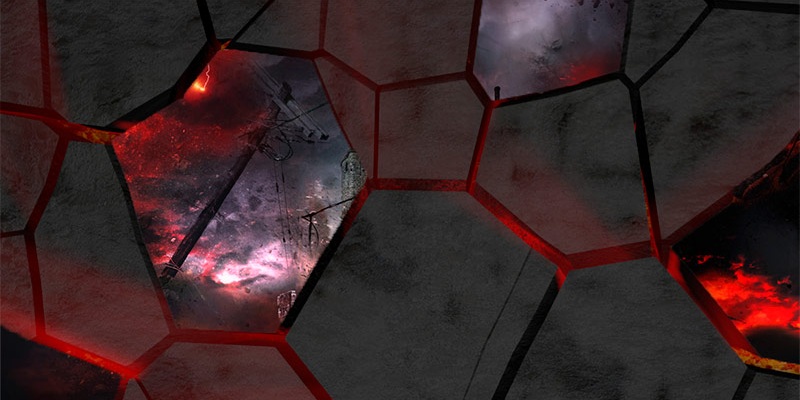
After a weekend of excitement and prayers for p*tience to last us until the release of This Kingdom Will Not Kill Me, it’s time to return to our Iron Dogs.
Since House Andrews gifted us with chapters from the first draft of Hugh 2, I thought we should test our memory of where it all began! And if it should happen to prompt us into rereads, we will gladly walk into the fray, like the fearless Devouring Horde that we are.
Disclaimer 1: The newsletter doesn’t like the quiz plugin and sends it out in code. If you read this in email form and want to take the test, click here to come directly to the website.
Disclaimer 2: Please remember, this is just for fun. The Preceptor doesn’t grant or revoke privileges based on your score. If you think a bad result will real-life upset you, please don’t take the quiz. We’ll see you later in the week with more fun and treats.
98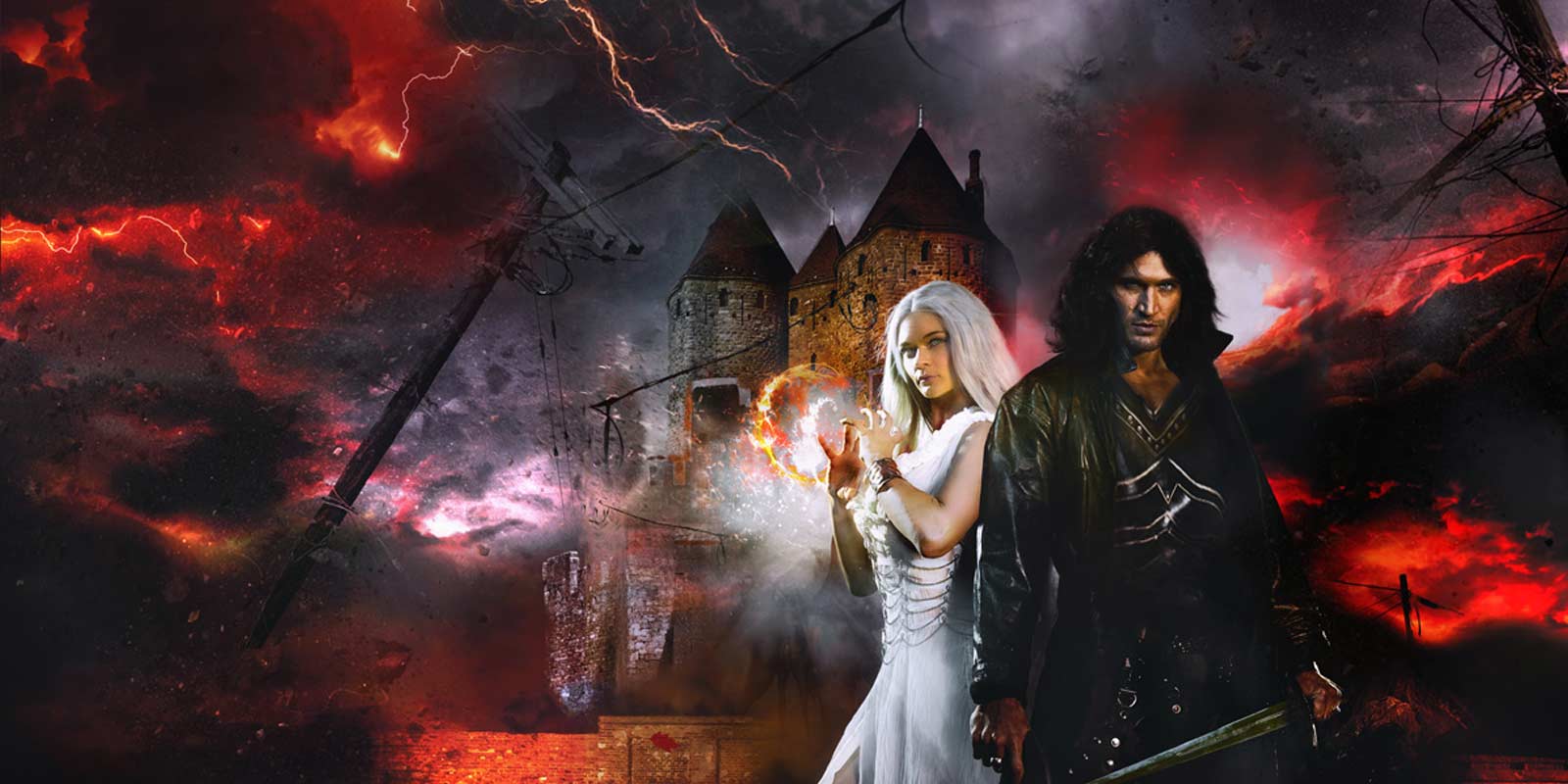
What Iron and which Magic?
Iron and Magic gave us battle, betrayal, redemption, and a marriage of convenience so hot it practically melted the page. But how well do we really remember Hugh’s journey from Roland’s warlord to Elara’s yearning husband and fortress co-owner? Sharpen your swords (and your wits) and see if you can conquer this quiz like Hugh conquers… well, everything.
1 / 11
How did Roland ensure Hugh recovered after Colchis?
 Fed him hippogriff bone broth for 3 months.
Surrounded him with rhododendrons (Hugh's favourite flower) for 3 months inside a dream of Shinar's water gardens
Put him inside a phoenix egg for 3 months.
Recited poetry to Hugh for 3 months. "Hugh d’Ambray is your designated nomenclature / A towering warlord, ruthless by nature...."
Fed him hippogriff bone broth for 3 months.
Surrounded him with rhododendrons (Hugh's favourite flower) for 3 months inside a dream of Shinar's water gardens
Put him inside a phoenix egg for 3 months.
Recited poetry to Hugh for 3 months. "Hugh d’Ambray is your designated nomenclature / A towering warlord, ruthless by nature...."
2 / 11
Who is part of Hugh's closest Iron Dogs entourage at the end of Iron and Magic?
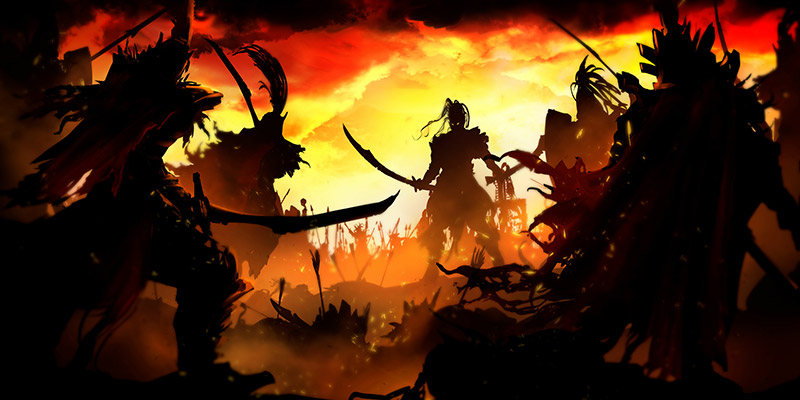 Stoyan, Felix, Lamar, Bale, Rene
Stoyan, Lamar, Bale, Sam
Stoyan, Lamar, Bale, Felix and Cedric
Stoyan, Lamar, Bradwick, Jimothy and Johnaford
Stoyan, Felix, Lamar, Bale, Rene
Stoyan, Lamar, Bale, Sam
Stoyan, Lamar, Bale, Felix and Cedric
Stoyan, Lamar, Bradwick, Jimothy and Johnaford
3 / 11
What is Bucky?
 A crossbreed of Percheron and Andalusian
A big, mean sonovabitch that nobody wants
Bucky is a unicorn, which makes Hugh a sparkly unicorn princess! This is my truth and I will not be denied it!
All of the above
A crossbreed of Percheron and Andalusian
A big, mean sonovabitch that nobody wants
Bucky is a unicorn, which makes Hugh a sparkly unicorn princess! This is my truth and I will not be denied it!
All of the above
4 / 11
What creatures attacked at Elara and Hugh's wedding?
 Mrogs and their handlers
Shifters
Tikbalangs
The humans from Asheville
Mrogs and their handlers
Shifters
Tikbalangs
The humans from Asheville
5 / 11
What did Elara say to Roland when she went to get Hugh back?
 TAKE YOUR STINKING PAWS OFF MY PRECEPTOR
HE IS MINE, WIZARD
ON WEDNESDAYS WE WEAR PINK, FETCH
YOU HAVE NO POWER HERE, NIMROD THE GREY
TAKE YOUR STINKING PAWS OFF MY PRECEPTOR
HE IS MINE, WIZARD
ON WEDNESDAYS WE WEAR PINK, FETCH
YOU HAVE NO POWER HERE, NIMROD THE GREY
6 / 11
What is the name of the Departed's castle?
 Château What If
Arundel
Baile
Harper's House of Horrors
Château What If
Arundel
Baile
Harper's House of Horrors
7 / 11
What do her people call Elara?
 The Ice Harpy
Shawty (with them apple bottom jeans, boots without fur, the whole club averted their eyes, for she was not dark but beautiful as the dawn, an obelisk that absorbs the cold of the stars and Harbinger of the Final Hour)
The Lady/ The White Lady
Preceptorix of the Metal Puppies
The Ice Harpy
Shawty (with them apple bottom jeans, boots without fur, the whole club averted their eyes, for she was not dark but beautiful as the dawn, an obelisk that absorbs the cold of the stars and Harbinger of the Final Hour)
The Lady/ The White Lady
Preceptorix of the Metal Puppies
8 / 11
What was Elara supposed to do in exchange for Hugh saving Aberdine?
 Eat a whole chicken
Be the hero, for once
Guard his pipes. It's what the cool kids are calling it these days, I guess...
Make crêpes Suzette
Eat a whole chicken
Be the hero, for once
Guard his pipes. It's what the cool kids are calling it these days, I guess...
Make crêpes Suzette
9 / 11
Who planned to poison the Departed's well with cholera?
 Raphael Medrano
Luther, our favourite mage against the machine
Senator Victor Skolnik
The Remaining
Raphael Medrano
Luther, our favourite mage against the machine
Senator Victor Skolnik
The Remaining
10 / 11
What was in the Iron Dogs' barrels?
 Garlic chip cookies made by Roland himself
A bacterial strain from the Alaskan permafrost
Holy water blessed by Transylvanian priests
A venom that was specifically developed against the Immortus Pathogen
Garlic chip cookies made by Roland himself
A bacterial strain from the Alaskan permafrost
Holy water blessed by Transylvanian priests
A venom that was specifically developed against the Immortus Pathogen
11 / 11
What is discovered about the mrogs in Iron and Magic?
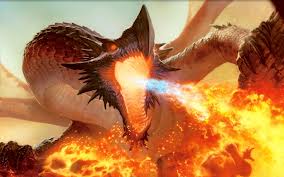 That their real name is the yeddimur
That they attack settlements at Neig's order
That they travel through time from the Holy Roman Empire II - Electric Boogaloo
That the mrogs and their handlers depend on their commanding officer
LinkedIn
Facebook
Twitter
VKontakte
div#ays-quiz-container-9 * { box-sizing: border-box; } /* Styles for Internet Explorer start */ #ays-quiz-container-9 #ays_finish_quiz_9 { } /* Styles for Quiz container */ #ays-quiz-container-9{ min-height: 350px; width:400px; background-color:#fff; background-position:center center;border-radius:0px 0px 0px 0px;box-shadow: 0px 0px 15px 1px rgba(0,0,0,0.4);border: none;} /* Styles for Navigation bar */ #ays-quiz-questions-nav-wrap-9 { width: 100%;border-radius:0px 0px 0px 0px;box-shadow: 0px 0px 15px 1px rgba(0,0,0,0.4);border: none;} #ays-quiz-questions-nav-wrap-9 .ays-quiz-questions-nav-content .ays-quiz-questions-nav-item a.ays_questions_nav_question { color: #000; border-color: #000; background-color: #fff; } #ays-quiz-questions-nav-wrap-9 .ays-quiz-questions-nav-content .ays-quiz-questions-nav-item.ays-quiz-questions-nav-item-active a.ays_questions_nav_question { box-shadow: inset 0 0 5px #000, 0 0 5px #000; } #ays-quiz-questions-nav-wrap-9 .ays-quiz-questions-nav-content .ays-quiz-questions-nav-item.ays-quiz-questions-nav-item-answered a.ays_questions_nav_question { color: #fff; border-color: #fff; background-color: #000; } #ays-quiz-questions-nav-wrap-9 .ays-quiz-questions-nav-content .ays-quiz-questions-nav-item a.ays_questions_nav_question.ays_quiz_correct_answer { color: rgba(39, 174, 96, 1); border-color: rgba(39, 174, 96, 1); background-color: rgba(39, 174, 96, 0.4); } #ays-quiz-questions-nav-wrap-9 .ays-quiz-questions-nav-content .ays-quiz-questions-nav-item a.ays_questions_nav_question.ays_quiz_wrong_answer { color: rgba(243, 134, 129, 1); border-color: rgba(243, 134, 129, 1); background-color: rgba(243, 134, 129, 0.4); } /* Styles for questions */ #ays-quiz-container-9 #ays_finish_quiz_9 div.step { min-height: 350px; } /* Styles for text inside quiz container */ #ays-quiz-container-9.ays-quiz-container .ays-questions-container .ays-start-page *:not(input), #ays-quiz-container-9.ays-quiz-container .ays-questions-container .ays_question_hint, #ays-quiz-container-9.ays-quiz-container .ays-questions-container label[for^="ays-answer-"], #ays-quiz-container-9.ays-quiz-container .ays-questions-container p, #ays-quiz-container-9.ays-quiz-container .ays-questions-container .ays-fs-title, #ays-quiz-container-9.ays-quiz-container .ays-questions-container .ays-fs-subtitle, #ays-quiz-container-9.ays-quiz-container .ays-questions-container .logged_in_message, #ays-quiz-container-9.ays-quiz-container .ays-questions-container .ays-quiz-limitation-count-of-takers, #ays-quiz-container-9.ays-quiz-container .ays-questions-container .ays-quiz-limitation-count-of-takers *, #ays-quiz-container-9.ays-quiz-container .ays-questions-container .ays_score_message, #ays-quiz-container-9.ays-quiz-container .ays-questions-container .ays_message{ color: #000; outline: none; } /* Quiz title / transformation */ #ays-quiz-container-9 .ays-fs-title{ text-transform: uppercase; font-size: 21px; text-align: center; text-shadow: none; } #ays-quiz-container-9 .ays-quiz-password-message-box, #ays-quiz-container-9 .ays-quiz-question-note-message-box, #ays-quiz-container-9 .ays_quiz_question, #ays-quiz-container-9 .ays_quiz_question *:not([class^='enlighter']) { color: #000; } #ays-quiz-container-9 textarea, #ays-quiz-container-9 input::first-letter, #ays-quiz-container-9 select::first-letter, #ays-quiz-container-9 option::first-letter { color: initial !important; } #ays-quiz-container-9 p::first-letter:not(.ays_no_questions_message) { color: #000 !important; background-color: transparent !important; font-size: inherit !important; font-weight: inherit !important; float: none !important; line-height: inherit !important; margin: 0 !important; padding: 0 !important; } #ays-quiz-container-9 .select2-container, #ays-quiz-container-9 .ays-field * { font-size: 15px !important; } #ays-quiz-container-9 .ays-fs-subtitle p { text-align: center ; } #ays-quiz-container-9 .ays_quiz_question p { font-size: 16px; text-align: center; } #ays-quiz-container-9 .ays_quiz_question { text-align: center ; margin-bottom: 10px; } #ays-quiz-container-9 .ays_quiz_question pre { max-width: 100%; white-space: break-spaces; } div#ays-quiz-container-9 .ays-questions-container .ays-field, div#ays-quiz-container-9 .ays-questions-container .ays-field input~label[for^='ays-answer-'], div#ays-quiz-container-9 .ays-questions-container .ays-modern-dark-question *, div#ays-quiz-container-9 .ays-questions-container .ays_quiz_question, div#ays-quiz-container-9 .ays-questions-container .ays_quiz_question *{ word-break: break-word; } #ays-quiz-container-9 .ays-quiz-timer p { font-size: 16px; } #ays-quiz-container-9 section.ays_quiz_redirection_timer_container hr, #ays-quiz-container-9 section.ays_quiz_timer_container hr { margin: 0; } #ays-quiz-container-9 section.ays_quiz_timer_container.ays_quiz_timer_red_warning .ays-quiz-timer { color: red; } #ays-quiz-container-9 .ays_thank_you_fs p { text-align: center; } #ays-quiz-container-9 .information_form input[type='text'], #ays-quiz-container-9 .information_form input[type='url'], #ays-quiz-container-9 .information_form input[type='number'], #ays-quiz-container-9 .information_form input[type='email'], #ays-quiz-container-9 .information_form input[type='tel'], #ays-quiz-container-9 .information_form textarea, #ays-quiz-container-9 .information_form select, #ays-quiz-container-9 .information_form option { color: initial !important; outline: none; margin-left: 0; background-image: unset; } #ays-quiz-container-9 .information_form input[type='checkbox'] { margin: 0 10px; outline: initial; -webkit-appearance: auto; -moz-appearance: auto; position: initial; width: initial; height: initial; border: initial; background: initial; } #ays-quiz-container-9 .information_form input[type='checkbox']::after { content: none; } #ays-quiz-container-9 .wrong_answer_text{ color:#ff4d4d; } #ays-quiz-container-9 .right_answer_text{ color:#33cc33; } #ays-quiz-container-9 .right_answer_text p { font-size:16px; } #ays-quiz-container-9 .wrong_answer_text p { font-size:16px; } #ays-quiz-container-9 .ays_questtion_explanation p { font-size:16px; } #ays-quiz-container-9 .ays_cb_and_a, #ays-quiz-container-9 .ays_cb_and_a * { color: rgb(0,0,0); text-align: center; } #ays-quiz-container-9 iframe { /*min-height: 350px;*/ } #ays-quiz-container-9 label.ays_for_checkbox, #ays-quiz-container-9 span.ays_checkbox_for_span { color: initial !important; display: block; } /* Quiz textarea height */ #ays-quiz-container-9 textarea { height: 100px; min-height: 100px; } /* Quiz rate and passed users count */ #ays-quiz-container-9 .ays_quizn_ancnoxneri_qanak, #ays-quiz-container-9 .ays_quiz_rete_avg{ color:#fff; background-color:#000; } #ays-quiz-container-9 .ays-questions-container > .ays_quizn_ancnoxneri_qanak { padding: 5px 20px; } #ays-quiz-container-9 div.for_quiz_rate.ui.star.rating .icon { color: rgba(0,0,0,0.35); } #ays-quiz-container-9 .ays_quiz_rete_avg div.for_quiz_rate_avg.ui.star.rating .icon { color: rgba(255,255,255,0.5); } #ays-quiz-container-9 .ays_quiz_rete .ays-quiz-rate-link-box .ays-quiz-rate-link { color: #000; } /* Loaders */ #ays-quiz-container-9 div.lds-spinner, #ays-quiz-container-9 div.lds-spinner2 { color: #000; } #ays-quiz-container-9 div.lds-spinner div:after, #ays-quiz-container-9 div.lds-spinner2 div:after { background-color: #000; } #ays-quiz-container-9 .lds-circle, #ays-quiz-container-9 .lds-facebook div, #ays-quiz-container-9 .lds-ellipsis div{ background: #000; } #ays-quiz-container-9 .lds-ripple div{ border-color: #000; } #ays-quiz-container-9 .lds-dual-ring::after, #ays-quiz-container-9 .lds-hourglass::after{ border-color: #000 transparent #000 transparent; } /* Stars */ #ays-quiz-container-9 .ui.rating .icon, #ays-quiz-container-9 .ui.rating .icon:before { font-family: Rating !important; } /* Progress bars */ #ays-quiz-container-9 #ays_finish_quiz_9 .ays-progress { border-color: rgba(0,0,0,0.8); } #ays-quiz-container-9 #ays_finish_quiz_9 .ays-progress-bg { background-color: rgba(0,0,0,0.3); } #ays-quiz-container-9 .ays-progress-value { color: #000; text-align: center; } #ays-quiz-container-9 .ays-progress-bar { background-color: #27AE60; } #ays-quiz-container-9 .ays-question-counter .ays-live-bar-wrap { direction:ltr !important; } #ays-quiz-container-9 .ays-live-bar-fill{ color: #000; border-bottom: 2px solid rgba(0,0,0,0.8); text-shadow: 0px 0px 5px #fff; } #ays-quiz-container-9 .ays-live-bar-fill.ays-live-fourth, #ays-quiz-container-9 .ays-live-bar-fill.ays-live-third, #ays-quiz-container-9 .ays-live-bar-fill.ays-live-second { text-shadow: unset; } #ays-quiz-container-9 .ays-live-bar-percent{ display:none; } /* Music, Sound */ #ays-quiz-container-9 .ays_music_sound { color:rgb(0,0,0); } /* Dropdown questions scroll bar */ #ays-quiz-container-9 blockquote { border-left-color: #000 !important; } /* Quiz Password */ #ays-quiz-container-9 .ays-start-page > input[id^='ays_quiz_password_val_'], #ays-quiz-container-9 .ays-quiz-password-toggle-visibility-box { width: 100%; margin: 0 auto; } /* Question hint */ #ays-quiz-container-9 .ays_question_hint_container .ays_question_hint_text { background-color:#fff; box-shadow: 0 0 15px 3px rgba(0,0,0,0.6); max-width: 270px; } #ays-quiz-container-9 .ays_question_hint_container .ays_question_hint_text p { max-width: unset; } #ays-quiz-container-9 .ays_questions_hint_max_width_class { max-width: 80%; } /* Information form */ #ays-quiz-container-9 .ays-form-title{ color:rgb(0,0,0); } /* Quiz timer */ #ays-quiz-container-9 div.ays-quiz-redirection-timer, #ays-quiz-container-9 div.ays-quiz-timer{ color: #000; text-align: center; } #ays-quiz-container-9 div.ays-quiz-timer.ays-quiz-message-before-timer:before { font-weight: 500; } /* Quiz buttons */ #ays-quiz-container-9 input#ays-submit, #ays-quiz-container-9 #ays_finish_quiz_9 .action-button, div#ays-quiz-container-9 #ays_finish_quiz_9 .action-button.ays_restart_button { background-color: #27AE60; color:#333; font-size: 17px; padding: 10px 20px; border-radius: 3px; white-space: nowrap; letter-spacing: 0; box-shadow: unset; white-space: normal; word-break: break-word; } #ays-quiz-container-9 input#ays-submit, #ays-quiz-container-9 #ays_finish_quiz_9 input.action-button { } #ays-quiz-container-9 #ays_finish_quiz_9 a[class~=ajax_add_to_cart]{ background-color: #fff; color:#333; padding: 10px 5px; font-size: 14px; border-radius: 3px; white-space: nowrap; border: 1px solid #333; } #ays-quiz-container-9 #ays_finish_quiz_9 .action-button.ays_check_answer { padding: 5px 10px; font-size: 17px !important; } #ays-quiz-container-9 #ays_finish_quiz_9 .action-button.ays_download_certificate { white-space: nowrap; padding: 5px 10px; } #ays-quiz-container-9 #ays_finish_quiz_9 .action-button.ays_arrow { color:#333!important; white-space: nowrap; padding: 5px 10px; } #ays-quiz-container-9 input#ays-submit:hover, #ays-quiz-container-9 input#ays-submit:focus, #ays-quiz-container-9 #ays_finish_quiz_9 .action-button:hover, #ays-quiz-container-9 #ays_finish_quiz_9 .action-button:focus { box-shadow: 0 0 0 2px #333; background-color: #27AE60; } #ays-quiz-container-9 .ays_restart_button { color: #333; } #ays-quiz-container-9 .ays_restart_button_p { display: flex; justify-content: center; flex-wrap: wrap; } #ays-quiz-container-9 .ays_buttons_div { justify-content: center; } #ays-quiz-container-9 .step:first-of-type .ays_buttons_div { justify-content: center !important; } #ays-quiz-container-9 input[type='button'], #ays-quiz-container-9 input[type='submit'] { color: #333 !important; outline: none; } #ays-quiz-container-9 #ays_finish_quiz_9 i.ays_early_finish.action-button[disabled]:hover, #ays-quiz-container-9 #ays_finish_quiz_9 i.ays_early_finish.action-button[disabled]:focus, #ays-quiz-container-9 #ays_finish_quiz_9 i.ays_early_finish.action-button[disabled], #ays-quiz-container-9 #ays_finish_quiz_9 i.ays_arrow.action-button[disabled]:hover, #ays-quiz-container-9 #ays_finish_quiz_9 i.ays_arrow.action-button[disabled]:focus, #ays-quiz-container-9 #ays_finish_quiz_9 i.ays_arrow.action-button[disabled] { color: #aaa !important; } #ays-quiz-container-9 .ays_finish.action-button{ margin: 10px 5px; } #ays-quiz-container-9 .ays-share-btn.ays-share-btn-branded { color: #fff; } /* Question answers */ #ays-quiz-container-9 .ays-field { border-color: #444; border-style: solid; border-width: 1px; box-shadow: none;flex-direction: row-reverse; } #ays-quiz-container-9 .ays-quiz-answers .ays-field:hover{ opacity: 1; } #ays-quiz-container-9 #ays_finish_quiz_9 .ays-field label.ays_answer_caption[for^='ays-answer-'] { z-index: 1; position:initial;bottom:0;} #ays-quiz-container-9 #ays_finish_quiz_9 .ays-field input~label[for^='ays-answer-'] { padding: 5px; } #ays-quiz-container-9 #ays_finish_quiz_9 .ays-field { margin-bottom: 10px; } #ays-quiz-container-9 #ays_finish_quiz_9 .ays-field.ays_grid_view_item { width: calc(50% - 5px); } #ays-quiz-container-9 #ays_finish_quiz_9 .ays-field.ays_grid_view_item:nth-child(odd) { margin-right: 5px; } #ays-quiz-container-9 #ays_finish_quiz_9 .ays-field input:checked+label:before { border-color: #27AE60; background: #27AE60; background-clip: content-box; } #ays-quiz-container-9 .ays-quiz-answers div.ays-text-right-answer { color: #000; } /* Answer maximum length of a text field */ #ays-quiz-container-9 .ays_quiz_question_text_message{ color: #000; text-align: left; font-size: 12px; } div#ays-quiz-container-9 div.ays_quiz_question_text_error_message { color: #ff0000; } /* Questions answer image */ #ays-quiz-container-9 .ays-answer-image { width:15em; height:150px; object-fit: cover; } /* Questions answer right/wrong icons */ #ays-quiz-container-9 .ays-field input~label.answered.correct:after{ content: url('http://ilona-andrews.com/wp-content/plugins/quiz-maker/public/images/correct.png'); } #ays-quiz-container-9 .ays-field input~label.answered.wrong:after{ content: url('http://ilona-andrews.com/wp-content/plugins/quiz-maker/public/images/wrong.png'); } #ays-quiz-container-9 .ays-field label.answered:last-of-type:after{ height: auto; left: 10px;top: 10px;} /* Dropdown questions */ #ays-quiz-container-9 .select2-container--default .select2-search--dropdown .select2-search__field:focus, #ays-quiz-container-9 .select2-container--default .select2-search--dropdown .select2-search__field { outline: unset; padding: 0.75rem; } #ays-quiz-container-9 #ays_finish_quiz_9 .ays-field .select2-container--default .select2-selection--single { border-bottom: 2px solid #27AE60; background-color: #27AE60; } #ays-quiz-container-9 .ays-field .select2-container--default .select2-selection--single .select2-selection__rendered, #ays-quiz-container-9 .ays-field .select2-container--default .select2-selection--single .select2-selection__placeholder, #ays-quiz-container-9 .ays-field .select2-container--default .select2-selection--single .select2-selection__arrow { color: #d8519f; } #ays-quiz-container-9 .ays-field .select2-container--default .select2-selection--single .select2-selection__rendered, #ays-quiz-container-9 .select2-container--default .select2-results__option--highlighted[aria-selected] { background-color: #27AE60; } #ays-quiz-container-9 .ays-field .select2-container--default, #ays-quiz-container-9 .ays-field .select2-container--default .selection, #ays-quiz-container-9 .ays-field .select2-container--default .dropdown-wrapper, #ays-quiz-container-9 .ays-field .select2-container--default .select2-selection--single .select2-selection__rendered, #ays-quiz-container-9 .ays-field .select2-container--default .select2-selection--single .select2-selection__rendered .select2-selection__placeholder, #ays-quiz-container-9 .ays-field .select2-container--default .select2-selection--single .select2-selection__arrow, #ays-quiz-container-9 .ays-field .select2-container--default .select2-selection--single .select2-selection__arrow b[role='presentation'] { font-size: 16px !important; } #ays-quiz-container-9 .select2-container--default .select2-results__option { padding: 6px; } /* Dropdown questions scroll bar */ #ays-quiz-container-9 .select2-results__options::-webkit-scrollbar { width: 7px; } #ays-quiz-container-9 .select2-results__options::-webkit-scrollbar-track { background-color: rgba(255,255,255,0.35); } #ays-quiz-container-9 .select2-results__options::-webkit-scrollbar-thumb { transition: .3s ease-in-out; background-color: rgba(255,255,255,0.55); } #ays-quiz-container-9 .select2-results__options::-webkit-scrollbar-thumb:hover { transition: .3s ease-in-out; background-color: rgba(255,255,255,0.85); } /* WooCommerce product */ #ays-quiz-container-9 .ays-woo-block { background-color: rgba(39,174,96,0.8); } #ays-quiz-container-9 .ays-woo-product-block h4.ays-woo-product-title > a { color: #000; } /* Audio / Video */ #ays-quiz-container-9 .mejs-container .mejs-time{ box-sizing: unset; } #ays-quiz-container-9 .mejs-container .mejs-time-rail { padding-top: 15px; } #ays-quiz-container-9 .mejs-container .mejs-mediaelement video { margin: 0; } /* Limitation */ #ays-quiz-container-9 .ays-quiz-limitation-count-of-takers { padding: 50px; } #ays-quiz-container-9 div.ays-quiz-results-toggle-block span.ays-show-res-toggle.ays-res-toggle-show, #ays-quiz-container-9 div.ays-quiz-results-toggle-block span.ays-show-res-toggle.ays-res-toggle-hide{ color: #000; } #ays-quiz-container-9 div.ays-quiz-results-toggle-block input:checked + label.ays_switch_toggle { border: 1px solid #000; } #ays-quiz-container-9 div.ays-quiz-results-toggle-block input:checked + label.ays_switch_toggle { border: 1px solid #000; } #ays-quiz-container-9 div.ays-quiz-results-toggle-block input:checked + label.ays_switch_toggle:after{ background: #000; } #ays-quiz-container-9.ays_quiz_elegant_dark div.ays-quiz-results-toggle-block input:checked + label.ays_switch_toggle:after, #ays-quiz-container-9.ays_quiz_rect_dark div.ays-quiz-results-toggle-block input:checked + label.ays_switch_toggle:after{ background: #000; } /* Hestia theme (Version: 3.0.16) | Start */ #ays-quiz-container-9 .mejs-container .mejs-inner .mejs-controls .mejs-button > button:hover, #ays-quiz-container-9 .mejs-container .mejs-inner .mejs-controls .mejs-button > button { box-shadow: unset; background-color: transparent; } #ays-quiz-container-9 .mejs-container .mejs-inner .mejs-controls .mejs-button > button { margin: 10px 6px; } /* Hestia theme (Version: 3.0.16) | End */ /* Go theme (Version: 1.4.3) | Start */ #ays-quiz-container-9 label[for^='ays-answer']:before, #ays-quiz-container-9 label[for^='ays-answer']:before { -webkit-mask-image: unset; mask-image: unset; } #ays-quiz-container-9.ays_quiz_classic_light .ays-field input:checked+label.answered:before, #ays-quiz-container-9.ays_quiz_classic_dark .ays-field input:checked+label.answered:before { background-color: #27AE60 !important; } #ays-quiz-container-9.ays_quiz_classic_light .ays-field input:checked+label.answered.correct:before, #ays-quiz-container-9.ays_quiz_classic_dark .ays-field input:checked+label.answered.correct:before { background-color: #27ae60 !important; } #ays-quiz-container-9.ays_quiz_classic_light .ays-field input:checked+label.answered.wrong:before, #ays-quiz-container-9.ays_quiz_classic_dark .ays-field input:checked+label.answered.wrong:before { background-color: #cc3700 !important; } /* Go theme (Version: 1.4.3) | End */ #ays-quiz-container-9 .ays_quiz_results fieldset.ays_fieldset .ays_quiz_question .wp-video { width: 100% !important; max-width: 100%; } /* Classic Dark / Classic Light */ /* Dropdown questions right/wrong styles */ #ays-quiz-container-9.ays_quiz_classic_dark .correct_div, #ays-quiz-container-9.ays_quiz_classic_light .correct_div{ border-color: green !important; opacity: 1 !important; background-color: rgba(39,174,96,0.4) !important; } #ays-quiz-container-9.ays_quiz_classic_dark .correct_div .selected-field, #ays-quiz-container-9.ays_quiz_classic_light .correct_div .selected-field { padding: 0px 10px 0px 10px; color: green !important; } #ays-quiz-container-9.ays_quiz_classic_dark .wrong_div, #ays-quiz-container-9.ays_quiz_classic_light .wrong_div{ border-color: red !important; opacity: 1 !important; background-color: rgba(243,134,129,0.4) !important; } #ays-quiz-container-9.ays_quiz_classic_dark .ays-field.checked_answer_div.wrong_div input:checked~label, #ays-quiz-container-9.ays_quiz_classic_light .ays-field.checked_answer_div.wrong_div input:checked~label { background-color: rgba(243,134,129,0.4) !important; } #ays-quiz-container-9 .ays_question_result .ays-field .ays_quiz_hide_correct_answer:after{ content: '' !important; } #ays-quiz-container-9 .ays-quiz-close-full-screen { fill: #000; } #ays-quiz-container-9 .ays-quiz-open-full-screen { fill: #000; } @media screen and (max-width: 768px){ #ays-quiz-container-9{ max-width: 100%; } div#ays-quiz-container-9.ays_quiz_modern_light .step, div#ays-quiz-container-9.ays_quiz_modern_dark .step { padding-right: 0px !important; padding-top: 0px !important; } div#ays-quiz-container-9.ays_quiz_modern_light div.step[data-question-id], div#ays-quiz-container-9.ays_quiz_modern_dark div.step[data-question-id] { background-size: cover !important; background-position: center center !important; } div#ays-quiz-container-9.ays_quiz_modern_light .ays-abs-fs:not(.ays-start-page):not(.ays-end-page), div#ays-quiz-container-9.ays_quiz_modern_dark .ays-abs-fs:not(.ays-start-page):not(.ays-end-page) { width: 100%; } #ays-quiz-container-9 .ays_quiz_question p { font-size: 16px; } #ays-quiz-container-9 .select2-container, #ays-quiz-container-9 .ays-field * { font-size: 15px !important; } div#ays-quiz-container-9 input#ays-submit, div#ays-quiz-container-9 #ays_finish_quiz_9 .action-button, div#ays-quiz-container-9 #ays_finish_quiz_9 .action-button.ays_restart_button { font-size: 17px; } div#ays-quiz-container-9 div.ays-questions-container div.ays-woo-block { width: 100%; } /* Quiz title / mobile font size */ div#ays-quiz-container-9 .ays-fs-title { font-size: 21px; } } /* Custom css styles */ /* RTL direction styles */
#ays-quiz-container-9 p {
margin: 0.625em;
}
#ays-quiz-container-9 .ays-field.checked_answer_div input:checked~label {
background-color: rgba(39,174,96,0.6);
}
#ays-quiz-container-9.ays_quiz_classic_light .enable_correction .ays-field.checked_answer_div input:checked+label,
#ays-quiz-container-9.ays_quiz_classic_dark .enable_correction .ays-field.checked_answer_div input:checked+label {
background-color: transparent;
}
#ays-quiz-container-9.ays-quiz-container.ays_quiz_classic_light .ays-questions-container .ays-field:hover label[for^='ays-answer-'],
#ays-quiz-container-9 .ays-field:hover{
background: rgba(39,174,96,0.8);
color: #fff;
transition: all .3s;
}
#ays-quiz-container-9 #ays_finish_quiz_9 .action-button:hover,
#ays-quiz-container-9 #ays_finish_quiz_9 .action-button:focus {
box-shadow: 0 0 0 2px rgba(255, 255, 255, 0.5), 0 0 0 3px #333;
background: #27AE60;
}
if(typeof aysQuizOptions === 'undefined'){
var aysQuizOptions = [];
}
aysQuizOptions['9'] = 'eyJxdWl6X3ZlcnNpb24iOiI4LjcuNCIsImNvcmVfdmVyc2lvbiI6IjYuNy4yIiwicGhwX3ZlcnNpb24iOiI4LjIuMjciLCJjb2xvciI6IiMyN0FFNjAiLCJiZ19jb2xvciI6IiNmZmYiLCJ0ZXh0X2NvbG9yIjoiIzAwMCIsImhlaWdodCI6MzUwLCJ3aWR0aCI6NDAwLCJlbmFibGVfbG9nZ2VkX3VzZXJzIjoib2ZmIiwiaW5mb3JtYXRpb25fZm9ybSI6ImRpc2FibGUiLCJmb3JtX25hbWUiOiJvZmYiLCJmb3JtX2VtYWlsIjoib2ZmIiwiZm9ybV9waG9uZSI6Im9mZiIsImltYWdlX3dpZHRoIjoiIiwiaW1hZ2VfaGVpZ2h0IjoiIiwiZW5hYmxlX2NvcnJlY3Rpb24iOiJvZmYiLCJlbmFibGVfcHJvZ3Jlc3NfYmFyIjoib2ZmIiwiZW5hYmxlX3F1ZXN0aW9uc19yZXN1bHQiOiJvZmYiLCJyYW5kb21pemVfcXVlc3Rpb25zIjoib24iLCJyYW5kb21pemVfYW5zd2VycyI6Im9mZiIsImVuYWJsZV9xdWVzdGlvbnNfY291bnRlciI6Im9uIiwiZW5hYmxlX3Jlc3RyaWN0aW9uX3Bhc3MiOiJvZmYiLCJlbmFibGVfcmVzdHJpY3Rpb25fcGFzc191c2VycyI6Im9mZiIsInJlc3RyaWN0aW9uX3Bhc3NfbWVzc2FnZSI6IiIsInJlc3RyaWN0aW9uX3Bhc3NfdXNlcnNfbWVzc2FnZSI6IiIsInVzZXJfcm9sZSI6W10sImF5c191c2Vyc19zZWFyY2giOltdLCJjdXN0b21fY3NzIjoiIiwibGltaXRfdXNlcnMiOiJvZmYiLCJsaW1pdGF0aW9uX21lc3NhZ2UiOiIiLCJyZWRpcmVjdF91cmwiOiIiLCJyZWRpcmVjdGlvbl9kZWxheSI6MCwiYW5zd2Vyc192aWV3IjoibGlzdCIsImVuYWJsZV9ydGxfZGlyZWN0aW9uIjoib2ZmIiwiZW5hYmxlX2xvZ2dlZF91c2Vyc19tZXNzYWdlIjoiIiwicXVlc3Rpb25zX2NvdW50IjoiIiwiZW5hYmxlX3F1ZXN0aW9uX2JhbmsiOiJvZmYiLCJlbmFibGVfbGl2ZV9wcm9ncmVzc19iYXIiOiJvZmYiLCJlbmFibGVfcGVyY2VudF92aWV3Ijoib2ZmIiwiZW5hYmxlX2F2ZXJhZ2Vfc3RhdGlzdGljYWwiOiJvZmYiLCJlbmFibGVfbmV4dF9idXR0b24iOiJvZmYiLCJlbmFibGVfcHJldmlvdXNfYnV0dG9uIjoib2ZmIiwiZW5hYmxlX2Fycm93cyI6Im9mZiIsInRpbWVyX3RleHQiOiIiLCJxdWl6X3RoZW1lIjoiY2xhc3NpY19saWdodCIsImVuYWJsZV9zb2NpYWxfYnV0dG9ucyI6Im9uIiwiZmluYWxfcmVzdWx0X3RleHQiOiIiLCJlbmFibGVfcGFzc19jb3VudCI6Im9uIiwiaGlkZV9zY29yZSI6Im9uIiwicmF0ZV9mb3JtX3RpdGxlIjoiIiwiYm94X3NoYWRvd19jb2xvciI6IiMwMDAiLCJxdWl6X2JvcmRlcl9yYWRpdXMiOiIwIiwicXVpel9iZ19pbWFnZSI6IiIsInF1aXpfYm9yZGVyX3dpZHRoIjoiMSIsInF1aXpfYm9yZGVyX3N0eWxlIjoic29saWQiLCJxdWl6X2JvcmRlcl9jb2xvciI6IiMwMDAiLCJxdWl6X2xvYWRlciI6ImRlZmF1bHQiLCJxdWVzdF9hbmltYXRpb24iOiJzaGFrZSIsImVuYWJsZV9iZ19tdXNpYyI6Im9mZiIsInF1aXpfYmdfbXVzaWMiOiIiLCJhbnN3ZXJzX2ZvbnRfc2l6ZSI6MTUsInNob3dfY3JlYXRlX2RhdGUiOiJvZmYiLCJzaG93X2F1dGhvciI6Im9mZiIsImVuYWJsZV9lYXJseV9maW5pc2giOiJvZmYiLCJhbnN3ZXJzX3J3X3RleHRzIjoiZGlzYWJsZSIsImRpc2FibGVfc3RvcmVfZGF0YSI6Im9mZiIsImVuYWJsZV9iYWNrZ3JvdW5kX2dyYWRpZW50Ijoib2ZmIiwiYmFja2dyb3VuZF9ncmFkaWVudF9jb2xvcl8xIjoiIzAwMCIsImJhY2tncm91bmRfZ3JhZGllbnRfY29sb3JfMiI6IiNmZmYiLCJxdWl6X2dyYWRpZW50X2RpcmVjdGlvbiI6InZlcnRpY2FsIiwicmVkaXJlY3RfYWZ0ZXJfc3VibWl0Ijoib2ZmIiwic3VibWl0X3JlZGlyZWN0X3VybCI6IiIsInN1Ym1pdF9yZWRpcmVjdF9kZWxheSI6IjAiLCJwcm9ncmVzc19iYXJfc3R5bGUiOiJmaXJzdCIsImVuYWJsZV9leGl0X2J1dHRvbiI6Im9mZiIsImV4aXRfcmVkaXJlY3RfdXJsIjoiIiwiaW1hZ2Vfc2l6aW5nIjoiY292ZXIiLCJxdWl6X2JnX2ltYWdlX3Bvc2l0aW9uIjoiY2VudGVyIGNlbnRlciIsImN1c3RvbV9jbGFzcyI6IiIsImVuYWJsZV9zb2NpYWxfbGlua3MiOiJvZmYiLCJzb2NpYWxfbGlua3MiOnsibGlua2VkaW5fbGluayI6IiIsImZhY2Vib29rX2xpbmsiOiIiLCJ0d2l0dGVyX2xpbmsiOiIiLCJ2a29udGFrdGVfbGluayI6IiIsImluc3RhZ3JhbV9saW5rIjoiIiwieW91dHViZV9saW5rIjoiIn0sInNob3dfcXVpel90aXRsZSI6Im9uIiwic2hvd19xdWl6X2Rlc2MiOiJvbiIsInNob3dfbG9naW5fZm9ybSI6Im9mZiIsIm1vYmlsZV9tYXhfd2lkdGgiOiIiLCJsaW1pdF91c2Vyc19ieSI6ImlwIiwiZXhwbGFuYXRpb25fdGltZSI6IjQiLCJlbmFibGVfY2xlYXJfYW5zd2VyIjoib2ZmIiwic2hvd19jYXRlZ29yeSI6Im9mZiIsInNob3dfcXVlc3Rpb25fY2F0ZWdvcnkiOiJvZmYiLCJhbnN3ZXJzX3BhZGRpbmciOiI1IiwiYW5zd2Vyc19ib3JkZXIiOiJvbiIsImFuc3dlcnNfYm9yZGVyX3dpZHRoIjoiMSIsImFuc3dlcnNfYm9yZGVyX3N0eWxlIjoic29saWQiLCJhbnN3ZXJzX2JvcmRlcl9jb2xvciI6IiM0NDQiLCJhbnNfaW1nX2hlaWdodCI6IjE1MCIsImFuc19pbWdfY2FwdGlvbl9zdHlsZSI6Im91dHNpZGUiLCJhbnNfaW1nX2NhcHRpb25fcG9zaXRpb24iOiJib3R0b20iLCJhbnN3ZXJzX2JveF9zaGFkb3ciOiJvZmYiLCJhbnN3ZXJzX2JveF9zaGFkb3dfY29sb3IiOiIjMDAwIiwic2hvd19hbnN3ZXJzX2NhcHRpb24iOiJvbiIsImFuc3dlcnNfbWFyZ2luIjoxMCwiYW5zX3JpZ2h0X3dyb25nX2ljb24iOiJkZWZhdWx0IiwiZGlzcGxheV9zY29yZSI6ImJ5X3BlcmNlbnRhZ2UiLCJlbmFibGVfcndfYXNud2Vyc19zb3VuZHMiOiJvZmYiLCJxdWl6X2JnX2ltZ19pbl9maW5pc2hfcGFnZSI6Im9mZiIsImZpbmlzaF9hZnRlcl93cm9uZ19hbnN3ZXIiOiJvZmYiLCJhZnRlcl90aW1lcl90ZXh0IjoiIiwiZW5hYmxlX2VudGVyX2tleSI6Im9uIiwic2hvd19yYXRlX2FmdGVyX3JhdGUiOiJvbiIsImJ1dHRvbnNfdGV4dF9jb2xvciI6IiMzMzMiLCJidXR0b25zX3Bvc2l0aW9uIjoiY2VudGVyIiwiYnV0dG9uc19zaXplIjoibWVkaXVtIiwiYnV0dG9uc19mb250X3NpemUiOiIxNyIsImJ1dHRvbnNfd2lkdGgiOiIiLCJidXR0b25zX2xlZnRfcmlnaHRfcGFkZGluZyI6IjIwIiwiYnV0dG9uc190b3BfYm90dG9tX3BhZGRpbmciOiIxMCIsImJ1dHRvbnNfYm9yZGVyX3JhZGl1cyI6IjMiLCJlbmFibGVfYXVkaW9fYXV0b3BsYXkiOiJvZmYiLCJlbmFibGVfbGVhdmVfcGFnZSI6Im9uIiwic2hvd19vbmx5X3dyb25nX2Fuc3dlciI6Im9mZiIsInBhc3Nfc2NvcmUiOjAsInBhc3Nfc2NvcmVfbWVzc2FnZSI6IjxoNCBzdHlsZT1cInRleHQtYWxpZ246IGNlbnRlcjtcIj5Db25ncmF0dWxhdGlvbnMhPFwvaDQ+XHJcbjxwIHN0eWxlPVwidGV4dC1hbGlnbjogY2VudGVyO1wiPllvdSBwYXNzZWQgdGhlIHF1aXohPFwvcD4iLCJmYWlsX3Njb3JlX21lc3NhZ2UiOiI8aDQgc3R5bGU9XCJ0ZXh0LWFsaWduOiBjZW50ZXI7XCI+T29wcyE8XC9oND5cclxuPHAgc3R5bGU9XCJ0ZXh0LWFsaWduOiBjZW50ZXI7XCI+WW91IGhhdmUgbm90IHBhc3NlZCB0aGUgcXVpeiFcclxuVHJ5IGFnYWluITxcL3A+IiwiYW5zd2Vyc19vYmplY3RfZml0IjoiY292ZXIiLCJxdWl6X21heF9wYXNzX2NvdW50IjoxLCJxdWVzdGlvbl9mb250X3NpemUiOjE2LCJxdWl6X3dpZHRoX2J5X3BlcmNlbnRhZ2VfcHgiOiJwaXhlbHMiLCJxdWVzdGlvbnNfaGludF9pY29uX29yX3RleHQiOiJkZWZhdWx0IiwicXVlc3Rpb25zX2hpbnRfdmFsdWUiOiIiLCJlbmFibGVfZWFybHlfZmluc2hfY29tZmlybV9ib3giOiJvbiIsImhpZGVfY29ycmVjdF9hbnN3ZXJzIjoib2ZmIiwicXVpel9sb2FkZXJfdGV4dF92YWx1ZSI6IiIsInNob3dfaW5mb3JtYXRpb25fZm9ybSI6Im9uIiwic2hvd19xdWVzdGlvbnNfZXhwbGFuYXRpb24iOiJkaXNhYmxlIiwiZW5hYmxlX3F1ZXN0aW9uc19vcmRlcmluZ19ieV9jYXQiOiJvZmYiLCJlbmFibGVfc2VuZF9tYWlsX3RvX3VzZXJfYnlfcGFzc19zY29yZSI6Im9mZiIsImVuYWJsZV9zZW5kX21haWxfdG9fYWRtaW5fYnlfcGFzc19zY29yZSI6Im9mZiIsInNob3dfcXVlc3Rpb25zX251bWJlcmluZyI6Im5vbmUiLCJzaG93X2Fuc3dlcnNfbnVtYmVyaW5nIjoibm9uZSIsInF1aXpfbG9hZGVyX2N1c3RvbV9naWYiOiIiLCJkaXNhYmxlX2hvdmVyX2VmZmVjdCI6Im9mZiIsInF1aXpfbG9hZGVyX2N1c3RvbV9naWZfd2lkdGgiOjEwMCwicXVpel90aXRsZV90cmFuc2Zvcm1hdGlvbiI6InVwcGVyY2FzZSIsInF1aXpfaW1hZ2Vfd2lkdGhfYnlfcGVyY2VudGFnZV9weCI6InBpeGVscyIsInF1aXpfaW1hZ2VfaGVpZ2h0IjoiIiwicXVpel9iZ19pbWdfb25fc3RhcnRfcGFnZSI6Im9mZiIsInF1aXpfYm94X3NoYWRvd194X29mZnNldCI6MCwicXVpel9ib3hfc2hhZG93X3lfb2Zmc2V0IjowLCJxdWl6X2JveF9zaGFkb3dfel9vZmZzZXQiOjE1LCJxdWl6X3F1ZXN0aW9uX3RleHRfYWxpZ25tZW50IjoiY2VudGVyIiwicXVpel9hcnJvd190eXBlIjoiZGVmYXVsdCIsInF1aXpfc2hvd193cm9uZ19hbnN3ZXJzX2ZpcnN0Ijoib2ZmIiwicXVpel9kaXNwbGF5X2FsbF9xdWVzdGlvbnMiOiJvZmYiLCJxdWl6X3RpbWVyX3JlZF93YXJuaW5nIjoib2ZmIiwicXVpel9zY2hlZHVsZV90aW1lem9uZSI6IlVUQy02IiwicXVlc3Rpb25zX2hpbnRfYnV0dG9uX3ZhbHVlIjoiIiwicXVpel90YWNrZXJzX21lc3NhZ2UiOiJUaGlzIHF1aXogaXMgZXhwaXJlZCEiLCJxdWl6X2VuYWJsZV9saW5rZWRpbl9zaGFyZV9idXR0b24iOiJvbiIsInF1aXpfZW5hYmxlX2ZhY2Vib29rX3NoYXJlX2J1dHRvbiI6Im9uIiwicXVpel9lbmFibGVfdHdpdHRlcl9zaGFyZV9idXR0b24iOiJvbiIsInF1aXpfZW5hYmxlX3Zrb250YWt0ZV9zaGFyZV9idXR0b24iOiJvbiIsInF1aXpfbWFrZV9yZXNwb25zZXNfYW5vbnltb3VzIjoib2ZmIiwicXVpel9tYWtlX2FsbF9yZXZpZXdfbGluayI6Im9mZiIsInF1aXpfbWVzc2FnZV9iZWZvcmVfdGltZXIiOiIiLCJxdWl6X3Bhc3N3b3JkX21lc3NhZ2UiOiIiLCJlbmFibGVfc2VlX3Jlc3VsdF9jb25maXJtX2JveCI6Im9mZiIsImRpc3BsYXlfZmllbGRzX2xhYmVscyI6Im9mZiIsInF1aXpfZW5hYmxlX3Bhc3N3b3JkX3Zpc2liaWxpdHkiOiJvZmYiLCJxdWVzdGlvbl9tb2JpbGVfZm9udF9zaXplIjoxNiwiYW5zd2Vyc19tb2JpbGVfZm9udF9zaXplIjoxNSwic29jaWFsX2J1dHRvbnNfaGVhZGluZyI6IiIsInNvY2lhbF9saW5rc19oZWFkaW5nIjoiIiwicXVpel9lbmFibGVfcXVlc3Rpb25fY2F0ZWdvcnlfZGVzY3JpcHRpb24iOiJvZmYiLCJxdWl6X21lc3NhZ2VfYmVmb3JlX3JlZGlyZWN0X3RpbWVyIjoiIiwiYnV0dG9uc19tb2JpbGVfZm9udF9zaXplIjoxNywicXVpel9hbnN3ZXJfYm94X3NoYWRvd194X29mZnNldCI6MCwicXVpel9hbnN3ZXJfYm94X3NoYWRvd195X29mZnNldCI6MCwicXVpel9hbnN3ZXJfYm94X3NoYWRvd196X29mZnNldCI6MTAsInF1aXpfZW5hYmxlX3RpdGxlX3RleHRfc2hhZG93Ijoib2ZmIiwicXVpel90aXRsZV90ZXh0X3NoYWRvd19jb2xvciI6IiMzMzMiLCJyaWdodF9hbnN3ZXJzX2ZvbnRfc2l6ZSI6MTYsIndyb25nX2Fuc3dlcnNfZm9udF9zaXplIjoxNiwicXVlc3RfZXhwbGFuYXRpb25fZm9udF9zaXplIjoxNiwicXVpel93YWl0aW5nX3RpbWUiOiJvZmYiLCJxdWl6X3RpdGxlX3RleHRfc2hhZG93X3hfb2Zmc2V0IjoyLCJxdWl6X3RpdGxlX3RleHRfc2hhZG93X3lfb2Zmc2V0IjoyLCJxdWl6X3RpdGxlX3RleHRfc2hhZG93X3pfb2Zmc2V0IjoyLCJxdWl6X3Nob3dfb25seV93cm9uZ19hbnN3ZXJzIjoib2ZmIiwicXVpel90aXRsZV9mb250X3NpemUiOjIxLCJxdWl6X3RpdGxlX21vYmlsZV9mb250X3NpemUiOjIxLCJxdWl6X3Bhc3N3b3JkX3dpZHRoIjoiIiwicXVpel9yZXZpZXdfcGxhY2Vob2xkZXJfdGV4dCI6IiIsInF1aXpfbWFrZV9yZXZpZXdfcmVxdWlyZWQiOiJvZmYiLCJxdWl6X2VuYWJsZV9yZXN1bHRzX3RvZ2dsZSI6Im9mZiIsInF1ZXN0aW9uX2NvdW50X3Blcl9wYWdlIjpudWxsLCJxdWVzdGlvbl9jb3VudF9wZXJfcGFnZV9udW1iZXIiOiIiLCJtYWlsX21lc3NhZ2UiOiIiLCJlbmFibGVfY2VydGlmaWNhdGUiOiJvZmYiLCJlbmFibGVfY2VydGlmaWNhdGVfd2l0aG91dF9zZW5kIjoib2ZmIiwiY2VydGlmaWNhdGVfcGFzcyI6IjAiLCJmb3JtX3RpdGxlIjoiIiwiY2VydGlmaWNhdGVfdGl0bGUiOiI8c3BhbiBzdHlsZT1cImZvbnQtc2l6ZTogNTBweDsgZm9udC13ZWlnaHQ6IGJvbGQ7XCI+Q2VydGlmaWNhdGUgb2YgQ29tcGxldGlvbjxcL3NwYW4+IiwiY2VydGlmaWNhdGVfYm9keSI6IjxzcGFuIHN0eWxlPVwiZm9udC1zaXplOiAyNXB4O1wiPjxpPlRoaXMgaXMgdG8gY2VydGlmeSB0aGF0PFwvaT48XC9zcGFuPlxyXG5cclxuPHNwYW4gc3R5bGU9XCJmb250LXNpemU6IDMwcHg7XCI+PGI+JSV1c2VyX25hbWUlJTxcL2I+PFwvc3Bhbj5cclxuXHJcbjxzcGFuIHN0eWxlPVwiZm9udC1zaXplOiAyNXB4O1wiPjxpPmhhcyBjb21wbGV0ZWQgdGhlIHF1aXo8XC9pPjxcL3NwYW4+XHJcblxyXG48c3BhbiBzdHlsZT1cImZvbnQtc2l6ZTogMzBweDtcIj5cIiUlcXVpel9uYW1lJSVcIjxcL3NwYW4+XHJcblxyXG48c3BhbiBzdHlsZT1cImZvbnQtc2l6ZTogMjBweDtcIj53aXRoIGEgc2NvcmUgb2YgPGI+JSVzY29yZSUlPFwvYj48XC9zcGFuPlxyXG5cclxuPHNwYW4gc3R5bGU9XCJmb250LXNpemU6IDI1cHg7XCI+PGk+ZGF0ZWQ8XC9pPjxcL3NwYW4+XHJcbjxzcGFuIHN0eWxlPVwiZm9udC1zaXplOiAzMHB4O1wiPiUlY3VycmVudF9kYXRlJSU8XC9zcGFuPiIsIm1haWxjaGltcF9saXN0IjoiIiwiZW5hYmxlX21haWxjaGltcCI6Im9mZiIsImVuYWJsZV9kb3VibGVfb3B0X2luIjoib2ZmIiwiYWN0aXZlX2RhdGVfY2hlY2siOiJvZmYiLCJhY3RpdmVJbnRlcnZhbCI6IjIwMjUtMDMtMTAgMDg6NDk6MzMiLCJkZWFjdGl2ZUludGVydmFsIjoiMjAyNS0wMy0xMCAwODo0OTozMyIsImFjdGl2ZV9kYXRlX21lc3NhZ2UiOiJUaGUgcXVpeiBoYXMgZXhwaXJlZCEiLCJhY3RpdmVfZGF0ZV9wcmVfc3RhcnRfbWVzc2FnZSI6IlRoZSBxdWl6IHdpbGwgYmUgYXZhaWxhYmxlIHNvb24hIiwiY2hlY2tib3hfc2NvcmVfYnkiOiJvbiIsImNhbGN1bGF0ZV9zY29yZSI6ImJ5X2NvcnJlY3RuZXNzIiwic2VuZF9yZXN1bHRzX3VzZXIiOiJvZmYiLCJzZW5kX2ludGVydmFsX21zZyI6Im9mZiIsInF1ZXN0aW9uX2JhbmtfdHlwZSI6ImdlbmVyYWwiLCJxdWVzdGlvbnNfYmFua19jYXRfY291bnQiOnsiMSI6IiJ9LCJlbmFibGVfdGFja2Vyc19jb3VudCI6Im9mZiIsInRhY2tlcnNfY291bnQiOiIiLCJzZW5kX3Jlc3VsdHNfYWRtaW4iOiJvbiIsInNlbmRfaW50ZXJ2YWxfbXNnX3RvX2FkbWluIjoib2ZmIiwic2hvd19pbnRlcnZhbF9tZXNzYWdlIjoib24iLCJhbGxvd19jb2xsZWN0aW5nX2xvZ2dlZF9pbl91c2Vyc19kYXRhIjoib2ZmIiwicXVpel9wYXNzX3Njb3JlIjoiMCIsInNlbmRfY2VydGlmaWNhdGVfdG9fYWRtaW4iOiJvZmYiLCJjZXJ0aWZpY2F0ZV9pbWFnZSI6IiIsImNlcnRpZmljYXRlX2ZyYW1lIjoiZGVmYXVsdCIsImNlcnRpZmljYXRlX29yaWVudGF0aW9uIjoibCIsIm1ha2VfcXVlc3Rpb25zX3JlcXVpcmVkIjoib2ZmIiwiZW5hYmxlX3Bhc3N3b3JkIjoib2ZmIiwicGFzc3dvcmRfcXVpeiI6IiIsIm1haWxfbWVzc2FnZV9hZG1pbiI6IiIsInNlbmRfbWFpbF90b19zaXRlX2FkbWluIjoib24iLCJnZW5lcmF0ZV9wYXNzd29yZCI6ImdlbmVyYWwiLCJnZW5lcmF0ZWRfcGFzc3dvcmRzIjp7ImNyZWF0ZWRfcGFzc3dvcmRzIjpbXSwiYWN0aXZlX3Bhc3N3b3JkcyI6W10sInVzZWRfcGFzc3dvcmRzIjpbXX0sImRpc3BsYXlfc2NvcmVfYnkiOiJieV9wZXJjZW50YWdlIiwic2hvd19zY2hlZHVsZV90aW1lciI6Im9mZiIsInNob3dfdGltZXJfdHlwZSI6ImNvdW50ZG93biIsInByb2dyZXNzX2xpdmVfYmFyX3N0eWxlIjoiZGVmYXVsdCIsImVuYWJsZV9mdWxsX3NjcmVlbl9tb2RlIjoib2ZmIiwiZW5hYmxlX25hdmlnYXRpb25fYmFyIjoib2ZmIiwiaGlkZV9saW1pdF9hdHRlbXB0c19ub3RpY2UiOiJvZmYiLCJ0dXJuX29uX2V4dHJhX3NlY3VyaXR5X2NoZWNrIjoib24iLCJlbmFibGVfdG9wX2tleXdvcmRzIjoib2ZmIiwiYXNzaWduX2tleXdvcmRzIjpbeyJhc3NpZ25fdG9wX2tleXdvcmQiOiJBIiwiYXNzaWduX3RvcF9rZXl3b3JkX3RleHQiOiIifSx7ImFzc2lnbl90b3Bfa2V5d29yZCI6IkIiLCJhc3NpZ25fdG9wX2tleXdvcmRfdGV4dCI6IiJ9LHsiYXNzaWduX3RvcF9rZXl3b3JkIjoiQyIsImFzc2lnbl90b3Bfa2V5d29yZF90ZXh0IjoiIn0seyJhc3NpZ25fdG9wX2tleXdvcmQiOiJEIiwiYXNzaWduX3RvcF9rZXl3b3JkX3RleHQiOiIifV0sInF1aXpfZW5hYmxlX2NvdXBvbiI6Im9mZiIsInF1aXpfY291cG9uc19hcnJheSI6eyJxdWl6X2FjdGl2ZV9jb3Vwb25zIjpbXSwicXVpel9pbmFjdGl2ZV9jb3Vwb25zIjpbXX0sImFwcGx5X3BvaW50c190b19rZXl3b3JkcyI6Im9mZiIsImxpbWl0X2F0dGVtcHRzX2NvdW50X2J5X3VzZXJfcm9sZSI6IiIsImVuYWJsZV9hdXRvc3RhcnQiOiJvZmYiLCJwYXlwYWxfYW1vdW50IjpudWxsLCJwYXlwYWxfY3VycmVuY3kiOm51bGwsInBheXBhbF9tZXNzYWdlIjoiIiwiZW5hYmxlX3N0cmlwZSI6Im9mZiIsInN0cmlwZV9hbW91bnQiOiIiLCJzdHJpcGVfY3VycmVuY3kiOiIiLCJzdHJpcGVfbWVzc2FnZSI6IllvdSBuZWVkIHRvIHBheSB0byBwYXNzIHRoaXMgcXVpei4iLCJwYXltZW50X3R5cGUiOiJwcmVwYXkiLCJlbmFibGVfbW9uaXRvciI6Im9mZiIsIm1vbml0b3JfbGlzdCI6IiIsImFjdGl2ZV9jYW1wX2xpc3QiOiIiLCJlbmFibGVfc2xhY2siOiJvZmYiLCJzbGFja19jb252ZXJzYXRpb24iOiIiLCJhY3RpdmVfY2FtcF9hdXRvbWF0aW9uIjoiIiwiZW5hYmxlX2FjdGl2ZV9jYW1wIjoib2ZmIiwiZW5hYmxlX3phcGllciI6Im9mZiIsImVuYWJsZV9nb29nbGVfc2hlZXRzIjoib2ZmIiwic3ByZWFkc2hlZXRfaWQiOiIiLCJnb29nbGVfc2hlZXRfY3VzdG9tX2ZpZWxkcyI6W10sInF1aXpfYXR0cmlidXRlcyI6bnVsbCwicXVpel9hdHRyaWJ1dGVzX2FjdGl2ZV9vcmRlciI6bnVsbCwicXVpel9hdHRyaWJ1dGVzX3Bhc3NpdmVfb3JkZXIiOlsiYXlzX2Zvcm1fbmFtZSIsImF5c19mb3JtX2VtYWlsIiwiYXlzX2Zvcm1fcGhvbmUiXSwicmVxdWlyZWRfZmllbGRzIjpudWxsLCJlbmFibGVfdGltZXIiOiJvZmYiLCJ0aW1lciI6MTAwLCJlbmFibGVfcXVpel9yYXRlIjoib2ZmIiwiZW5hYmxlX3JhdGVfYXZnIjoib2ZmIiwiZW5hYmxlX2JveF9zaGFkb3ciOiJvbiIsImVuYWJsZV9ib3JkZXIiOiJvZmYiLCJxdWl6X3RpbWVyX2luX3RpdGxlIjoib2ZmIiwiZW5hYmxlX3JhdGVfY29tbWVudHMiOiJvZmYiLCJlbmFibGVfcmVzdGFydF9idXR0b24iOiJvZmYiLCJhdXRvZmlsbF91c2VyX2RhdGEiOiJvZmYiLCJlbmFibGVfY29weV9wcm90ZWN0aW9uIjoib2ZmIiwiZW5hYmxlX3BheXBhbCI6Im9mZiIsImF5c19lbmFibGVfcmVzdHJpY3Rpb25fcGFzcyI6Im9mZiIsImF5c19lbmFibGVfcmVzdHJpY3Rpb25fcGFzc191c2VycyI6Im9mZiIsInJlc3VsdF90ZXh0IjpudWxsLCJlbmFibGVfcmVzdWx0Ijoib2ZmIiwiZW5hYmxlX21hZF9taW1pIjoib2ZmIiwibWFkX21pbWlfbGlzdCI6IiIsImVuYWJsZV9jb252ZXJ0S2l0Ijoib2ZmIiwiY29udmVydEtpdF9mb3JtX2lkIjoiIiwiZW5hYmxlX2dldFJlc3BvbnNlIjoib2ZmIiwiZ2V0UmVzcG9uc2VfbGlzdCI6IiIsInN1Ym1pdF9yZWRpcmVjdF9hZnRlciI6IiIsInJ3X2Fuc3dlcnNfc291bmRzIjpmYWxzZSwiaWQiOiI5IiwidGl0bGUiOiJXaGF0IElyb24gYW5kIHdoaWNoIE1hZ2ljPyIsImRlc2NyaXB0aW9uIjoiSXJvbiBhbmQgTWFnaWMgZ2F2ZSB1cyBiYXR0bGUsIGJldHJheWFsLCByZWRlbXB0aW9uLCBhbmQgYSBtYXJyaWFnZSBvZiBjb252ZW5pZW5jZSBzbyBob3QgaXQgcHJhY3RpY2FsbHkgbWVsdGVkIHRoZSBwYWdlLiBCdXQgaG93IHdlbGwgZG8gd2UgcmVhbGx5IHJlbWVtYmVyIEh1Z2hcdTIwMTlzIGpvdXJuZXkgZnJvbSBSb2xhbmRcdTIwMTlzIHdhcmxvcmQgdG8gRWxhcmFcdTIwMTlzIHllYXJuaW5nIGh1c2JhbmQgYW5kIGZvcnRyZXNzIGNvLW93bmVyPyBTaGFycGVuIHlvdXIgc3dvcmRzIChhbmQgeW91ciB3aXRzKSBhbmQgc2VlIGlmIHlvdSBjYW4gY29ucXVlciB0aGlzIHF1aXogbGlrZSBIdWdoIGNvbnF1ZXJzXHUyMDI2IHdlbGwsIGV2ZXJ5dGhpbmcuIiwicXVpel9pbWFnZSI6Imh0dHBzOlwvXC9pbG9uYS1hbmRyZXdzLmNvbVwvd3AtY29udGVudFwvdXBsb2Fkc1wvMjAxOVwvMDJcL0h1Z2gtSGVhZGVyLmpwZyIsInF1aXpfY2F0ZWdvcnlfaWQiOiIxIiwicXVlc3Rpb25faWRzIjoiNzcsNzYsNzUsNzQsNzMsNzIsNzEsNzAsNjksNjgsNjciLCJvcmRlcmluZyI6IjkiLCJwdWJsaXNoZWQiOiIxIiwiaW50ZXJ2YWxzIjoiW3tcImludGVydmFsX21pblwiOlwiMFwiLFwiaW50ZXJ2YWxfbWF4XCI6XCI1MFwiLFwiaW50ZXJ2YWxfdGV4dFwiOlwiU29tZXdoZXJlLCBMYW5kb24gTmV6IGlzIGNhY2tsaW5nLiBIZSBzZW50IHZhbXBpcmVzIHRvIHN3YXAgeW91ciBjb3B5IG9mIElyb24gYW5kIE1hZ2ljIHdpdGggdGhlIEFwcmlsIEZvb2xzIHByYW5rIFdhcmxvcmRcXHUyMDE5cyBQcmljZS5cXHJcXG4gTm8gbWF0dGVyLCBvbmNlIGFuIElyb24gRG9nLCBhbHdheXMgYW4gSXJvbiBEb2chIFJhbGx5LCByZWdyb3VwLCBhbmQgcmV0YWtlIHRoZSBiYXR0bGVmaWVsZC4gQWZ0ZXIgYWxsLCBpZiBIdWdoIHRhdWdodCB1cyBhbnl0aGluZywgaXRcXHUyMDE5cyB0aGF0IHJlZGVtcHRpb24gaXMgcG9zc2libGUuXCIsXCJpbnRlcnZhbF9pbWFnZVwiOlwiaHR0cHM6XFxcL1xcXC9pbG9uYS1hbmRyZXdzLmNvbVxcXC93cC1jb250ZW50XFxcL3VwbG9hZHNcXFwvMjAxNVxcXC8wNFxcXC9XYXJsb3Jkcy1QcmljZS5qcGdcIixcImludGVydmFsX3JlZGlyZWN0X3VybFwiOlwiXCIsXCJpbnRlcnZhbF9yZWRpcmVjdF9kZWxheVwiOlwiXCIsXCJpbnRlcnZhbF93cHJvZHVjdFwiOlwiXCIsXCJpbnRlcnZhbF9rZXl3b3JkXCI6XCJBXCJ9LHtcImludGVydmFsX21pblwiOlwiNTFcIixcImludGVydmFsX21heFwiOlwiMTAwXCIsXCJpbnRlcnZhbF90ZXh0XCI6XCJDb25ncmF0dWxhdGlvbnMsIFdhcmxvcmQhXFxyXFxuWW91ciBrbm93bGVkZ2Ugb2YgbWFnaWMgd2F2ZXMsIHVuaWNvcm5zLCBjYXN0bGVzLCBhbmQgcHJlY2VwdG9yIHJvbWFuY2VzIGlzIHRydWx5IHVubWF0Y2hlZC4gXFxyXFxuWW91IGNhbiB0YWtlIGEgdmljdG9yeSBsYXAgYXJvdW5kIHlvdXIgc3Ryb25naG9sZCwgYW5kIHlvdSBkb24ndCBldmVuIGhhdmUgdG8gcHV0IGRvd24gdGhhdCBjb3chXCIsXCJpbnRlcnZhbF9pbWFnZVwiOlwiaHR0cHM6XFxcL1xcXC9pbG9uYS1hbmRyZXdzLmNvbVxcXC93cC1jb250ZW50XFxcL3VwbG9hZHNcXFwvMjAyNVxcXC8wM1xcXC9Jcm9uLWFuZC1NYWdpYy1BUy5qcGdcIixcImludGVydmFsX3JlZGlyZWN0X3VybFwiOlwiXCIsXCJpbnRlcnZhbF9yZWRpcmVjdF9kZWxheVwiOlwiXCIsXCJpbnRlcnZhbF93cHJvZHVjdFwiOlwiXCIsXCJpbnRlcnZhbF9rZXl3b3JkXCI6XCJCXCJ9XSIsImF1dGhvcl9pZCI6IjQ0NzciLCJwb3N0X2lkIjpudWxsLCJjcmVhdGVfZGF0ZSI6IjIwMjUtMDMtMDQgMTA6MTI6MDEiLCJxdWl6X3VybCI6IiIsImlzX3VzZXJfbG9nZ2VkX2luIjpmYWxzZSwicXVpel9hbmltYXRpb25fdG9wIjoxMDAsInF1aXpfZW5hYmxlX2FuaW1hdGlvbl90b3AiOiJvbiIsInN0b3JlX2FsbF9ub3RfZmluaXNoZWRfcmVzdWx0cyI6ZmFsc2V9';
That their real name is the yeddimur
That they attack settlements at Neig's order
That they travel through time from the Holy Roman Empire II - Electric Boogaloo
That the mrogs and their handlers depend on their commanding officer
LinkedIn
Facebook
Twitter
VKontakte
div#ays-quiz-container-9 * { box-sizing: border-box; } /* Styles for Internet Explorer start */ #ays-quiz-container-9 #ays_finish_quiz_9 { } /* Styles for Quiz container */ #ays-quiz-container-9{ min-height: 350px; width:400px; background-color:#fff; background-position:center center;border-radius:0px 0px 0px 0px;box-shadow: 0px 0px 15px 1px rgba(0,0,0,0.4);border: none;} /* Styles for Navigation bar */ #ays-quiz-questions-nav-wrap-9 { width: 100%;border-radius:0px 0px 0px 0px;box-shadow: 0px 0px 15px 1px rgba(0,0,0,0.4);border: none;} #ays-quiz-questions-nav-wrap-9 .ays-quiz-questions-nav-content .ays-quiz-questions-nav-item a.ays_questions_nav_question { color: #000; border-color: #000; background-color: #fff; } #ays-quiz-questions-nav-wrap-9 .ays-quiz-questions-nav-content .ays-quiz-questions-nav-item.ays-quiz-questions-nav-item-active a.ays_questions_nav_question { box-shadow: inset 0 0 5px #000, 0 0 5px #000; } #ays-quiz-questions-nav-wrap-9 .ays-quiz-questions-nav-content .ays-quiz-questions-nav-item.ays-quiz-questions-nav-item-answered a.ays_questions_nav_question { color: #fff; border-color: #fff; background-color: #000; } #ays-quiz-questions-nav-wrap-9 .ays-quiz-questions-nav-content .ays-quiz-questions-nav-item a.ays_questions_nav_question.ays_quiz_correct_answer { color: rgba(39, 174, 96, 1); border-color: rgba(39, 174, 96, 1); background-color: rgba(39, 174, 96, 0.4); } #ays-quiz-questions-nav-wrap-9 .ays-quiz-questions-nav-content .ays-quiz-questions-nav-item a.ays_questions_nav_question.ays_quiz_wrong_answer { color: rgba(243, 134, 129, 1); border-color: rgba(243, 134, 129, 1); background-color: rgba(243, 134, 129, 0.4); } /* Styles for questions */ #ays-quiz-container-9 #ays_finish_quiz_9 div.step { min-height: 350px; } /* Styles for text inside quiz container */ #ays-quiz-container-9.ays-quiz-container .ays-questions-container .ays-start-page *:not(input), #ays-quiz-container-9.ays-quiz-container .ays-questions-container .ays_question_hint, #ays-quiz-container-9.ays-quiz-container .ays-questions-container label[for^="ays-answer-"], #ays-quiz-container-9.ays-quiz-container .ays-questions-container p, #ays-quiz-container-9.ays-quiz-container .ays-questions-container .ays-fs-title, #ays-quiz-container-9.ays-quiz-container .ays-questions-container .ays-fs-subtitle, #ays-quiz-container-9.ays-quiz-container .ays-questions-container .logged_in_message, #ays-quiz-container-9.ays-quiz-container .ays-questions-container .ays-quiz-limitation-count-of-takers, #ays-quiz-container-9.ays-quiz-container .ays-questions-container .ays-quiz-limitation-count-of-takers *, #ays-quiz-container-9.ays-quiz-container .ays-questions-container .ays_score_message, #ays-quiz-container-9.ays-quiz-container .ays-questions-container .ays_message{ color: #000; outline: none; } /* Quiz title / transformation */ #ays-quiz-container-9 .ays-fs-title{ text-transform: uppercase; font-size: 21px; text-align: center; text-shadow: none; } #ays-quiz-container-9 .ays-quiz-password-message-box, #ays-quiz-container-9 .ays-quiz-question-note-message-box, #ays-quiz-container-9 .ays_quiz_question, #ays-quiz-container-9 .ays_quiz_question *:not([class^='enlighter']) { color: #000; } #ays-quiz-container-9 textarea, #ays-quiz-container-9 input::first-letter, #ays-quiz-container-9 select::first-letter, #ays-quiz-container-9 option::first-letter { color: initial !important; } #ays-quiz-container-9 p::first-letter:not(.ays_no_questions_message) { color: #000 !important; background-color: transparent !important; font-size: inherit !important; font-weight: inherit !important; float: none !important; line-height: inherit !important; margin: 0 !important; padding: 0 !important; } #ays-quiz-container-9 .select2-container, #ays-quiz-container-9 .ays-field * { font-size: 15px !important; } #ays-quiz-container-9 .ays-fs-subtitle p { text-align: center ; } #ays-quiz-container-9 .ays_quiz_question p { font-size: 16px; text-align: center; } #ays-quiz-container-9 .ays_quiz_question { text-align: center ; margin-bottom: 10px; } #ays-quiz-container-9 .ays_quiz_question pre { max-width: 100%; white-space: break-spaces; } div#ays-quiz-container-9 .ays-questions-container .ays-field, div#ays-quiz-container-9 .ays-questions-container .ays-field input~label[for^='ays-answer-'], div#ays-quiz-container-9 .ays-questions-container .ays-modern-dark-question *, div#ays-quiz-container-9 .ays-questions-container .ays_quiz_question, div#ays-quiz-container-9 .ays-questions-container .ays_quiz_question *{ word-break: break-word; } #ays-quiz-container-9 .ays-quiz-timer p { font-size: 16px; } #ays-quiz-container-9 section.ays_quiz_redirection_timer_container hr, #ays-quiz-container-9 section.ays_quiz_timer_container hr { margin: 0; } #ays-quiz-container-9 section.ays_quiz_timer_container.ays_quiz_timer_red_warning .ays-quiz-timer { color: red; } #ays-quiz-container-9 .ays_thank_you_fs p { text-align: center; } #ays-quiz-container-9 .information_form input[type='text'], #ays-quiz-container-9 .information_form input[type='url'], #ays-quiz-container-9 .information_form input[type='number'], #ays-quiz-container-9 .information_form input[type='email'], #ays-quiz-container-9 .information_form input[type='tel'], #ays-quiz-container-9 .information_form textarea, #ays-quiz-container-9 .information_form select, #ays-quiz-container-9 .information_form option { color: initial !important; outline: none; margin-left: 0; background-image: unset; } #ays-quiz-container-9 .information_form input[type='checkbox'] { margin: 0 10px; outline: initial; -webkit-appearance: auto; -moz-appearance: auto; position: initial; width: initial; height: initial; border: initial; background: initial; } #ays-quiz-container-9 .information_form input[type='checkbox']::after { content: none; } #ays-quiz-container-9 .wrong_answer_text{ color:#ff4d4d; } #ays-quiz-container-9 .right_answer_text{ color:#33cc33; } #ays-quiz-container-9 .right_answer_text p { font-size:16px; } #ays-quiz-container-9 .wrong_answer_text p { font-size:16px; } #ays-quiz-container-9 .ays_questtion_explanation p { font-size:16px; } #ays-quiz-container-9 .ays_cb_and_a, #ays-quiz-container-9 .ays_cb_and_a * { color: rgb(0,0,0); text-align: center; } #ays-quiz-container-9 iframe { /*min-height: 350px;*/ } #ays-quiz-container-9 label.ays_for_checkbox, #ays-quiz-container-9 span.ays_checkbox_for_span { color: initial !important; display: block; } /* Quiz textarea height */ #ays-quiz-container-9 textarea { height: 100px; min-height: 100px; } /* Quiz rate and passed users count */ #ays-quiz-container-9 .ays_quizn_ancnoxneri_qanak, #ays-quiz-container-9 .ays_quiz_rete_avg{ color:#fff; background-color:#000; } #ays-quiz-container-9 .ays-questions-container > .ays_quizn_ancnoxneri_qanak { padding: 5px 20px; } #ays-quiz-container-9 div.for_quiz_rate.ui.star.rating .icon { color: rgba(0,0,0,0.35); } #ays-quiz-container-9 .ays_quiz_rete_avg div.for_quiz_rate_avg.ui.star.rating .icon { color: rgba(255,255,255,0.5); } #ays-quiz-container-9 .ays_quiz_rete .ays-quiz-rate-link-box .ays-quiz-rate-link { color: #000; } /* Loaders */ #ays-quiz-container-9 div.lds-spinner, #ays-quiz-container-9 div.lds-spinner2 { color: #000; } #ays-quiz-container-9 div.lds-spinner div:after, #ays-quiz-container-9 div.lds-spinner2 div:after { background-color: #000; } #ays-quiz-container-9 .lds-circle, #ays-quiz-container-9 .lds-facebook div, #ays-quiz-container-9 .lds-ellipsis div{ background: #000; } #ays-quiz-container-9 .lds-ripple div{ border-color: #000; } #ays-quiz-container-9 .lds-dual-ring::after, #ays-quiz-container-9 .lds-hourglass::after{ border-color: #000 transparent #000 transparent; } /* Stars */ #ays-quiz-container-9 .ui.rating .icon, #ays-quiz-container-9 .ui.rating .icon:before { font-family: Rating !important; } /* Progress bars */ #ays-quiz-container-9 #ays_finish_quiz_9 .ays-progress { border-color: rgba(0,0,0,0.8); } #ays-quiz-container-9 #ays_finish_quiz_9 .ays-progress-bg { background-color: rgba(0,0,0,0.3); } #ays-quiz-container-9 .ays-progress-value { color: #000; text-align: center; } #ays-quiz-container-9 .ays-progress-bar { background-color: #27AE60; } #ays-quiz-container-9 .ays-question-counter .ays-live-bar-wrap { direction:ltr !important; } #ays-quiz-container-9 .ays-live-bar-fill{ color: #000; border-bottom: 2px solid rgba(0,0,0,0.8); text-shadow: 0px 0px 5px #fff; } #ays-quiz-container-9 .ays-live-bar-fill.ays-live-fourth, #ays-quiz-container-9 .ays-live-bar-fill.ays-live-third, #ays-quiz-container-9 .ays-live-bar-fill.ays-live-second { text-shadow: unset; } #ays-quiz-container-9 .ays-live-bar-percent{ display:none; } /* Music, Sound */ #ays-quiz-container-9 .ays_music_sound { color:rgb(0,0,0); } /* Dropdown questions scroll bar */ #ays-quiz-container-9 blockquote { border-left-color: #000 !important; } /* Quiz Password */ #ays-quiz-container-9 .ays-start-page > input[id^='ays_quiz_password_val_'], #ays-quiz-container-9 .ays-quiz-password-toggle-visibility-box { width: 100%; margin: 0 auto; } /* Question hint */ #ays-quiz-container-9 .ays_question_hint_container .ays_question_hint_text { background-color:#fff; box-shadow: 0 0 15px 3px rgba(0,0,0,0.6); max-width: 270px; } #ays-quiz-container-9 .ays_question_hint_container .ays_question_hint_text p { max-width: unset; } #ays-quiz-container-9 .ays_questions_hint_max_width_class { max-width: 80%; } /* Information form */ #ays-quiz-container-9 .ays-form-title{ color:rgb(0,0,0); } /* Quiz timer */ #ays-quiz-container-9 div.ays-quiz-redirection-timer, #ays-quiz-container-9 div.ays-quiz-timer{ color: #000; text-align: center; } #ays-quiz-container-9 div.ays-quiz-timer.ays-quiz-message-before-timer:before { font-weight: 500; } /* Quiz buttons */ #ays-quiz-container-9 input#ays-submit, #ays-quiz-container-9 #ays_finish_quiz_9 .action-button, div#ays-quiz-container-9 #ays_finish_quiz_9 .action-button.ays_restart_button { background-color: #27AE60; color:#333; font-size: 17px; padding: 10px 20px; border-radius: 3px; white-space: nowrap; letter-spacing: 0; box-shadow: unset; white-space: normal; word-break: break-word; } #ays-quiz-container-9 input#ays-submit, #ays-quiz-container-9 #ays_finish_quiz_9 input.action-button { } #ays-quiz-container-9 #ays_finish_quiz_9 a[class~=ajax_add_to_cart]{ background-color: #fff; color:#333; padding: 10px 5px; font-size: 14px; border-radius: 3px; white-space: nowrap; border: 1px solid #333; } #ays-quiz-container-9 #ays_finish_quiz_9 .action-button.ays_check_answer { padding: 5px 10px; font-size: 17px !important; } #ays-quiz-container-9 #ays_finish_quiz_9 .action-button.ays_download_certificate { white-space: nowrap; padding: 5px 10px; } #ays-quiz-container-9 #ays_finish_quiz_9 .action-button.ays_arrow { color:#333!important; white-space: nowrap; padding: 5px 10px; } #ays-quiz-container-9 input#ays-submit:hover, #ays-quiz-container-9 input#ays-submit:focus, #ays-quiz-container-9 #ays_finish_quiz_9 .action-button:hover, #ays-quiz-container-9 #ays_finish_quiz_9 .action-button:focus { box-shadow: 0 0 0 2px #333; background-color: #27AE60; } #ays-quiz-container-9 .ays_restart_button { color: #333; } #ays-quiz-container-9 .ays_restart_button_p { display: flex; justify-content: center; flex-wrap: wrap; } #ays-quiz-container-9 .ays_buttons_div { justify-content: center; } #ays-quiz-container-9 .step:first-of-type .ays_buttons_div { justify-content: center !important; } #ays-quiz-container-9 input[type='button'], #ays-quiz-container-9 input[type='submit'] { color: #333 !important; outline: none; } #ays-quiz-container-9 #ays_finish_quiz_9 i.ays_early_finish.action-button[disabled]:hover, #ays-quiz-container-9 #ays_finish_quiz_9 i.ays_early_finish.action-button[disabled]:focus, #ays-quiz-container-9 #ays_finish_quiz_9 i.ays_early_finish.action-button[disabled], #ays-quiz-container-9 #ays_finish_quiz_9 i.ays_arrow.action-button[disabled]:hover, #ays-quiz-container-9 #ays_finish_quiz_9 i.ays_arrow.action-button[disabled]:focus, #ays-quiz-container-9 #ays_finish_quiz_9 i.ays_arrow.action-button[disabled] { color: #aaa !important; } #ays-quiz-container-9 .ays_finish.action-button{ margin: 10px 5px; } #ays-quiz-container-9 .ays-share-btn.ays-share-btn-branded { color: #fff; } /* Question answers */ #ays-quiz-container-9 .ays-field { border-color: #444; border-style: solid; border-width: 1px; box-shadow: none;flex-direction: row-reverse; } #ays-quiz-container-9 .ays-quiz-answers .ays-field:hover{ opacity: 1; } #ays-quiz-container-9 #ays_finish_quiz_9 .ays-field label.ays_answer_caption[for^='ays-answer-'] { z-index: 1; position:initial;bottom:0;} #ays-quiz-container-9 #ays_finish_quiz_9 .ays-field input~label[for^='ays-answer-'] { padding: 5px; } #ays-quiz-container-9 #ays_finish_quiz_9 .ays-field { margin-bottom: 10px; } #ays-quiz-container-9 #ays_finish_quiz_9 .ays-field.ays_grid_view_item { width: calc(50% - 5px); } #ays-quiz-container-9 #ays_finish_quiz_9 .ays-field.ays_grid_view_item:nth-child(odd) { margin-right: 5px; } #ays-quiz-container-9 #ays_finish_quiz_9 .ays-field input:checked+label:before { border-color: #27AE60; background: #27AE60; background-clip: content-box; } #ays-quiz-container-9 .ays-quiz-answers div.ays-text-right-answer { color: #000; } /* Answer maximum length of a text field */ #ays-quiz-container-9 .ays_quiz_question_text_message{ color: #000; text-align: left; font-size: 12px; } div#ays-quiz-container-9 div.ays_quiz_question_text_error_message { color: #ff0000; } /* Questions answer image */ #ays-quiz-container-9 .ays-answer-image { width:15em; height:150px; object-fit: cover; } /* Questions answer right/wrong icons */ #ays-quiz-container-9 .ays-field input~label.answered.correct:after{ content: url('http://ilona-andrews.com/wp-content/plugins/quiz-maker/public/images/correct.png'); } #ays-quiz-container-9 .ays-field input~label.answered.wrong:after{ content: url('http://ilona-andrews.com/wp-content/plugins/quiz-maker/public/images/wrong.png'); } #ays-quiz-container-9 .ays-field label.answered:last-of-type:after{ height: auto; left: 10px;top: 10px;} /* Dropdown questions */ #ays-quiz-container-9 .select2-container--default .select2-search--dropdown .select2-search__field:focus, #ays-quiz-container-9 .select2-container--default .select2-search--dropdown .select2-search__field { outline: unset; padding: 0.75rem; } #ays-quiz-container-9 #ays_finish_quiz_9 .ays-field .select2-container--default .select2-selection--single { border-bottom: 2px solid #27AE60; background-color: #27AE60; } #ays-quiz-container-9 .ays-field .select2-container--default .select2-selection--single .select2-selection__rendered, #ays-quiz-container-9 .ays-field .select2-container--default .select2-selection--single .select2-selection__placeholder, #ays-quiz-container-9 .ays-field .select2-container--default .select2-selection--single .select2-selection__arrow { color: #d8519f; } #ays-quiz-container-9 .ays-field .select2-container--default .select2-selection--single .select2-selection__rendered, #ays-quiz-container-9 .select2-container--default .select2-results__option--highlighted[aria-selected] { background-color: #27AE60; } #ays-quiz-container-9 .ays-field .select2-container--default, #ays-quiz-container-9 .ays-field .select2-container--default .selection, #ays-quiz-container-9 .ays-field .select2-container--default .dropdown-wrapper, #ays-quiz-container-9 .ays-field .select2-container--default .select2-selection--single .select2-selection__rendered, #ays-quiz-container-9 .ays-field .select2-container--default .select2-selection--single .select2-selection__rendered .select2-selection__placeholder, #ays-quiz-container-9 .ays-field .select2-container--default .select2-selection--single .select2-selection__arrow, #ays-quiz-container-9 .ays-field .select2-container--default .select2-selection--single .select2-selection__arrow b[role='presentation'] { font-size: 16px !important; } #ays-quiz-container-9 .select2-container--default .select2-results__option { padding: 6px; } /* Dropdown questions scroll bar */ #ays-quiz-container-9 .select2-results__options::-webkit-scrollbar { width: 7px; } #ays-quiz-container-9 .select2-results__options::-webkit-scrollbar-track { background-color: rgba(255,255,255,0.35); } #ays-quiz-container-9 .select2-results__options::-webkit-scrollbar-thumb { transition: .3s ease-in-out; background-color: rgba(255,255,255,0.55); } #ays-quiz-container-9 .select2-results__options::-webkit-scrollbar-thumb:hover { transition: .3s ease-in-out; background-color: rgba(255,255,255,0.85); } /* WooCommerce product */ #ays-quiz-container-9 .ays-woo-block { background-color: rgba(39,174,96,0.8); } #ays-quiz-container-9 .ays-woo-product-block h4.ays-woo-product-title > a { color: #000; } /* Audio / Video */ #ays-quiz-container-9 .mejs-container .mejs-time{ box-sizing: unset; } #ays-quiz-container-9 .mejs-container .mejs-time-rail { padding-top: 15px; } #ays-quiz-container-9 .mejs-container .mejs-mediaelement video { margin: 0; } /* Limitation */ #ays-quiz-container-9 .ays-quiz-limitation-count-of-takers { padding: 50px; } #ays-quiz-container-9 div.ays-quiz-results-toggle-block span.ays-show-res-toggle.ays-res-toggle-show, #ays-quiz-container-9 div.ays-quiz-results-toggle-block span.ays-show-res-toggle.ays-res-toggle-hide{ color: #000; } #ays-quiz-container-9 div.ays-quiz-results-toggle-block input:checked + label.ays_switch_toggle { border: 1px solid #000; } #ays-quiz-container-9 div.ays-quiz-results-toggle-block input:checked + label.ays_switch_toggle { border: 1px solid #000; } #ays-quiz-container-9 div.ays-quiz-results-toggle-block input:checked + label.ays_switch_toggle:after{ background: #000; } #ays-quiz-container-9.ays_quiz_elegant_dark div.ays-quiz-results-toggle-block input:checked + label.ays_switch_toggle:after, #ays-quiz-container-9.ays_quiz_rect_dark div.ays-quiz-results-toggle-block input:checked + label.ays_switch_toggle:after{ background: #000; } /* Hestia theme (Version: 3.0.16) | Start */ #ays-quiz-container-9 .mejs-container .mejs-inner .mejs-controls .mejs-button > button:hover, #ays-quiz-container-9 .mejs-container .mejs-inner .mejs-controls .mejs-button > button { box-shadow: unset; background-color: transparent; } #ays-quiz-container-9 .mejs-container .mejs-inner .mejs-controls .mejs-button > button { margin: 10px 6px; } /* Hestia theme (Version: 3.0.16) | End */ /* Go theme (Version: 1.4.3) | Start */ #ays-quiz-container-9 label[for^='ays-answer']:before, #ays-quiz-container-9 label[for^='ays-answer']:before { -webkit-mask-image: unset; mask-image: unset; } #ays-quiz-container-9.ays_quiz_classic_light .ays-field input:checked+label.answered:before, #ays-quiz-container-9.ays_quiz_classic_dark .ays-field input:checked+label.answered:before { background-color: #27AE60 !important; } #ays-quiz-container-9.ays_quiz_classic_light .ays-field input:checked+label.answered.correct:before, #ays-quiz-container-9.ays_quiz_classic_dark .ays-field input:checked+label.answered.correct:before { background-color: #27ae60 !important; } #ays-quiz-container-9.ays_quiz_classic_light .ays-field input:checked+label.answered.wrong:before, #ays-quiz-container-9.ays_quiz_classic_dark .ays-field input:checked+label.answered.wrong:before { background-color: #cc3700 !important; } /* Go theme (Version: 1.4.3) | End */ #ays-quiz-container-9 .ays_quiz_results fieldset.ays_fieldset .ays_quiz_question .wp-video { width: 100% !important; max-width: 100%; } /* Classic Dark / Classic Light */ /* Dropdown questions right/wrong styles */ #ays-quiz-container-9.ays_quiz_classic_dark .correct_div, #ays-quiz-container-9.ays_quiz_classic_light .correct_div{ border-color: green !important; opacity: 1 !important; background-color: rgba(39,174,96,0.4) !important; } #ays-quiz-container-9.ays_quiz_classic_dark .correct_div .selected-field, #ays-quiz-container-9.ays_quiz_classic_light .correct_div .selected-field { padding: 0px 10px 0px 10px; color: green !important; } #ays-quiz-container-9.ays_quiz_classic_dark .wrong_div, #ays-quiz-container-9.ays_quiz_classic_light .wrong_div{ border-color: red !important; opacity: 1 !important; background-color: rgba(243,134,129,0.4) !important; } #ays-quiz-container-9.ays_quiz_classic_dark .ays-field.checked_answer_div.wrong_div input:checked~label, #ays-quiz-container-9.ays_quiz_classic_light .ays-field.checked_answer_div.wrong_div input:checked~label { background-color: rgba(243,134,129,0.4) !important; } #ays-quiz-container-9 .ays_question_result .ays-field .ays_quiz_hide_correct_answer:after{ content: '' !important; } #ays-quiz-container-9 .ays-quiz-close-full-screen { fill: #000; } #ays-quiz-container-9 .ays-quiz-open-full-screen { fill: #000; } @media screen and (max-width: 768px){ #ays-quiz-container-9{ max-width: 100%; } div#ays-quiz-container-9.ays_quiz_modern_light .step, div#ays-quiz-container-9.ays_quiz_modern_dark .step { padding-right: 0px !important; padding-top: 0px !important; } div#ays-quiz-container-9.ays_quiz_modern_light div.step[data-question-id], div#ays-quiz-container-9.ays_quiz_modern_dark div.step[data-question-id] { background-size: cover !important; background-position: center center !important; } div#ays-quiz-container-9.ays_quiz_modern_light .ays-abs-fs:not(.ays-start-page):not(.ays-end-page), div#ays-quiz-container-9.ays_quiz_modern_dark .ays-abs-fs:not(.ays-start-page):not(.ays-end-page) { width: 100%; } #ays-quiz-container-9 .ays_quiz_question p { font-size: 16px; } #ays-quiz-container-9 .select2-container, #ays-quiz-container-9 .ays-field * { font-size: 15px !important; } div#ays-quiz-container-9 input#ays-submit, div#ays-quiz-container-9 #ays_finish_quiz_9 .action-button, div#ays-quiz-container-9 #ays_finish_quiz_9 .action-button.ays_restart_button { font-size: 17px; } div#ays-quiz-container-9 div.ays-questions-container div.ays-woo-block { width: 100%; } /* Quiz title / mobile font size */ div#ays-quiz-container-9 .ays-fs-title { font-size: 21px; } } /* Custom css styles */ /* RTL direction styles */
#ays-quiz-container-9 p {
margin: 0.625em;
}
#ays-quiz-container-9 .ays-field.checked_answer_div input:checked~label {
background-color: rgba(39,174,96,0.6);
}
#ays-quiz-container-9.ays_quiz_classic_light .enable_correction .ays-field.checked_answer_div input:checked+label,
#ays-quiz-container-9.ays_quiz_classic_dark .enable_correction .ays-field.checked_answer_div input:checked+label {
background-color: transparent;
}
#ays-quiz-container-9.ays-quiz-container.ays_quiz_classic_light .ays-questions-container .ays-field:hover label[for^='ays-answer-'],
#ays-quiz-container-9 .ays-field:hover{
background: rgba(39,174,96,0.8);
color: #fff;
transition: all .3s;
}
#ays-quiz-container-9 #ays_finish_quiz_9 .action-button:hover,
#ays-quiz-container-9 #ays_finish_quiz_9 .action-button:focus {
box-shadow: 0 0 0 2px rgba(255, 255, 255, 0.5), 0 0 0 3px #333;
background: #27AE60;
}
if(typeof aysQuizOptions === 'undefined'){
var aysQuizOptions = [];
}
aysQuizOptions['9'] = 'eyJxdWl6X3ZlcnNpb24iOiI4LjcuNCIsImNvcmVfdmVyc2lvbiI6IjYuNy4yIiwicGhwX3ZlcnNpb24iOiI4LjIuMjciLCJjb2xvciI6IiMyN0FFNjAiLCJiZ19jb2xvciI6IiNmZmYiLCJ0ZXh0X2NvbG9yIjoiIzAwMCIsImhlaWdodCI6MzUwLCJ3aWR0aCI6NDAwLCJlbmFibGVfbG9nZ2VkX3VzZXJzIjoib2ZmIiwiaW5mb3JtYXRpb25fZm9ybSI6ImRpc2FibGUiLCJmb3JtX25hbWUiOiJvZmYiLCJmb3JtX2VtYWlsIjoib2ZmIiwiZm9ybV9waG9uZSI6Im9mZiIsImltYWdlX3dpZHRoIjoiIiwiaW1hZ2VfaGVpZ2h0IjoiIiwiZW5hYmxlX2NvcnJlY3Rpb24iOiJvZmYiLCJlbmFibGVfcHJvZ3Jlc3NfYmFyIjoib2ZmIiwiZW5hYmxlX3F1ZXN0aW9uc19yZXN1bHQiOiJvZmYiLCJyYW5kb21pemVfcXVlc3Rpb25zIjoib24iLCJyYW5kb21pemVfYW5zd2VycyI6Im9mZiIsImVuYWJsZV9xdWVzdGlvbnNfY291bnRlciI6Im9uIiwiZW5hYmxlX3Jlc3RyaWN0aW9uX3Bhc3MiOiJvZmYiLCJlbmFibGVfcmVzdHJpY3Rpb25fcGFzc191c2VycyI6Im9mZiIsInJlc3RyaWN0aW9uX3Bhc3NfbWVzc2FnZSI6IiIsInJlc3RyaWN0aW9uX3Bhc3NfdXNlcnNfbWVzc2FnZSI6IiIsInVzZXJfcm9sZSI6W10sImF5c191c2Vyc19zZWFyY2giOltdLCJjdXN0b21fY3NzIjoiIiwibGltaXRfdXNlcnMiOiJvZmYiLCJsaW1pdGF0aW9uX21lc3NhZ2UiOiIiLCJyZWRpcmVjdF91cmwiOiIiLCJyZWRpcmVjdGlvbl9kZWxheSI6MCwiYW5zd2Vyc192aWV3IjoibGlzdCIsImVuYWJsZV9ydGxfZGlyZWN0aW9uIjoib2ZmIiwiZW5hYmxlX2xvZ2dlZF91c2Vyc19tZXNzYWdlIjoiIiwicXVlc3Rpb25zX2NvdW50IjoiIiwiZW5hYmxlX3F1ZXN0aW9uX2JhbmsiOiJvZmYiLCJlbmFibGVfbGl2ZV9wcm9ncmVzc19iYXIiOiJvZmYiLCJlbmFibGVfcGVyY2VudF92aWV3Ijoib2ZmIiwiZW5hYmxlX2F2ZXJhZ2Vfc3RhdGlzdGljYWwiOiJvZmYiLCJlbmFibGVfbmV4dF9idXR0b24iOiJvZmYiLCJlbmFibGVfcHJldmlvdXNfYnV0dG9uIjoib2ZmIiwiZW5hYmxlX2Fycm93cyI6Im9mZiIsInRpbWVyX3RleHQiOiIiLCJxdWl6X3RoZW1lIjoiY2xhc3NpY19saWdodCIsImVuYWJsZV9zb2NpYWxfYnV0dG9ucyI6Im9uIiwiZmluYWxfcmVzdWx0X3RleHQiOiIiLCJlbmFibGVfcGFzc19jb3VudCI6Im9uIiwiaGlkZV9zY29yZSI6Im9uIiwicmF0ZV9mb3JtX3RpdGxlIjoiIiwiYm94X3NoYWRvd19jb2xvciI6IiMwMDAiLCJxdWl6X2JvcmRlcl9yYWRpdXMiOiIwIiwicXVpel9iZ19pbWFnZSI6IiIsInF1aXpfYm9yZGVyX3dpZHRoIjoiMSIsInF1aXpfYm9yZGVyX3N0eWxlIjoic29saWQiLCJxdWl6X2JvcmRlcl9jb2xvciI6IiMwMDAiLCJxdWl6X2xvYWRlciI6ImRlZmF1bHQiLCJxdWVzdF9hbmltYXRpb24iOiJzaGFrZSIsImVuYWJsZV9iZ19tdXNpYyI6Im9mZiIsInF1aXpfYmdfbXVzaWMiOiIiLCJhbnN3ZXJzX2ZvbnRfc2l6ZSI6MTUsInNob3dfY3JlYXRlX2RhdGUiOiJvZmYiLCJzaG93X2F1dGhvciI6Im9mZiIsImVuYWJsZV9lYXJseV9maW5pc2giOiJvZmYiLCJhbnN3ZXJzX3J3X3RleHRzIjoiZGlzYWJsZSIsImRpc2FibGVfc3RvcmVfZGF0YSI6Im9mZiIsImVuYWJsZV9iYWNrZ3JvdW5kX2dyYWRpZW50Ijoib2ZmIiwiYmFja2dyb3VuZF9ncmFkaWVudF9jb2xvcl8xIjoiIzAwMCIsImJhY2tncm91bmRfZ3JhZGllbnRfY29sb3JfMiI6IiNmZmYiLCJxdWl6X2dyYWRpZW50X2RpcmVjdGlvbiI6InZlcnRpY2FsIiwicmVkaXJlY3RfYWZ0ZXJfc3VibWl0Ijoib2ZmIiwic3VibWl0X3JlZGlyZWN0X3VybCI6IiIsInN1Ym1pdF9yZWRpcmVjdF9kZWxheSI6IjAiLCJwcm9ncmVzc19iYXJfc3R5bGUiOiJmaXJzdCIsImVuYWJsZV9leGl0X2J1dHRvbiI6Im9mZiIsImV4aXRfcmVkaXJlY3RfdXJsIjoiIiwiaW1hZ2Vfc2l6aW5nIjoiY292ZXIiLCJxdWl6X2JnX2ltYWdlX3Bvc2l0aW9uIjoiY2VudGVyIGNlbnRlciIsImN1c3RvbV9jbGFzcyI6IiIsImVuYWJsZV9zb2NpYWxfbGlua3MiOiJvZmYiLCJzb2NpYWxfbGlua3MiOnsibGlua2VkaW5fbGluayI6IiIsImZhY2Vib29rX2xpbmsiOiIiLCJ0d2l0dGVyX2xpbmsiOiIiLCJ2a29udGFrdGVfbGluayI6IiIsImluc3RhZ3JhbV9saW5rIjoiIiwieW91dHViZV9saW5rIjoiIn0sInNob3dfcXVpel90aXRsZSI6Im9uIiwic2hvd19xdWl6X2Rlc2MiOiJvbiIsInNob3dfbG9naW5fZm9ybSI6Im9mZiIsIm1vYmlsZV9tYXhfd2lkdGgiOiIiLCJsaW1pdF91c2Vyc19ieSI6ImlwIiwiZXhwbGFuYXRpb25fdGltZSI6IjQiLCJlbmFibGVfY2xlYXJfYW5zd2VyIjoib2ZmIiwic2hvd19jYXRlZ29yeSI6Im9mZiIsInNob3dfcXVlc3Rpb25fY2F0ZWdvcnkiOiJvZmYiLCJhbnN3ZXJzX3BhZGRpbmciOiI1IiwiYW5zd2Vyc19ib3JkZXIiOiJvbiIsImFuc3dlcnNfYm9yZGVyX3dpZHRoIjoiMSIsImFuc3dlcnNfYm9yZGVyX3N0eWxlIjoic29saWQiLCJhbnN3ZXJzX2JvcmRlcl9jb2xvciI6IiM0NDQiLCJhbnNfaW1nX2hlaWdodCI6IjE1MCIsImFuc19pbWdfY2FwdGlvbl9zdHlsZSI6Im91dHNpZGUiLCJhbnNfaW1nX2NhcHRpb25fcG9zaXRpb24iOiJib3R0b20iLCJhbnN3ZXJzX2JveF9zaGFkb3ciOiJvZmYiLCJhbnN3ZXJzX2JveF9zaGFkb3dfY29sb3IiOiIjMDAwIiwic2hvd19hbnN3ZXJzX2NhcHRpb24iOiJvbiIsImFuc3dlcnNfbWFyZ2luIjoxMCwiYW5zX3JpZ2h0X3dyb25nX2ljb24iOiJkZWZhdWx0IiwiZGlzcGxheV9zY29yZSI6ImJ5X3BlcmNlbnRhZ2UiLCJlbmFibGVfcndfYXNud2Vyc19zb3VuZHMiOiJvZmYiLCJxdWl6X2JnX2ltZ19pbl9maW5pc2hfcGFnZSI6Im9mZiIsImZpbmlzaF9hZnRlcl93cm9uZ19hbnN3ZXIiOiJvZmYiLCJhZnRlcl90aW1lcl90ZXh0IjoiIiwiZW5hYmxlX2VudGVyX2tleSI6Im9uIiwic2hvd19yYXRlX2FmdGVyX3JhdGUiOiJvbiIsImJ1dHRvbnNfdGV4dF9jb2xvciI6IiMzMzMiLCJidXR0b25zX3Bvc2l0aW9uIjoiY2VudGVyIiwiYnV0dG9uc19zaXplIjoibWVkaXVtIiwiYnV0dG9uc19mb250X3NpemUiOiIxNyIsImJ1dHRvbnNfd2lkdGgiOiIiLCJidXR0b25zX2xlZnRfcmlnaHRfcGFkZGluZyI6IjIwIiwiYnV0dG9uc190b3BfYm90dG9tX3BhZGRpbmciOiIxMCIsImJ1dHRvbnNfYm9yZGVyX3JhZGl1cyI6IjMiLCJlbmFibGVfYXVkaW9fYXV0b3BsYXkiOiJvZmYiLCJlbmFibGVfbGVhdmVfcGFnZSI6Im9uIiwic2hvd19vbmx5X3dyb25nX2Fuc3dlciI6Im9mZiIsInBhc3Nfc2NvcmUiOjAsInBhc3Nfc2NvcmVfbWVzc2FnZSI6IjxoNCBzdHlsZT1cInRleHQtYWxpZ246IGNlbnRlcjtcIj5Db25ncmF0dWxhdGlvbnMhPFwvaDQ+XHJcbjxwIHN0eWxlPVwidGV4dC1hbGlnbjogY2VudGVyO1wiPllvdSBwYXNzZWQgdGhlIHF1aXohPFwvcD4iLCJmYWlsX3Njb3JlX21lc3NhZ2UiOiI8aDQgc3R5bGU9XCJ0ZXh0LWFsaWduOiBjZW50ZXI7XCI+T29wcyE8XC9oND5cclxuPHAgc3R5bGU9XCJ0ZXh0LWFsaWduOiBjZW50ZXI7XCI+WW91IGhhdmUgbm90IHBhc3NlZCB0aGUgcXVpeiFcclxuVHJ5IGFnYWluITxcL3A+IiwiYW5zd2Vyc19vYmplY3RfZml0IjoiY292ZXIiLCJxdWl6X21heF9wYXNzX2NvdW50IjoxLCJxdWVzdGlvbl9mb250X3NpemUiOjE2LCJxdWl6X3dpZHRoX2J5X3BlcmNlbnRhZ2VfcHgiOiJwaXhlbHMiLCJxdWVzdGlvbnNfaGludF9pY29uX29yX3RleHQiOiJkZWZhdWx0IiwicXVlc3Rpb25zX2hpbnRfdmFsdWUiOiIiLCJlbmFibGVfZWFybHlfZmluc2hfY29tZmlybV9ib3giOiJvbiIsImhpZGVfY29ycmVjdF9hbnN3ZXJzIjoib2ZmIiwicXVpel9sb2FkZXJfdGV4dF92YWx1ZSI6IiIsInNob3dfaW5mb3JtYXRpb25fZm9ybSI6Im9uIiwic2hvd19xdWVzdGlvbnNfZXhwbGFuYXRpb24iOiJkaXNhYmxlIiwiZW5hYmxlX3F1ZXN0aW9uc19vcmRlcmluZ19ieV9jYXQiOiJvZmYiLCJlbmFibGVfc2VuZF9tYWlsX3RvX3VzZXJfYnlfcGFzc19zY29yZSI6Im9mZiIsImVuYWJsZV9zZW5kX21haWxfdG9fYWRtaW5fYnlfcGFzc19zY29yZSI6Im9mZiIsInNob3dfcXVlc3Rpb25zX251bWJlcmluZyI6Im5vbmUiLCJzaG93X2Fuc3dlcnNfbnVtYmVyaW5nIjoibm9uZSIsInF1aXpfbG9hZGVyX2N1c3RvbV9naWYiOiIiLCJkaXNhYmxlX2hvdmVyX2VmZmVjdCI6Im9mZiIsInF1aXpfbG9hZGVyX2N1c3RvbV9naWZfd2lkdGgiOjEwMCwicXVpel90aXRsZV90cmFuc2Zvcm1hdGlvbiI6InVwcGVyY2FzZSIsInF1aXpfaW1hZ2Vfd2lkdGhfYnlfcGVyY2VudGFnZV9weCI6InBpeGVscyIsInF1aXpfaW1hZ2VfaGVpZ2h0IjoiIiwicXVpel9iZ19pbWdfb25fc3RhcnRfcGFnZSI6Im9mZiIsInF1aXpfYm94X3NoYWRvd194X29mZnNldCI6MCwicXVpel9ib3hfc2hhZG93X3lfb2Zmc2V0IjowLCJxdWl6X2JveF9zaGFkb3dfel9vZmZzZXQiOjE1LCJxdWl6X3F1ZXN0aW9uX3RleHRfYWxpZ25tZW50IjoiY2VudGVyIiwicXVpel9hcnJvd190eXBlIjoiZGVmYXVsdCIsInF1aXpfc2hvd193cm9uZ19hbnN3ZXJzX2ZpcnN0Ijoib2ZmIiwicXVpel9kaXNwbGF5X2FsbF9xdWVzdGlvbnMiOiJvZmYiLCJxdWl6X3RpbWVyX3JlZF93YXJuaW5nIjoib2ZmIiwicXVpel9zY2hlZHVsZV90aW1lem9uZSI6IlVUQy02IiwicXVlc3Rpb25zX2hpbnRfYnV0dG9uX3ZhbHVlIjoiIiwicXVpel90YWNrZXJzX21lc3NhZ2UiOiJUaGlzIHF1aXogaXMgZXhwaXJlZCEiLCJxdWl6X2VuYWJsZV9saW5rZWRpbl9zaGFyZV9idXR0b24iOiJvbiIsInF1aXpfZW5hYmxlX2ZhY2Vib29rX3NoYXJlX2J1dHRvbiI6Im9uIiwicXVpel9lbmFibGVfdHdpdHRlcl9zaGFyZV9idXR0b24iOiJvbiIsInF1aXpfZW5hYmxlX3Zrb250YWt0ZV9zaGFyZV9idXR0b24iOiJvbiIsInF1aXpfbWFrZV9yZXNwb25zZXNfYW5vbnltb3VzIjoib2ZmIiwicXVpel9tYWtlX2FsbF9yZXZpZXdfbGluayI6Im9mZiIsInF1aXpfbWVzc2FnZV9iZWZvcmVfdGltZXIiOiIiLCJxdWl6X3Bhc3N3b3JkX21lc3NhZ2UiOiIiLCJlbmFibGVfc2VlX3Jlc3VsdF9jb25maXJtX2JveCI6Im9mZiIsImRpc3BsYXlfZmllbGRzX2xhYmVscyI6Im9mZiIsInF1aXpfZW5hYmxlX3Bhc3N3b3JkX3Zpc2liaWxpdHkiOiJvZmYiLCJxdWVzdGlvbl9tb2JpbGVfZm9udF9zaXplIjoxNiwiYW5zd2Vyc19tb2JpbGVfZm9udF9zaXplIjoxNSwic29jaWFsX2J1dHRvbnNfaGVhZGluZyI6IiIsInNvY2lhbF9saW5rc19oZWFkaW5nIjoiIiwicXVpel9lbmFibGVfcXVlc3Rpb25fY2F0ZWdvcnlfZGVzY3JpcHRpb24iOiJvZmYiLCJxdWl6X21lc3NhZ2VfYmVmb3JlX3JlZGlyZWN0X3RpbWVyIjoiIiwiYnV0dG9uc19tb2JpbGVfZm9udF9zaXplIjoxNywicXVpel9hbnN3ZXJfYm94X3NoYWRvd194X29mZnNldCI6MCwicXVpel9hbnN3ZXJfYm94X3NoYWRvd195X29mZnNldCI6MCwicXVpel9hbnN3ZXJfYm94X3NoYWRvd196X29mZnNldCI6MTAsInF1aXpfZW5hYmxlX3RpdGxlX3RleHRfc2hhZG93Ijoib2ZmIiwicXVpel90aXRsZV90ZXh0X3NoYWRvd19jb2xvciI6IiMzMzMiLCJyaWdodF9hbnN3ZXJzX2ZvbnRfc2l6ZSI6MTYsIndyb25nX2Fuc3dlcnNfZm9udF9zaXplIjoxNiwicXVlc3RfZXhwbGFuYXRpb25fZm9udF9zaXplIjoxNiwicXVpel93YWl0aW5nX3RpbWUiOiJvZmYiLCJxdWl6X3RpdGxlX3RleHRfc2hhZG93X3hfb2Zmc2V0IjoyLCJxdWl6X3RpdGxlX3RleHRfc2hhZG93X3lfb2Zmc2V0IjoyLCJxdWl6X3RpdGxlX3RleHRfc2hhZG93X3pfb2Zmc2V0IjoyLCJxdWl6X3Nob3dfb25seV93cm9uZ19hbnN3ZXJzIjoib2ZmIiwicXVpel90aXRsZV9mb250X3NpemUiOjIxLCJxdWl6X3RpdGxlX21vYmlsZV9mb250X3NpemUiOjIxLCJxdWl6X3Bhc3N3b3JkX3dpZHRoIjoiIiwicXVpel9yZXZpZXdfcGxhY2Vob2xkZXJfdGV4dCI6IiIsInF1aXpfbWFrZV9yZXZpZXdfcmVxdWlyZWQiOiJvZmYiLCJxdWl6X2VuYWJsZV9yZXN1bHRzX3RvZ2dsZSI6Im9mZiIsInF1ZXN0aW9uX2NvdW50X3Blcl9wYWdlIjpudWxsLCJxdWVzdGlvbl9jb3VudF9wZXJfcGFnZV9udW1iZXIiOiIiLCJtYWlsX21lc3NhZ2UiOiIiLCJlbmFibGVfY2VydGlmaWNhdGUiOiJvZmYiLCJlbmFibGVfY2VydGlmaWNhdGVfd2l0aG91dF9zZW5kIjoib2ZmIiwiY2VydGlmaWNhdGVfcGFzcyI6IjAiLCJmb3JtX3RpdGxlIjoiIiwiY2VydGlmaWNhdGVfdGl0bGUiOiI8c3BhbiBzdHlsZT1cImZvbnQtc2l6ZTogNTBweDsgZm9udC13ZWlnaHQ6IGJvbGQ7XCI+Q2VydGlmaWNhdGUgb2YgQ29tcGxldGlvbjxcL3NwYW4+IiwiY2VydGlmaWNhdGVfYm9keSI6IjxzcGFuIHN0eWxlPVwiZm9udC1zaXplOiAyNXB4O1wiPjxpPlRoaXMgaXMgdG8gY2VydGlmeSB0aGF0PFwvaT48XC9zcGFuPlxyXG5cclxuPHNwYW4gc3R5bGU9XCJmb250LXNpemU6IDMwcHg7XCI+PGI+JSV1c2VyX25hbWUlJTxcL2I+PFwvc3Bhbj5cclxuXHJcbjxzcGFuIHN0eWxlPVwiZm9udC1zaXplOiAyNXB4O1wiPjxpPmhhcyBjb21wbGV0ZWQgdGhlIHF1aXo8XC9pPjxcL3NwYW4+XHJcblxyXG48c3BhbiBzdHlsZT1cImZvbnQtc2l6ZTogMzBweDtcIj5cIiUlcXVpel9uYW1lJSVcIjxcL3NwYW4+XHJcblxyXG48c3BhbiBzdHlsZT1cImZvbnQtc2l6ZTogMjBweDtcIj53aXRoIGEgc2NvcmUgb2YgPGI+JSVzY29yZSUlPFwvYj48XC9zcGFuPlxyXG5cclxuPHNwYW4gc3R5bGU9XCJmb250LXNpemU6IDI1cHg7XCI+PGk+ZGF0ZWQ8XC9pPjxcL3NwYW4+XHJcbjxzcGFuIHN0eWxlPVwiZm9udC1zaXplOiAzMHB4O1wiPiUlY3VycmVudF9kYXRlJSU8XC9zcGFuPiIsIm1haWxjaGltcF9saXN0IjoiIiwiZW5hYmxlX21haWxjaGltcCI6Im9mZiIsImVuYWJsZV9kb3VibGVfb3B0X2luIjoib2ZmIiwiYWN0aXZlX2RhdGVfY2hlY2siOiJvZmYiLCJhY3RpdmVJbnRlcnZhbCI6IjIwMjUtMDMtMTAgMDg6NDk6MzMiLCJkZWFjdGl2ZUludGVydmFsIjoiMjAyNS0wMy0xMCAwODo0OTozMyIsImFjdGl2ZV9kYXRlX21lc3NhZ2UiOiJUaGUgcXVpeiBoYXMgZXhwaXJlZCEiLCJhY3RpdmVfZGF0ZV9wcmVfc3RhcnRfbWVzc2FnZSI6IlRoZSBxdWl6IHdpbGwgYmUgYXZhaWxhYmxlIHNvb24hIiwiY2hlY2tib3hfc2NvcmVfYnkiOiJvbiIsImNhbGN1bGF0ZV9zY29yZSI6ImJ5X2NvcnJlY3RuZXNzIiwic2VuZF9yZXN1bHRzX3VzZXIiOiJvZmYiLCJzZW5kX2ludGVydmFsX21zZyI6Im9mZiIsInF1ZXN0aW9uX2JhbmtfdHlwZSI6ImdlbmVyYWwiLCJxdWVzdGlvbnNfYmFua19jYXRfY291bnQiOnsiMSI6IiJ9LCJlbmFibGVfdGFja2Vyc19jb3VudCI6Im9mZiIsInRhY2tlcnNfY291bnQiOiIiLCJzZW5kX3Jlc3VsdHNfYWRtaW4iOiJvbiIsInNlbmRfaW50ZXJ2YWxfbXNnX3RvX2FkbWluIjoib2ZmIiwic2hvd19pbnRlcnZhbF9tZXNzYWdlIjoib24iLCJhbGxvd19jb2xsZWN0aW5nX2xvZ2dlZF9pbl91c2Vyc19kYXRhIjoib2ZmIiwicXVpel9wYXNzX3Njb3JlIjoiMCIsInNlbmRfY2VydGlmaWNhdGVfdG9fYWRtaW4iOiJvZmYiLCJjZXJ0aWZpY2F0ZV9pbWFnZSI6IiIsImNlcnRpZmljYXRlX2ZyYW1lIjoiZGVmYXVsdCIsImNlcnRpZmljYXRlX29yaWVudGF0aW9uIjoibCIsIm1ha2VfcXVlc3Rpb25zX3JlcXVpcmVkIjoib2ZmIiwiZW5hYmxlX3Bhc3N3b3JkIjoib2ZmIiwicGFzc3dvcmRfcXVpeiI6IiIsIm1haWxfbWVzc2FnZV9hZG1pbiI6IiIsInNlbmRfbWFpbF90b19zaXRlX2FkbWluIjoib24iLCJnZW5lcmF0ZV9wYXNzd29yZCI6ImdlbmVyYWwiLCJnZW5lcmF0ZWRfcGFzc3dvcmRzIjp7ImNyZWF0ZWRfcGFzc3dvcmRzIjpbXSwiYWN0aXZlX3Bhc3N3b3JkcyI6W10sInVzZWRfcGFzc3dvcmRzIjpbXX0sImRpc3BsYXlfc2NvcmVfYnkiOiJieV9wZXJjZW50YWdlIiwic2hvd19zY2hlZHVsZV90aW1lciI6Im9mZiIsInNob3dfdGltZXJfdHlwZSI6ImNvdW50ZG93biIsInByb2dyZXNzX2xpdmVfYmFyX3N0eWxlIjoiZGVmYXVsdCIsImVuYWJsZV9mdWxsX3NjcmVlbl9tb2RlIjoib2ZmIiwiZW5hYmxlX25hdmlnYXRpb25fYmFyIjoib2ZmIiwiaGlkZV9saW1pdF9hdHRlbXB0c19ub3RpY2UiOiJvZmYiLCJ0dXJuX29uX2V4dHJhX3NlY3VyaXR5X2NoZWNrIjoib24iLCJlbmFibGVfdG9wX2tleXdvcmRzIjoib2ZmIiwiYXNzaWduX2tleXdvcmRzIjpbeyJhc3NpZ25fdG9wX2tleXdvcmQiOiJBIiwiYXNzaWduX3RvcF9rZXl3b3JkX3RleHQiOiIifSx7ImFzc2lnbl90b3Bfa2V5d29yZCI6IkIiLCJhc3NpZ25fdG9wX2tleXdvcmRfdGV4dCI6IiJ9LHsiYXNzaWduX3RvcF9rZXl3b3JkIjoiQyIsImFzc2lnbl90b3Bfa2V5d29yZF90ZXh0IjoiIn0seyJhc3NpZ25fdG9wX2tleXdvcmQiOiJEIiwiYXNzaWduX3RvcF9rZXl3b3JkX3RleHQiOiIifV0sInF1aXpfZW5hYmxlX2NvdXBvbiI6Im9mZiIsInF1aXpfY291cG9uc19hcnJheSI6eyJxdWl6X2FjdGl2ZV9jb3Vwb25zIjpbXSwicXVpel9pbmFjdGl2ZV9jb3Vwb25zIjpbXX0sImFwcGx5X3BvaW50c190b19rZXl3b3JkcyI6Im9mZiIsImxpbWl0X2F0dGVtcHRzX2NvdW50X2J5X3VzZXJfcm9sZSI6IiIsImVuYWJsZV9hdXRvc3RhcnQiOiJvZmYiLCJwYXlwYWxfYW1vdW50IjpudWxsLCJwYXlwYWxfY3VycmVuY3kiOm51bGwsInBheXBhbF9tZXNzYWdlIjoiIiwiZW5hYmxlX3N0cmlwZSI6Im9mZiIsInN0cmlwZV9hbW91bnQiOiIiLCJzdHJpcGVfY3VycmVuY3kiOiIiLCJzdHJpcGVfbWVzc2FnZSI6IllvdSBuZWVkIHRvIHBheSB0byBwYXNzIHRoaXMgcXVpei4iLCJwYXltZW50X3R5cGUiOiJwcmVwYXkiLCJlbmFibGVfbW9uaXRvciI6Im9mZiIsIm1vbml0b3JfbGlzdCI6IiIsImFjdGl2ZV9jYW1wX2xpc3QiOiIiLCJlbmFibGVfc2xhY2siOiJvZmYiLCJzbGFja19jb252ZXJzYXRpb24iOiIiLCJhY3RpdmVfY2FtcF9hdXRvbWF0aW9uIjoiIiwiZW5hYmxlX2FjdGl2ZV9jYW1wIjoib2ZmIiwiZW5hYmxlX3phcGllciI6Im9mZiIsImVuYWJsZV9nb29nbGVfc2hlZXRzIjoib2ZmIiwic3ByZWFkc2hlZXRfaWQiOiIiLCJnb29nbGVfc2hlZXRfY3VzdG9tX2ZpZWxkcyI6W10sInF1aXpfYXR0cmlidXRlcyI6bnVsbCwicXVpel9hdHRyaWJ1dGVzX2FjdGl2ZV9vcmRlciI6bnVsbCwicXVpel9hdHRyaWJ1dGVzX3Bhc3NpdmVfb3JkZXIiOlsiYXlzX2Zvcm1fbmFtZSIsImF5c19mb3JtX2VtYWlsIiwiYXlzX2Zvcm1fcGhvbmUiXSwicmVxdWlyZWRfZmllbGRzIjpudWxsLCJlbmFibGVfdGltZXIiOiJvZmYiLCJ0aW1lciI6MTAwLCJlbmFibGVfcXVpel9yYXRlIjoib2ZmIiwiZW5hYmxlX3JhdGVfYXZnIjoib2ZmIiwiZW5hYmxlX2JveF9zaGFkb3ciOiJvbiIsImVuYWJsZV9ib3JkZXIiOiJvZmYiLCJxdWl6X3RpbWVyX2luX3RpdGxlIjoib2ZmIiwiZW5hYmxlX3JhdGVfY29tbWVudHMiOiJvZmYiLCJlbmFibGVfcmVzdGFydF9idXR0b24iOiJvZmYiLCJhdXRvZmlsbF91c2VyX2RhdGEiOiJvZmYiLCJlbmFibGVfY29weV9wcm90ZWN0aW9uIjoib2ZmIiwiZW5hYmxlX3BheXBhbCI6Im9mZiIsImF5c19lbmFibGVfcmVzdHJpY3Rpb25fcGFzcyI6Im9mZiIsImF5c19lbmFibGVfcmVzdHJpY3Rpb25fcGFzc191c2VycyI6Im9mZiIsInJlc3VsdF90ZXh0IjpudWxsLCJlbmFibGVfcmVzdWx0Ijoib2ZmIiwiZW5hYmxlX21hZF9taW1pIjoib2ZmIiwibWFkX21pbWlfbGlzdCI6IiIsImVuYWJsZV9jb252ZXJ0S2l0Ijoib2ZmIiwiY29udmVydEtpdF9mb3JtX2lkIjoiIiwiZW5hYmxlX2dldFJlc3BvbnNlIjoib2ZmIiwiZ2V0UmVzcG9uc2VfbGlzdCI6IiIsInN1Ym1pdF9yZWRpcmVjdF9hZnRlciI6IiIsInJ3X2Fuc3dlcnNfc291bmRzIjpmYWxzZSwiaWQiOiI5IiwidGl0bGUiOiJXaGF0IElyb24gYW5kIHdoaWNoIE1hZ2ljPyIsImRlc2NyaXB0aW9uIjoiSXJvbiBhbmQgTWFnaWMgZ2F2ZSB1cyBiYXR0bGUsIGJldHJheWFsLCByZWRlbXB0aW9uLCBhbmQgYSBtYXJyaWFnZSBvZiBjb252ZW5pZW5jZSBzbyBob3QgaXQgcHJhY3RpY2FsbHkgbWVsdGVkIHRoZSBwYWdlLiBCdXQgaG93IHdlbGwgZG8gd2UgcmVhbGx5IHJlbWVtYmVyIEh1Z2hcdTIwMTlzIGpvdXJuZXkgZnJvbSBSb2xhbmRcdTIwMTlzIHdhcmxvcmQgdG8gRWxhcmFcdTIwMTlzIHllYXJuaW5nIGh1c2JhbmQgYW5kIGZvcnRyZXNzIGNvLW93bmVyPyBTaGFycGVuIHlvdXIgc3dvcmRzIChhbmQgeW91ciB3aXRzKSBhbmQgc2VlIGlmIHlvdSBjYW4gY29ucXVlciB0aGlzIHF1aXogbGlrZSBIdWdoIGNvbnF1ZXJzXHUyMDI2IHdlbGwsIGV2ZXJ5dGhpbmcuIiwicXVpel9pbWFnZSI6Imh0dHBzOlwvXC9pbG9uYS1hbmRyZXdzLmNvbVwvd3AtY29udGVudFwvdXBsb2Fkc1wvMjAxOVwvMDJcL0h1Z2gtSGVhZGVyLmpwZyIsInF1aXpfY2F0ZWdvcnlfaWQiOiIxIiwicXVlc3Rpb25faWRzIjoiNzcsNzYsNzUsNzQsNzMsNzIsNzEsNzAsNjksNjgsNjciLCJvcmRlcmluZyI6IjkiLCJwdWJsaXNoZWQiOiIxIiwiaW50ZXJ2YWxzIjoiW3tcImludGVydmFsX21pblwiOlwiMFwiLFwiaW50ZXJ2YWxfbWF4XCI6XCI1MFwiLFwiaW50ZXJ2YWxfdGV4dFwiOlwiU29tZXdoZXJlLCBMYW5kb24gTmV6IGlzIGNhY2tsaW5nLiBIZSBzZW50IHZhbXBpcmVzIHRvIHN3YXAgeW91ciBjb3B5IG9mIElyb24gYW5kIE1hZ2ljIHdpdGggdGhlIEFwcmlsIEZvb2xzIHByYW5rIFdhcmxvcmRcXHUyMDE5cyBQcmljZS5cXHJcXG4gTm8gbWF0dGVyLCBvbmNlIGFuIElyb24gRG9nLCBhbHdheXMgYW4gSXJvbiBEb2chIFJhbGx5LCByZWdyb3VwLCBhbmQgcmV0YWtlIHRoZSBiYXR0bGVmaWVsZC4gQWZ0ZXIgYWxsLCBpZiBIdWdoIHRhdWdodCB1cyBhbnl0aGluZywgaXRcXHUyMDE5cyB0aGF0IHJlZGVtcHRpb24gaXMgcG9zc2libGUuXCIsXCJpbnRlcnZhbF9pbWFnZVwiOlwiaHR0cHM6XFxcL1xcXC9pbG9uYS1hbmRyZXdzLmNvbVxcXC93cC1jb250ZW50XFxcL3VwbG9hZHNcXFwvMjAxNVxcXC8wNFxcXC9XYXJsb3Jkcy1QcmljZS5qcGdcIixcImludGVydmFsX3JlZGlyZWN0X3VybFwiOlwiXCIsXCJpbnRlcnZhbF9yZWRpcmVjdF9kZWxheVwiOlwiXCIsXCJpbnRlcnZhbF93cHJvZHVjdFwiOlwiXCIsXCJpbnRlcnZhbF9rZXl3b3JkXCI6XCJBXCJ9LHtcImludGVydmFsX21pblwiOlwiNTFcIixcImludGVydmFsX21heFwiOlwiMTAwXCIsXCJpbnRlcnZhbF90ZXh0XCI6XCJDb25ncmF0dWxhdGlvbnMsIFdhcmxvcmQhXFxyXFxuWW91ciBrbm93bGVkZ2Ugb2YgbWFnaWMgd2F2ZXMsIHVuaWNvcm5zLCBjYXN0bGVzLCBhbmQgcHJlY2VwdG9yIHJvbWFuY2VzIGlzIHRydWx5IHVubWF0Y2hlZC4gXFxyXFxuWW91IGNhbiB0YWtlIGEgdmljdG9yeSBsYXAgYXJvdW5kIHlvdXIgc3Ryb25naG9sZCwgYW5kIHlvdSBkb24ndCBldmVuIGhhdmUgdG8gcHV0IGRvd24gdGhhdCBjb3chXCIsXCJpbnRlcnZhbF9pbWFnZVwiOlwiaHR0cHM6XFxcL1xcXC9pbG9uYS1hbmRyZXdzLmNvbVxcXC93cC1jb250ZW50XFxcL3VwbG9hZHNcXFwvMjAyNVxcXC8wM1xcXC9Jcm9uLWFuZC1NYWdpYy1BUy5qcGdcIixcImludGVydmFsX3JlZGlyZWN0X3VybFwiOlwiXCIsXCJpbnRlcnZhbF9yZWRpcmVjdF9kZWxheVwiOlwiXCIsXCJpbnRlcnZhbF93cHJvZHVjdFwiOlwiXCIsXCJpbnRlcnZhbF9rZXl3b3JkXCI6XCJCXCJ9XSIsImF1dGhvcl9pZCI6IjQ0NzciLCJwb3N0X2lkIjpudWxsLCJjcmVhdGVfZGF0ZSI6IjIwMjUtMDMtMDQgMTA6MTI6MDEiLCJxdWl6X3VybCI6IiIsImlzX3VzZXJfbG9nZ2VkX2luIjpmYWxzZSwicXVpel9hbmltYXRpb25fdG9wIjoxMDAsInF1aXpfZW5hYmxlX2FuaW1hdGlvbl90b3AiOiJvbiIsInN0b3JlX2FsbF9ub3RfZmluaXNoZWRfcmVzdWx0cyI6ZmFsc2V9';
The post The Iron and Magic Trivia Quiz first appeared on ILONA ANDREWS.
Spotlight on “Big Chief” by Jon Hickey
Big Chief, Jon Hickey’s gripping literary debut about power and corruption, family, and facing the…
The post Spotlight on “Big Chief” by Jon Hickey appeared first on LitStack.
Monday Meows
I’z super high!
You’re what now?
Cut him some slack, his brain cell is out visiting the fruit flies.
I’z high!
I can’t believe this is the family that adopted me…
Eleven Years of Monday Mornings with Bob
Wow. Eleven years ago today, on March 10, 2014, I became an official Black Gate blogger. The Public Life of Sherlock Holmes kicked off a three year run, bringing a mystery presence every Monday morning. I roamed off topic a bit – but NOTHING like I do now. I mean, did you read last week’s baseball post?
Encouraged by my buddy William Patrick Maynard (an established Black Gater), I went from some uknown guy commenting on other people’s posts, to a moderately interesting weekly columnist. And every World Fantasy Award-winning website, with an amazing roster of bloggers, needs a mystery column, right???
I talked about joining Black Gate in my chronicle of what passes for my writing career: Ya Gotta Ask.
And So It Began
By my count, I have written 510 posts here at Black Gate. That doesn’t include those posts I’ve hoodwinked folks…I mean, ones written by my gracious and talented friends. Discovering Robert E. Howard, Hither Came Conan, Talking Tolkien, and A (Black) Gat in the Hand have included some FANTASTIC stuff from others, and I’m very grateful to everyone who has used my Monday morning slot to make Black Gate even better.
I average about 1,000 words a post, and I frequently go over; I don’t go much under that (I write like I talk…). So, It’s not unreasonable to say I’ve written a half a million words here at Black Gate, over the past eleven years.
It’s been a fantastic ride, and I’ve gotten to write extensively about Sherlock Holmes, Robert E. Howard, Nero Wolfe, John D. MacDonald, Douglas Adams, Humphrey Bogart, RPGs and gaming, TV shows and movies, hardboiled Pulp, and pretty much anything else I like. I’m very ‘Squirrel!’.
I’ve created some regular features, such as What I’ve Been Watching, What I’ve Been Reading, and What I’ve Been Listening To (audiobooks).
Hither Come Came Conan will always be one of the proudest achievements of my writing career. And I honestly think if I could find out how, A (Black) Gat in the Hand should win some kind of mystery award.
I’ve tried to add new multi-contributor series’. I haven’t managed to pull one off for Solomon Kane, or John D. MacDonald, or Columbo, or Star Trek. But I haven’t necessarily given up yet. And I’m sure more will come to mind.
I have grown as a writer in many ways, in my eleven years at Black Gate. I know I’m a better blogger than when I started. Not that that would have been hard to do…
I did a 24? in 42 podcast interview with Rogue Blades’ Jason Waltz, which just dropped last week. It’s the topic of next week’s post.
When he threw me a curveball with the first question (‘What color do you write in?’), I ended up talking about engagement. I write about things I’m interested in. I rarely write negative columns. I don’t wanna spend a thousand words bitching about something I don’t like (I’ve got Facebook and Reddit for that). I will be critical, sure. But if I hate the latest ‘whatever it is,’ I’m gonna find something else to write about.
I wanna share things I’m interested in. I know some folks have gone on to check out topics I’ve talked about. My annual summer Pulp series has been good for that. And I like when people comment. It means I made some kind of connection. I try to reply to every comment, and I think I’m about 98%. Engagement.
I hope when somebody reads my Monday morning post, they enjoyed it. But more, I hope it resonated somehow. I’ve learned things, and gotten recommendations, from the comments. Engagement.
BG head honcho John O’Neil praised my stuff by saying I try to educate people. That’s part of me sharing stuff I enjoy. If there was a Norbert Davis Appreciation Society, I would be the president. So, I’ve written about the under-appreciated Black Mask Boy, several times. I’ve written a lot about Nero Wolfe, John D. MacDonald, and Terry Pratchett. They are three of my favorite writers, and I want to share with readers here. It’s obvious I’m a huge Douglas Adams fan, if you do a search on the site.
And I’ve certainly espoused my love of Robert E. Howard here at Black Gate.
I joke that I’ll keep doing a weekly column for as long as I can get around the firewall.
My life has changed a lot since I started this column. Divorce, moved, changed jobs (there was some kind of Pandemic, I hear…). But I have averaged 46 essays a year, for 11 years. And it would be many more, if I didn’t conned folks into writing some for me, once in awhile.
I talk about other Black Gaters who are Writers with a capital ‘W.’ And I consider myself a lower case ‘w’ writer.
But you know what? I’ve won three awards for my writing (and editing). You can buy my short stories in anthologies on Amazon. I was a regular columnist for a British mystery magazine. And I’m writing intros to books published by Steeger Books – sometimes with a cover mention. I followed Ian Esslemont (I’m a Malazan fan) on a podcast for authors. Ian Esslemont!
And I’ve been doing a thousand words a week, for eleven years. In this age, being a blogger is a valid way to write. I’m finally gonna give myself that capital W.
So, until they tighten up the firewall, I plan on continuing here at Black Gate for a while. Hope you keep finding things you like to read. And leave some comments. Let’s have a discussion.
Let’s engage.
And today’s post title is a nod to a popular memoir by sportswriter Mitch Albom, Tuesdays with Morrie.

Bob Byrne’s ‘A (Black) Gat in the Hand’ made its Black Gate debut in 2018 and has returned every summer since.
His ‘The Public Life of Sherlock Holmes’ column ran every Monday morning at Black Gate from March, 2014 through March, 2017. And he irregularly posts on Rex Stout’s gargantuan detective in ‘Nero Wolfe’s Brownstone.’ He is a member of the Praed Street Irregulars, founded www.SolarPons.com (the only website dedicated to the ‘Sherlock Holmes of Praed Street’).
He organized Black Gate’s award-nominated ‘Discovering Robert E. Howard’ series, as well as the award-winning ‘Hither Came Conan’ series. Which is now part of THE Definitive guide to Conan. He also organized 2023’s ‘Talking Tolkien.’
He has contributed stories to The MX Book of New Sherlock Holmes Stories — Parts III, IV, V, VI, XXI, and XXXIII.
He has written introductions for Steeger Books, and appeared in several magazines, including Black Mask, Sherlock Holmes Mystery Magazine, The Strand Magazine, and Sherlock Magazine.
Book review: Once Was Willem by M.R. carey

ABOUT THE AUTHOR: Mike Carey is the acclaimed writer of Lucifer and Hellblazer (now filmed as Constantine). He has recently completed a comics adaptation of Neil Gaiman's Neverwhere, and is the current writer on Marvel's X-Men and Ultimate Fantastic Four. He has also written the screenplay for a movie, Frost Flowers, which is soon to be produced by Hadaly Films and Bluestar Pictures.
Also writes as Mike Carey
Publisher: Orbit (March 4, 2025) Length: 310 pages Formats: audiobook, ebook, paperback
Finally, something fresh. Once Was Willem is part medieval horror, part dark fairy tale, part found-family adventure.
Our narrator, Willem, was once a regular 12-year-old boy. Then he died. His grieving parents let a sorcerer bring their dead son back to life. Since Willem has been in the ground for a while, what rises from the grave is… not ideal. He’s stronger, uglier, and-despite still having his memories-not exactly welcome back at the dinner table. His parents panic, the village does what angry mobs do best, and Willem, now Once-Was-Willem, finds himself on the run.
Banished from the only home he’s ever known, Willem finds a new life in the deep woods, where he befriends a group of monsters who, like him, have been cast out. Meanwhile, the sorcerer, Cain Caradoc, is busy setting up shop in a fortress built on the bones of a sleeping angel and preparing a mass sacrifice of children to fuel his quest for godhood. Eventually, the terrified villagers realize that only “monsters” they ran off can save them. Oops.
This book is dark, and it has some truly stomach-churning moments, but it never feels dreary. It’s sharp, self-aware, and laced with a dry, biting humor that makes even the bleakest parts go down easy. Willem himself is an excellent protagonist/narrator: a lonely, tragic figure with a surprising amount of warmth. You want him to find belonging. You want him to win. And when the time comes to face Caradoc, you really want him to rip that smug sorcerer apart.
If you like your fantasy a little twisted, your heroes a little ugly, and your villains really vile, Once Was Willem is absolutely worth your time.
One of the Finest Achievements of Heroic Fantasy in the 20th Century: Dilvish, the Damned by Roger Zelazny
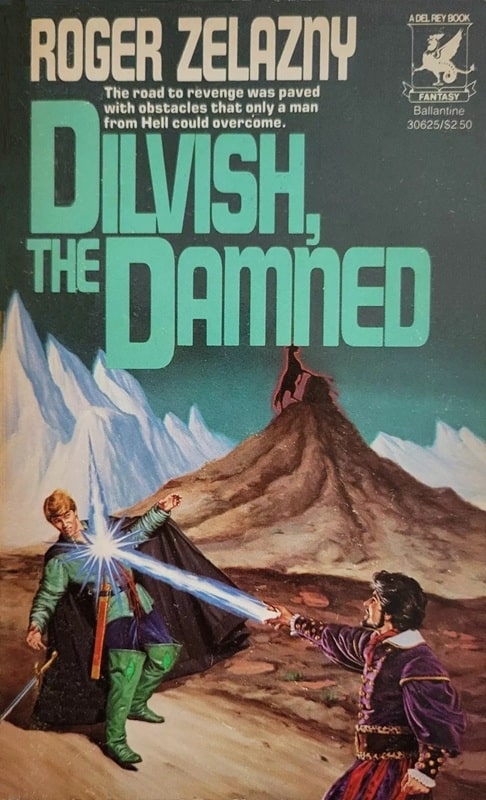
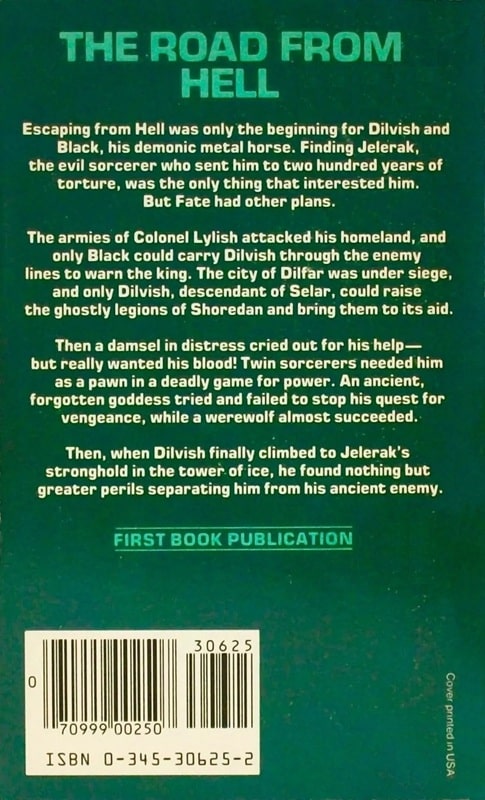
Dilvish, the Damned (Del Rey, November 1982). Cover by Michael Herring
Roger Zelazny was unquestionably one of the great American fantasists of the 20th century. That’s not to say he was perfect. His woman characters were often 2-dimensional, and he paired an unwillingness to work with an outline (“Trust your demon” was his motto) with a fondness for projects that really needed an outline.
But perfection is boring. Zelazny rarely is. Much of Zelazny’s work is on my always-reread list, anyway. He had a nifty way of putting things, and in describing the Amber series he brilliantly expressed the kind of fiction I love best and have often tried to write: “philosophic romance, shot through with elements of horror and morbidity.” Philoromhorrmorbpunk. That’s my genre. Or you could just say sword-and-sorcery.
Some people doubt whether Zelazny counts as a sword-and-sorcery writer, but he didn’t doubt it. He described not only the Corwin novels but also big chunks of Lord of Light as sword-and-sorcery. Some people think that a story only counts as S&S if it has a Clonan at its center, but as far as I’m concerned, if you’ve got an outsider hero on a personal mission in a landscape of magical adventure, and there are swords or other edged weapons, you’ve got sword-and-sorcery.
It doesn’t matter if it’s set in the deep future (e.g. Vance’s stories of the Dying Earth), or in an imaginary past (e.g. REH’s pioneering stories about Solomon Kane, Kull, Conan etc, but also C.L. Moore’s Jirel of Joiry and Cabell’s tales of Poictesme), or another world (e.g. Leiber’s Fafhrd and the Gray Mouser series).
And, anyway, Zelazny obviously counts as a sword-and-sorcery writer because of the Dilvish series. In some ways, it’s one of the finest achievements of heroic fantasy in the 20th century. In some ways, not. Details (a lot of them) ahead.
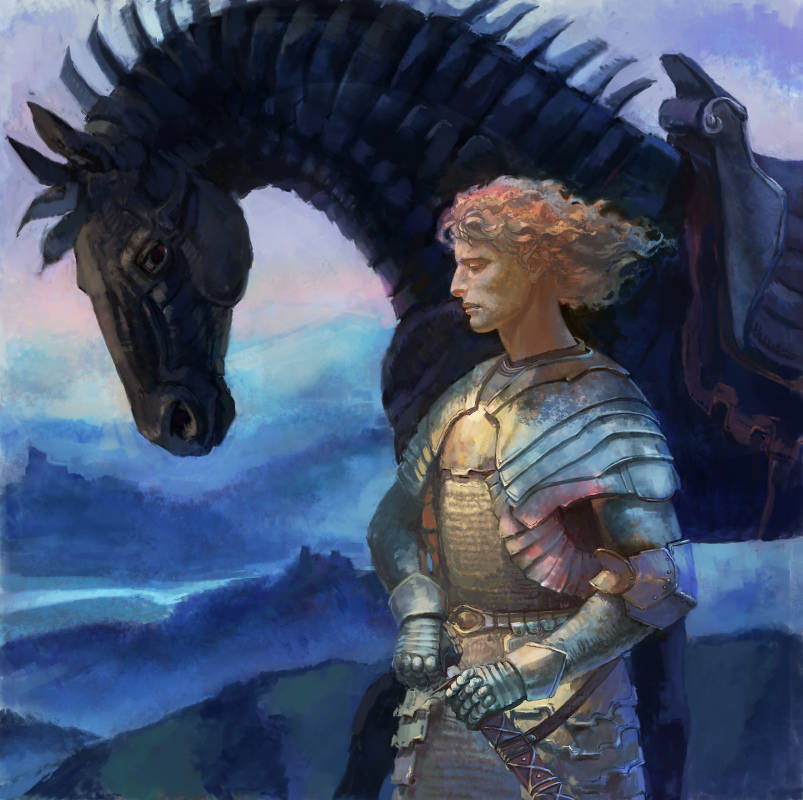 “Dilvish and Black,” fan art by Olga Sluchanko. Dilvish never had a cover painting this good in his damned life.
“Dilvish and Black,” fan art by Olga Sluchanko. Dilvish never had a cover painting this good in his damned life.
Dilvish, a.k.a. Dilvish the Damned, a.k.a. the Colonel of the East, first appeared in Fantastic under the guiding light of Cele Goldsmith, one of the great sf/f editors. After Goldsmith left the helm of Fantastic and Amazing, Zelazny continued to appear in those magazines, until he fell out with their new owner, Sol Cohen.
From that point Dilvish went into exile, the condition most natural for s&s heroes. He made appearances in a fanzine here, a small-press publication there. Zelazny’s hazy plan was to bring out a volume of Dilvish stories “to culminate in a possible novel, Nine Black Doves.” (Letter from Zelazny, 1965, quoted in the afterword to “Thelinde’s Song” in Power & Light.) When the Dilvish collection ultimately appeared from Del Rey in 1982, it was called Dilvish the Damned and it was paired with a booklength Dilvish adventure, The Changing Land.
A real golden age for Dilvish fans (which I had been since reading “The Bells of Shoredan” in a back-issue of Fantastic sometime in the mid-70s).
Or: maybe not.
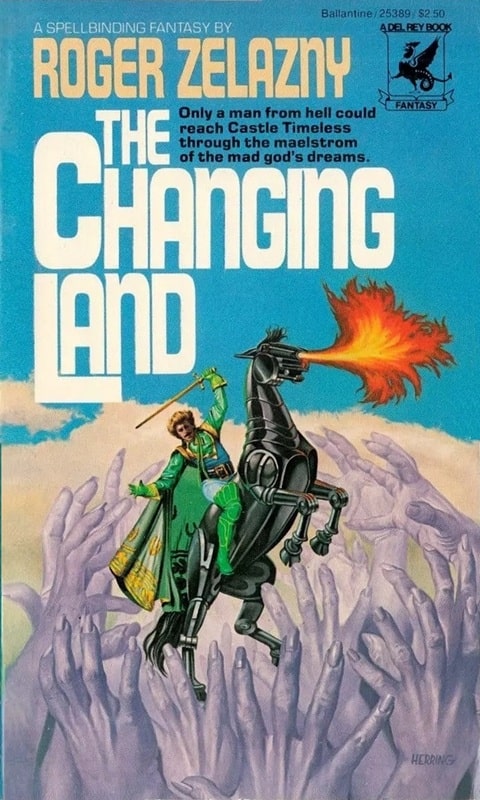
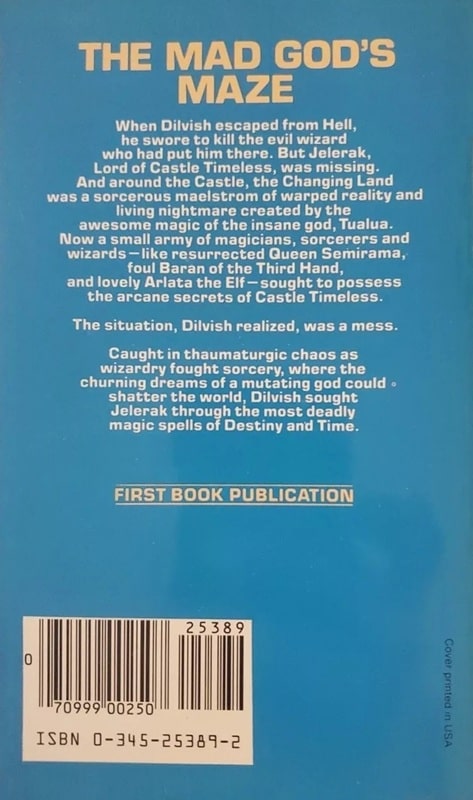
The Changing Land (Del Rey, April 1981). Cover by Michael Herring
I didn’t glom onto these books as soon as they were published; I’d been drifting away from buying books as my life became nomadic (and chaotic) in my early 20s. When I did finally get hold of the volumes I was, to say the least, underwhelmed. I wasn’t crazy about the covers, for one thing. Michael Herring is a talented artist, but I like his work better for sf; these covers are kind of Brothers-Hildebrandtish. (From some, that would be praise, but not from me. De gustibus non disputandum.)
I also didn’t like the titles: Nine Black Doves is weird and evocative; Dilvish the Damned and The Changing Land are blunt and dull declarations, like a can of peas with a generic black-and-white label PEAS.
But a book by Zelazny is a book by Zelazny, so I bought both paperbacks when I had a chance… and was not crazy about them.
“Even Homer nods,” I said to myself, and put them in a box somewhere.
When NESFA Press, that beacon of glory in sf/f publishing, produced its monumental series collecting all of Zelazny’s short fiction (Grubbs, Kovacs, and Crimmins ed.), of course I seized on the volumes as soon as I could, read them through, and loved them furiously.
 The Collected Stories of Roger Zelazny, all six volumes (NESFA Press, February – December, 2009). Covers by Michael Whelan
The Collected Stories of Roger Zelazny, all six volumes (NESFA Press, February – December, 2009). Covers by Michael Whelan
There were expected and unexpected pleasures in these volumes, but one of the surprises was how much I liked some of the Dilvish stories, tarnished in my fading memory by that 80s-era read. “I should reread the whole set of Dilvish stories together sometime,” I thought.
That was fifteen years ago, so maybe it’s time.
My executive summary, in case you don’t have the patience to read through these notes, is that the Dilvish stories contain some of Zelazny’s best writing, and some of his worst. My initial, uneasy thought was that the early stories were good and the later stories were bad, but that turned out to be too simplistic; one of the last Dilvish stories he wrote is maybe the single best thing in the two Dilvish books.
I reread the stories in the electronic version of the NESFA Collected Stories, which I recommend even more strongly than the original edition, because the editors have continued to revise and proofread the books. The design of the collections is to include the stories in the order they were composed, to the extent that can be ascertained, but they bend that rule when one story was written to provide backstory for another. (Which is exactly the right attitude toward rules. Rules should be governed by intelligence, not vice versa.)
Is Dilvish the Damned a novel or a collection of stories? I suppose I could waive the question, since I’m rereading the stories individually. But it’s a live question for work like this — a series of connected stories read as a whole. Lots of people call these things “fix-ups,” because that’s what Van Vogt called it when he smashed the bizarrely square pegs of his 1940s stories into the boring round holes of his 1950s paperback originals.
I don’t like the term because I hate Van Vogt’s fix-ups, and I also think that the best examples of this form (e.g. Leiber’s F&G volumes for Ace, or the various collections of C.L. Moore’s Jirel and Northwest Smith stories, or Howard Andrew Jones’ Hanuvar novels) don’t replicate Van Vogt’s mistakes: they respect the original stories, even when they create connective tissue to string the stories together. I call this kind of thing an episodic novel, and keep hoping that the term will catch on.
Whatever this thing is, here’s what I thought of it. (YMMV; de gustibus non disputandum; objects in mirror may be closer than they appear; etc.) This is already getting to be pretty long, so I’ll defer my thoughts about The Changing Land to another time (if ever).
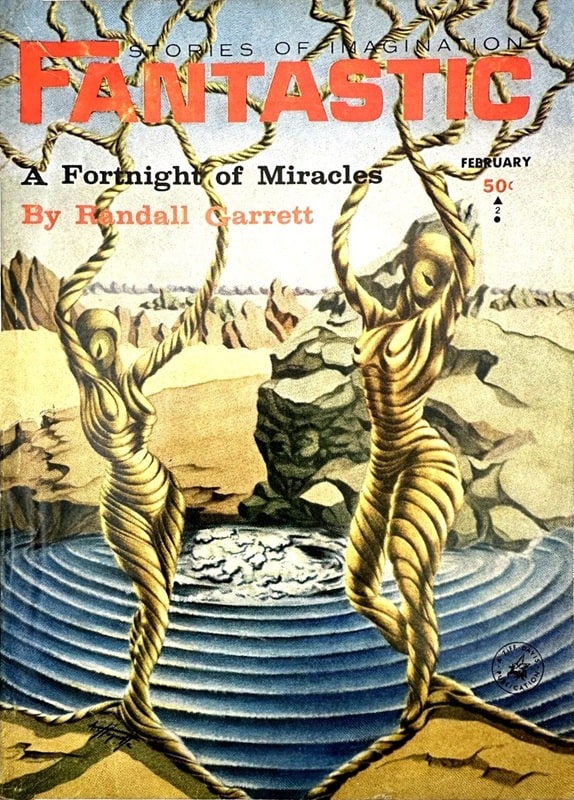 Fantastic Stories of Imagination, February 1965, containing the first Dilvish story, “Passage to Dilfar.” Cover by Heidi Coquette
1. “Passage to Dilfar” (1965, approx 2,000 words)
Fantastic Stories of Imagination, February 1965, containing the first Dilvish story, “Passage to Dilfar.” Cover by Heidi Coquette
1. “Passage to Dilfar” (1965, approx 2,000 words)
We meet Dilvish, already in progress, riding a horse made of steel named Black, “for whom it was said the Colonel of the East had bartered a part of his soul.” They are fleeing from a place called Portaroy, pursued by horseman sent by Lylish, Colonel of the West. (Dilvish himself is the aforesaid Colonel of the East.) Through hazards mundane and magical, they make their way to Dilfar, in the hopes that this city will withstand the onslaught of Lylish’s armies.
This is a very short story, approx 2,000 words, but it packs a strong, fantastical punch. It suggests a world far larger than anything it depicts. Zelazny claimed that he never intended to write a sequel, but Editor Goldsmith said it “begs for a series”, so Zelazny obliged. In fact, he started to plan a series of adventures, maybe to be capped with a novel called Nine Black Doves.
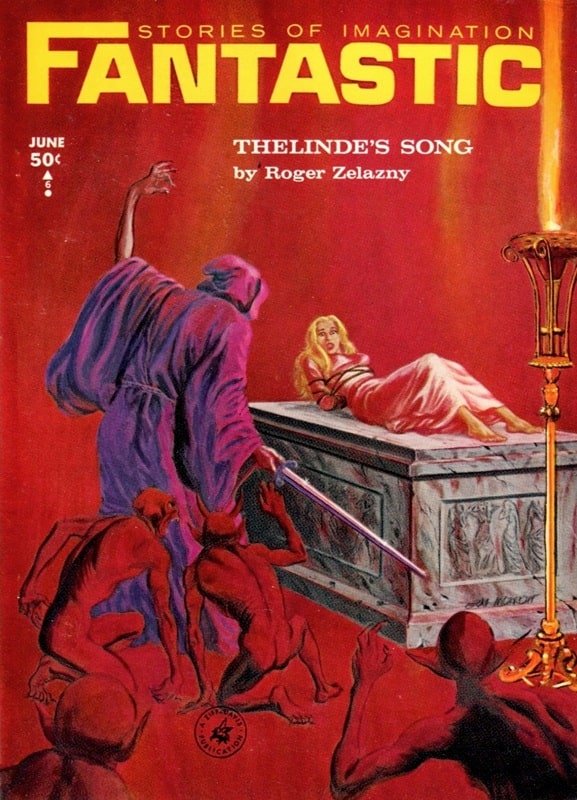 Fantastic Stories of Imagination, June 1965. Cover by Gray Morrow, illustrating “Thelinde’s Song.”
2. “Thelinde’s Song” (1965; approx 2,800 words)
Fantastic Stories of Imagination, June 1965. Cover by Gray Morrow, illustrating “Thelinde’s Song.”
2. “Thelinde’s Song” (1965; approx 2,800 words)
If you’re expecting an epic account of the defense of Dilfar against the slavering hordes of the Colonel of the West, that’s not where Zelazny is headed. There was such a defense, and it’s mentioned in passing here, including Dilvish’s final encounter with the warrior he met and bested (sort of) in the previous story.
But Dilvish himself doesn’t even appear as a character in this story, which is a conversation between the titular Thelinde and her witch-mother Mildin. Mildin explains the half-elven background of Dilvish, his victory in defending Portaroy in the old time, his magic green elf-boots, and his enmity with the evil and powerful wizard Jelerak.
Jelerak was using evil magic to evilly draw the youth out of a maiden; Dilvish tried to disrupt the ceremony; Jelerak changed Dilvish’s body to a statue and sent his soul to Hell. There Dilvish suffered for centuries, but now he’s escaped with a demonic horse named Black and Jelerak, with all his power, now has something to worry about.
This story isn’t much longer than “Passage to Dilfar.” Where “Passage” was all action, this is all exposition, and at times it seems like Zelazny has a list of things he wants his mouthpiece to talk about (e.g. Dilvish’s green elf-boots, magical equipment which you would think would affect the stories a lot, but usually do not). Still, this quasi-story is vivid and impactful and sketches in details about Dilvish and his world that make them loom even larger in the imagination.
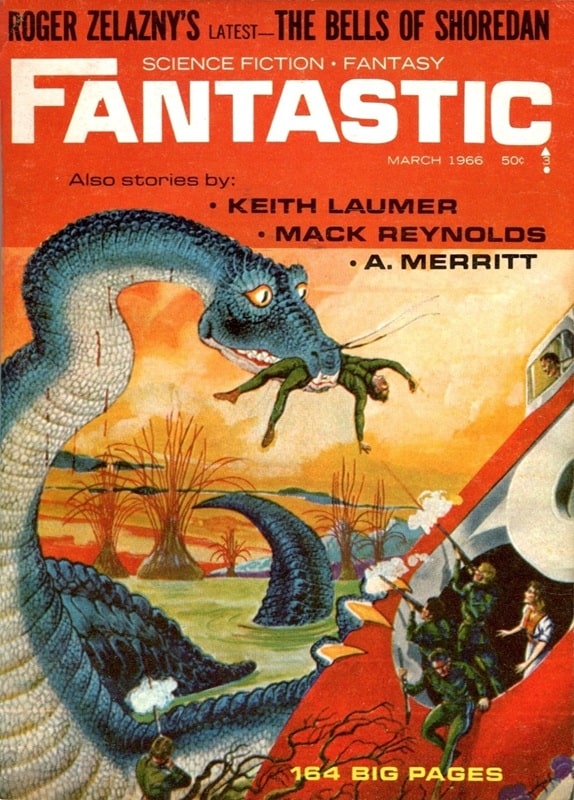 Fantastic, March 1966, containing “The Bells of Shoredan.” Cover by Frank R. Paul
3. “The Bells of Shoredan” (1966; approx 6,200 words)
Fantastic, March 1966, containing “The Bells of Shoredan.” Cover by Frank R. Paul
3. “The Bells of Shoredan” (1966; approx 6,200 words)
In this much longer story, Dilvish goes to the ruined city of Shoredan to ring its bells and summon its legions of the dead to fight against the Colonel of the West. On the way he must confront the ghost of his Elvish forebear Selar and the demon who tortured Dilvish in Hell, Cal-den. On the way he acquires the invisible blade of Selar.
If you like this kind of thing, you will like this story a lot. A sword-and-sorcery classic. If you read only one Dilvish story, it should be this one.
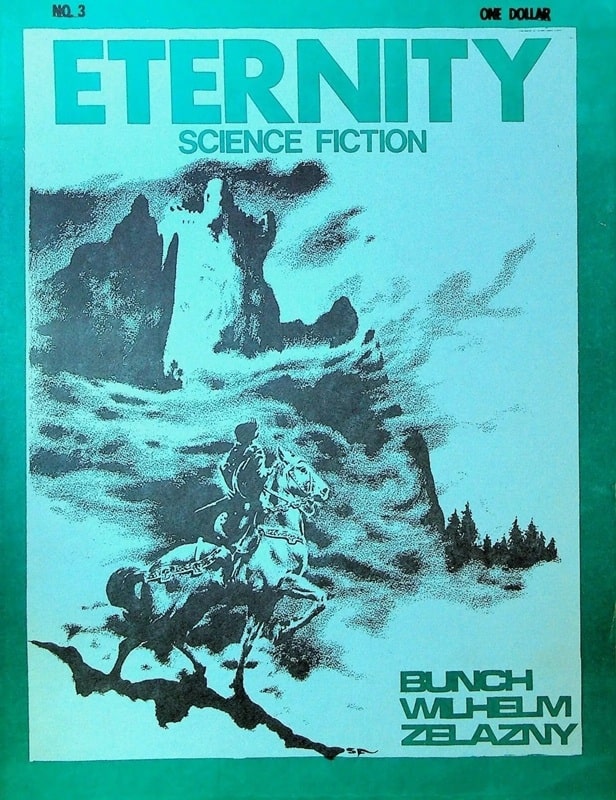 Eternity Science Fiction #3, 1974, containing “A Knight for Merytha.” Cover by Stephen Fabian
4. “A Knight for Merytha” (1967; approx 3,000 words)
Eternity Science Fiction #3, 1974, containing “A Knight for Merytha.” Cover by Stephen Fabian
4. “A Knight for Merytha” (1967; approx 3,000 words)
Again, where an epic fantasist would zig (i.e. follow up the previous story by describing the battle of the dead against Lylish), Zelazny zags. We catch up with Dilvish for a solo adventure as he travels alone with his steel horse and demonic sidekick Black.
And, if you were expecting more progress on the Jelerak plotline, that doesn’t happen either. Zelazny later described Dilvish as a man obsessed with revenge, but that isn’t clear in the actual stories. Jelerak isn’t mentioned at all in the first Dilvish story, or in this one, where he is scouting ahead of the “doomed army” he summoned to defeat Lylish.
Like a knight sans peur et sans reproche, Dilvish responds to the cry of a woman in distress (even though his wily steed warns him against it). If you think you know where this story is going, you probably do, but it’s a solid fantasy adventure involving a vampire. Sword-and-sorcery meets Hammer Horror. Cast Ingrid Pitt as Merytha and you’ve got it.
One particular detail that struck me about this story — more a worldmaking question than an issue with the story itself — is the use of the invisible sword of Selar (which Zelazny acquired in “Shoredan”). It’s hard to see (wokka-wokka-wokka) how such a sword would actually be useful. No doubt there’s a surprise factor when you approach your foe armed, but apparently empty handed. But how do you fight with it? You, as much as your opponent, need to know where your point is so you can stab him with it. There’s a great series of movies about a blind swordsman Zatoichi, but on film that stuff works because your eye sees it and the mind accepts it.
It wasn’t clear to me what skills Dilvish had or developed to make use of the invisible blade. Zelazny was a fencer and pursued a number of different martial arts and he may have had ideas about it, but the invisible blade disappears after this story, along with Lylish and the defense of Dilfar.
“A Knight for Merytha” originally appeared in a fanzine and was the last of the Dilvish stories for a while. Zelazny wasn’t sending his work to Fantastic or Amazing anymore, due to his quarrel with their new publisher, and when he got the sword-and-sorcery itch he would write about other characters — Sam the Buddha and his pseudo-divine frenemies, or Corwin of Amber and his quasi-divine familenemies.
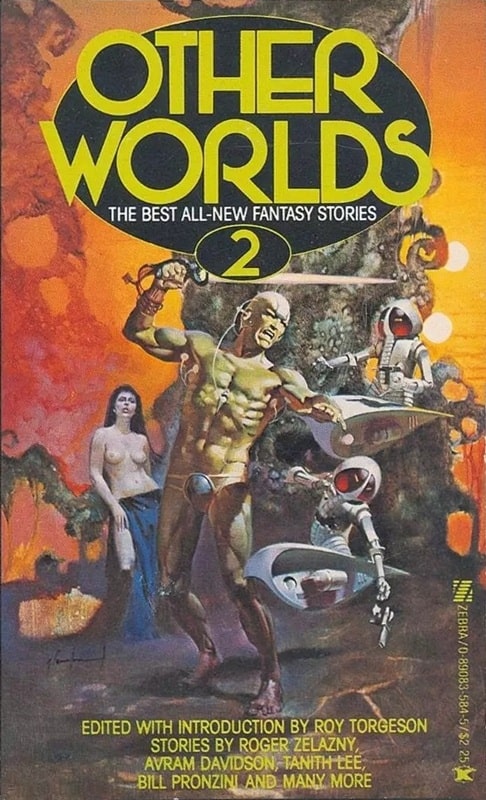
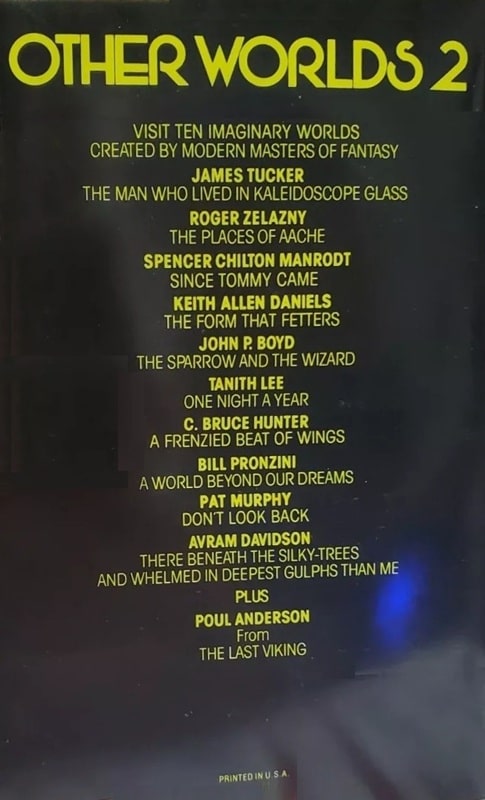
Other Worlds 2, edited by Roy Torgeson, containing
“The Places of Aache” (Zebra, January 1980). Cover by Jordi Penalva
We again find Dilvish wandering through strange lands alone (except for his faithful Black). He runs into a would-be robber who’s disconcerted by Dilvish’s militant response. The robber thinks he has protection from a local goddess, who authorizes his career of crime, but that doesn’t save him from Dilvish’s (non-invisible) sword.
Dilvish goes on to confront the sinister priest of the goddess, and the goddess herself. She’s a monstrous, many-limbed creature, and at this point you might expect an epic battle. What actually happens is that Aache (the monster-goddess) and Dilvish talk, and he figures out a solution for her particular set of problems. But there’s a menace lurking that neither of them expect, and the story ends on a tragic note.
This is a solid sword-and-sorcery adventure where the hero displays intelligence and compassion as well as ruthlessness and fighting skill. (The conversation between Dilvish and Rogis the robber is classic, Hammett-level tough-guy dialogue.)
There’s no mention of Jelerak here; there’s no mention of Lylish and the military conflict over Portaroy, Dilfar, etc.
6. “A City Divided” (1982)Originally published in Dilvish, the Damned.
We again find Dilvish wandering through strange lands alone (except for his faithful Black). (Yes I did just cut-and-paste that from the section above.) While travelling in the North Country, Dilvish falls into a city-sized trap, where a magical game is being played between two sorcerers. Dilvish’s fighting ability and Black’s infernal strength can’t get them out of this one, so Dilvish turns to magic — one of the twelve Awful Sayings that he learned in Hell.
There’s some good stuff here: conversations between Dilvish and Black, the depth of infernal lore suggested by a few strategic details, the conversation between Dilvish and the sorcerer Strodd at the end of the story.
But there’s also a lot of narrative busywork as Dilvish and Black try to negotiate the maze inside the city. Mazes are weird and perplexing when you’re in them, and that kind of experience films well (I’m thinking of a couple of very different scenes in The Stand and in Sleuth), but I don’t think it works well in fiction. Anyway, it didn’t work for me in this fiction.
The conflict with Lylish is mentioned (as completed in the past), and Jelerak is discussed at the end, including the place Dilvish expects to find him, the Tower of Ice. So there’s at least some attempt to fit this story into the over-arching plotline of the series.

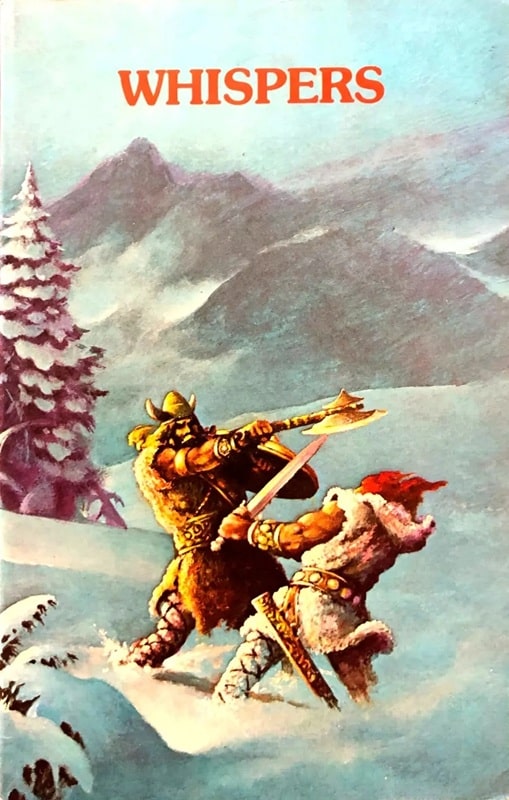
Whispers 2, October 1979, edited by Stuart David Schiff, containing “The White Beast.” Cover by Steve Fabian
We again find Dilvish wandering through strange lands alone (except for his faithful Black). My cut-and-paste notwithstanding, I don’t object to this generic type of beginning. Zelazny varies the descriptions to keep the thing interesting, and a sword-and-sorcery hero is usually a loner or at least an outsider. In this story, for instance, Dilvish’s name doesn’t appear until three-quarters of the way through this very short (approx, 1,200 words) story. He’s just described externally.
Now Dilvish is deep in the north, in a landscape of snow and ice, and he is being pursued through the icy wasteland by a white werebeast. Dilvish is not the guy to back away from a fight, but instead of killing the monster he offers to split his food with it. They engage in conversation and discover they have a common enemy.
This is only an episode, leading to the longest Dilvish story (except for the novel, The Changing Land), but it’s vivid and haunting.
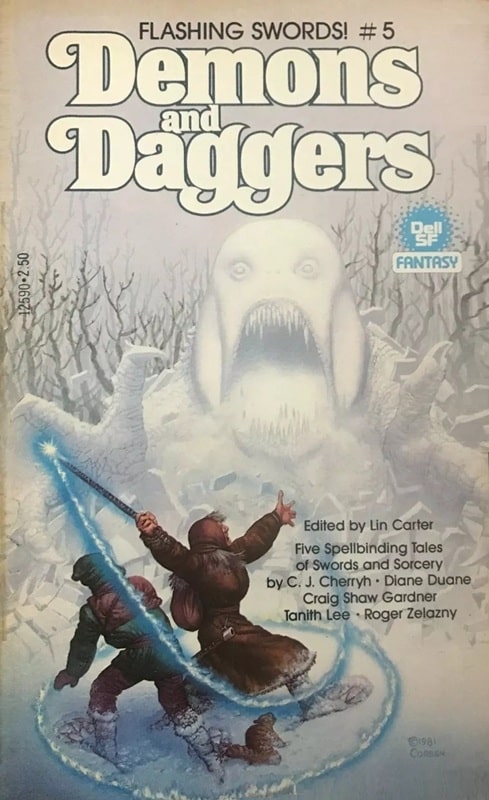
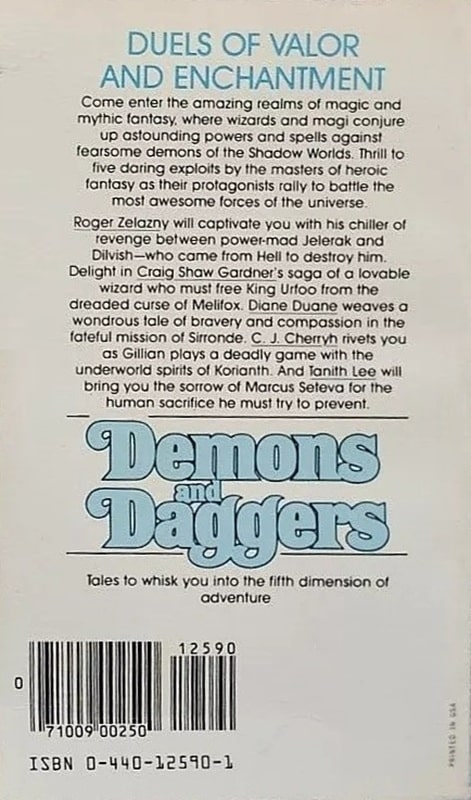
Flashing Swords! #5: Demons and Dagger, edited by Lin Carter,
containing “Tower of Ice” (Dell, December 1981). Cover by Richard Corben
We again find Dilvish wandering through strange lands alone (except for his faithful Black). But this is no mere random episode: Dilvish has finally reached one of Jelerak’s strongholds and hopes that he can have his long-sought-for confrontation with this Evil Wizard Who Is Evil… if he can just get into the damned place.
This is the longest of the Dilvish stories (except for the novel, The Changing Land). It was one that Zelazny had long planned on writing. And it is, in my view, the worst of the Dilvish stories (except for the novel, The Changing Land).
What went wrong? (If you love this story, you may be screaming “NOTHING!” so hard at your device that the screen cracks. But don’t do that. De gustibus non disputandum. And you can always write your own review.)
For one thing, this story was a rush job, and it shows.
The stage was finally set [for the novella ‘Tower of Ice’]. But I had no intention of carrying things further at that point. I was busy writing the novel Roadmarks and wanted to get on with it. A week after I’d sent off ‘The White Beast,’ though, I received a request from Lin Carter for a 20,000 word Dilvish story for Flashing Swords #5. It seemed like the Finger of Fate. I allowed myself a week and wrote ‘Tower of Ice.’
— Zelazny in Alternities 6 (Summer 1981), quoted in the NESFA collection Last Exit to Babylon (Grubbs, Kovacs, and Crimmins ed.)
There’s a lot of stuff in here: a brother and sister with a sorcerous connection, a wizard with multiple personalities struggling to control his power and himself, a sorcerer’s apprentice readying himself to confront his evil master in a magical duel to the death, a magic mirror prophesying a doom that grows ever closer, a captive demon, a demented monster in love with a demented witch who commands an army of demented rats. Etc! I say yay to all this. More is more!
Some of these people are the same person, but (significantly) none of them is Dilvish. This is not really his story, although we spend a lot of it following him around. There’s a lot of narrative busywork getting him into the Tower of Ice, and then a lot more to get him out, without fighting Jelerak, even though that nemesis shows up (in non-physical form). Dilvish departs with Reena, the sister of Ridley, Jelerak’s rebellious apprentice, and it’s Ridley who fights Jelerak. Jelerak seems to kill him and escape at the end of the story.
The upshot is that Dilvish is back on the road again, now with a female companion. The whole novella is just a narrative cul-de-sac, where Dilvish goes one way only to come back the way he came. No progress on Dilvish’s quest is made at all, and it’s not a satisfying episode (unlike many that preceded it and some that follow) because Dilvish doesn’t take any significant action that affects the story.
You never know what might have happened, but if Zelazny had taken more time writing this story, he might have made its diverse elements cohere into something more worth reading.
9. “Devil and the Dancer” (1982, approx 15,000 words)Originally published in Dilvish, the Damned.
We again find Dilvish… Wait a second. No we don’t.
This novelette opens with a witch-priestess named Oele dancing a fiery ritual before the “empty stone-faced altar” of a dying god. This god (whose name she doesn’t know, so she calls him “Devil”) repays her with magical and material benefits. She is his last worshipper, and without her he’ll die (or undergo a transition that is like death to a god). She gained her power from the god by sacrificing her lover to him; now he needs a new sacrifice to maintain his strength. She goes in search for one and will find… Dilvish, the only man who still remembers the name of the dying god.
This is one of the best Dilvish stories. Everything that goes wrong in “Tower of Ice” goes right here. The novelette is stuffed with interesting, distinctive characters: Oele the witch-priestess, her devil-god who needs and hates her, an old man who shall be nameless at this time, an adventurous and temptable ship-captain named Reynar, witchy Reena (who travels with Dilvish but who knows he isn’t for her), and Dilvish himself, who takes crucial action to resolve the Gordian knot of conflicting quests that cross the empty altar of the dying god.
“Devil and the Dancer” is 15,000 words long, with not one wasted. The final brief paragraph is a dagger that stabs deep; the weight of the whole story is behind it.
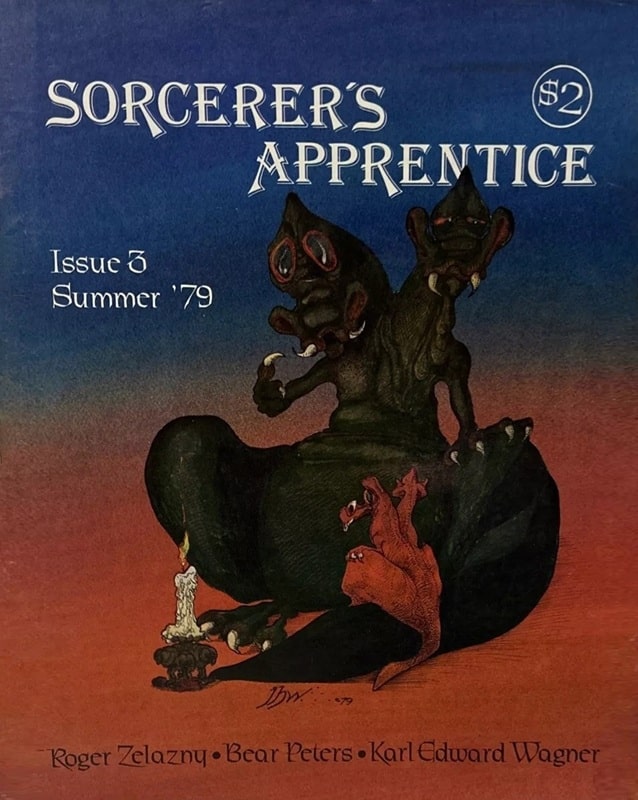 Sorcerer’s Apprentice, Summer 1979, edited by Ken St. Andre, containing “Garden of Blood.” Cover by Joan Hanke-Woods
10. “Garden of Blood” (1979)
Sorcerer’s Apprentice, Summer 1979, edited by Ken St. Andre, containing “Garden of Blood.” Cover by Joan Hanke-Woods
10. “Garden of Blood” (1979)
We again find Dilvish wandering through strange lands alone (except for his faithful Black). (According to the first paragraph, he’s working as a scout for a caravan, but we never see the caravan and it doesn’t affect the course of the story much, if at all.)
The lands are strange to us, but not to him. He’s been over this ground before, before he was trapped for 200 years in hell. He finds himself in the ruins of a town he once knew, named Trelgi. He and Black pass onward to a fair field full of bright flowers, where the town’s ancient stone altar still stands.
Through some combination of magic and narcotics from the flowers (flashback to the poppy scene in The Wizard of Oz), Black is paralyzed and Dilvish finds himself trapped in a dream or vision where he and Black (in human form) fight against the robbers who sacked Trelgi and slew its inhabitants.
A solid adventure-fantasy, well worth reading.
11. “Dilvish the Damned” (1982)Originally published in Dilvish, the Damned.
The last two Dilvish stories (apart from the novel) have something in common that distinguishes them from the others. We find Dilvish working for a living. He may be a somewhat sorcerous person who rides a demonic metal steed, but he apparently can’t pull gold coins out of Black’s ears, or other orifices. I like this, as supplying the grit that s&s needs (Joe McCullough’s great definition of sword-and-sorcery is “Fantasy with dirt.”) But it does put the end of this series on a different, more mundane level than its dreamlike, allusive beginnings.
After getting paid and buying supplies, he sets off for a castle called Timeless:
The blind poet and seer, Olgric, had told him that he would find there the thing that he sought.
But before Dilvish gets there, a guy on the road tries to rob him. The robber is pretty inept, and Dilvish in the end is inclined to let him go, but he tries to impale himself on Dilvish’s sword. It turns out that he’s been trying to get Dilvish to kill him. Dilvish is intrigued and, in spite of Black’s warnings, he stops to get the thief’s story.
The thief is named Fly and he is the walking definition of the phrase “mealy mouthed.” (He keeps saying things like “Well, yes and no.”) Dilvish eventually gets his story: he stole a magic belt from a god’s temple; now the adherents of the god are after him, as well as the adherents of a rival god who want the belt for their own purposes.
There’s some wiliness and chasing and fighting and a curse or two but, in the end, Dilvish returns the belt to the god from whom it was stolen, and he and his demonic steed get the hell out of there.
After the story proper, there’s a short coda. The next day, Dilvish is confronted by a young woman who begs for his help. Black warns him not to be taken in, and we’ve actually seen Dilvish tricked this way before (“A Knight for Merytha”).
But Dilvish can’t bring himself to deny a plea for help. ” ‘Damned if you do, damned if you don’t,’ he said, dismounting.” Which is at least kind of an amusing punchline to the series, if not laugh-out-loud funny.
 The Bells of Shoredan (Underwood Miller, May 1979). Cover by Matt Gouig
Overview
The Bells of Shoredan (Underwood Miller, May 1979). Cover by Matt Gouig
Overview
The parts of the Dilvish series are greater than the whole. Some stories, I would argue, are essential reading for the heroic fantasy enthusiast (e.g. “Passage to Dilfar”, “The Bells of Shoredan”, “Devil and the Dancer”). Most of the rest are well worth reading (e.g. “The Places of Aache”, or “Garden of Blood”). The weakest and longest story in this series (setting apart The Changing Land for another time) is “Tower of Ice”, and even it has some interesting stuff in it.
But it has nothing that connects it all together. It’s a set of fragments. Zelazny would have it that Dilvish is a man obsessed. He calls him “a humorless monomaniac.” (This from a letter to Carl Yoke, quoted in the afterword to the last Dilvish short story in the NESFA collection Nine Black Doves.) But Dilvish has at least two sets of concerns in the stories: defending Dilfar and other cities of “the East” from Lylish, the Colonel of the West, and also getting revenge on Jelerak, neither of which seem to me to be crazy. And most of the stories don’t involve either one of these goals, or mention them only in passing, undermining any picture of Dilvish as obsessive.
Zelazny knows his character better than anyone else does, obviously, but my point is that he doesn’t create the portrait of a monomaniac in the Dilvish stories that he actually wrote and published. There isn’t that much coherence in them. When Dilvish raises a ghost legion to fight for him in Shoredan, the actual fight he raises them for occurs offstage and is mentioned only in passing. Lylish and Jelerak are supposed to be these big menaces, but Lylish never appears onstage, and Jelerak only occasionally and somewhat unimpressively. Zelazny is careful to introduce us to a sorcerer named Strodd in “A City Divided” and make him indebted to Dilvish… but he’s only mentioned once in passing, later on, and he never appears in a Dilvish story again.
The good stuff in the stories is mostly the incidental stuff along the way. There is no overarching plotline that connects them, any more than there is for Leiber’s stories of Fafhrd and the Gray Mouser or REH’s Conan stories.
And that’s a virtue, not a vice. Zelazny’s great gift as a writer was for brilliant improvisation. These stories would be better if they were presented as a series of fragments from a heroic life, without any pretense of telling a continuous story.
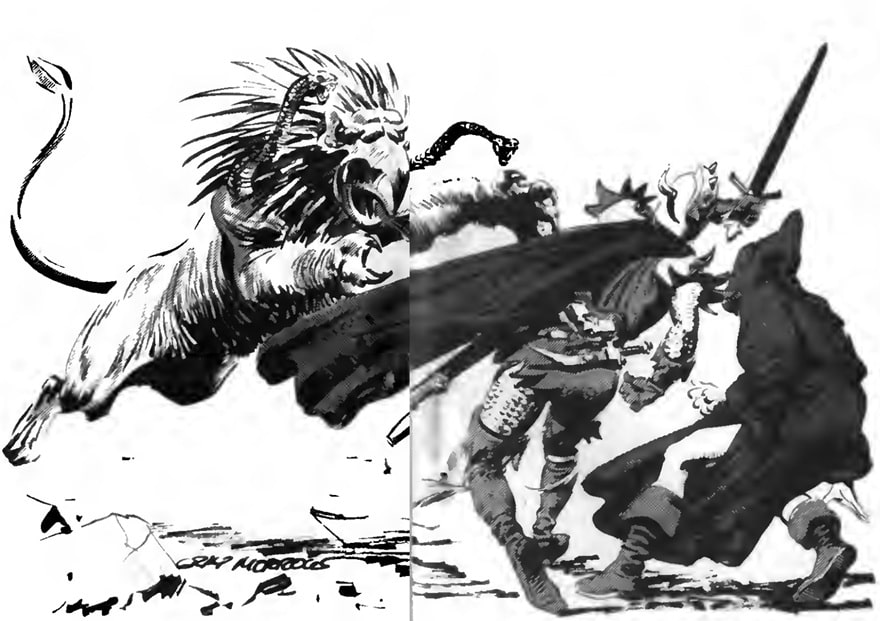 Interior art for “The Bells of Shoredan” by Gray Morrow. From Fantastic Stories, March 1966
Interior art for “The Bells of Shoredan” by Gray Morrow. From Fantastic Stories, March 1966
That was Howard’s idea for the Conan series:
“The average adventurer, telling tales of a wild life at random, seldom follows any ordered plan, but narrates episodes widely separated by space and years as they occur to him.” (From a letter REH wrote in 1936 to P.S. Miller, included in the Lancer/Ace Conan, p.17.)
I’m not saying every s&s writer has to imitate REH forever, but this approach would work better with the Dilvish stories than the pseudo-biography that Zelazny tries to force them into.
The reader who has read this far without dying of boredom deserves some kind of ringing peroration to send them rushing out into the street in search of trouble and fantastic adventure. Unfortunately I don’t have one.
I do have kind of a technical writing observation that, if nothing else, will help you to drift off to sleep in the friendly light from whatever device you’re reading this on.
In most of the Dilvish stories, we get almost nothing of Dilvish’s inner life. We have to deduce what he’s thinking and feeling from his words and actions — the same way we do with the people around us. This is unlike a lot of modern fiction, where we typically get the inner monologue of the viewpoint character. In lots of ways, Dilvish is not our viewpoint character; he is a character we are viewing.
That appeals to me because it’s more like ancient and medieval literature, and it gives him a degree of mystery. The later stories in the series where we get more of Dilvish’s feelings are part of that descent into mundanity, like the mentions of him working for a living. I don’t think that’s bad; it’s just interesting how Zelazny’s approach to the character changed over the nearly-two-decades that he wrote about him.
Now go ye forth into the mysterious vale of night and smite those who must be smitten, even as your heart doth compel ye. (Unless that seems inadvisable for ethical, legal, or practical reasons. Offer void where prohibited.)
Our previous coverage of Dilvish at Black Gate includes:
Dilvish, the Damned by Fletcher Vredenburgh (September 12, 2017)
This article originally appeared at James Enge’s excellent Engeblog on January 23, 2025.
OUT NOW – Fantastic Schools War
Featuring a whole new Schooled in Magic novella!
Have you ever wanted to go to magic school? To cast spells and brew potions and fly on broomsticks and – perhaps – battle threats both common and supernatural? Come with us into worlds of magic, where students become magicians and teachers do everything in their power to ensure the kids survive long enough to graduate. Welcome to … Fantastic Schools.
Meet the students preparing for magical war, learning how to wield sorcerous weapons or fantastic talents in defence of the world; meet the magicians testing their abilities in worlds touched by the fantastic and the supernatural, or the magicians completing their final exams – or going to war, learning on the job as the darkness moves ever-closer to home. Meet the students who think they have all the time in the world, and the ones who discover that their training has suddenly become all too real.
The glory of war awaits them, in these pages, but so too does the price …
Purchase from: Amazon US, Amazon UK, Amazon CAN, Amazon AU.
And check out the latest call for submissions here!

Republished: The Decline and Fall of the Galactic Empire
The Federation has endured for hundreds of years, but as corruption and decadence wear away the core of human unity, rogue admirals rise in rebellion. As the Federation struggles for survival, two officers, an old Admiral and a newly-minted Lieutenant, may be all that stands between the Federation and destruction.
Book One: Barbarians At The Gates (now on KU)
DOGE- Supernatural Division (episode 6)
The Candle Is Lit…
A few days ago, when the edits for This Kingdom Will Not Kill Me just landed in our inboxes, I made this candle with the idea that once this, final content edit was done, I would ceremoniously light it.

In all fairness, the candle looked prettier in my head, but I don’t normally make candles.
Well, guess what?

That’s right, the edits are done.

Here is the candle, burning in the study. Hopefully it will smell lovely.
The edit has been sent off and I’m going to take a couple of days to recover.
The post The Candle Is Lit… first appeared on ILONA ANDREWS.
Comment on A Beginner’s Guide to Drucraft #31: Sigl Recycling (I) by Skeeve
Interesting, how does the technology to ‘drain the well’ (and store it for later use) interact with sigil recyling?
Looks like one could ‘create their own wells’ by acquiring different sigils and capturing the essentia from them. With enough skills, research (of background of these sigils) and money, one could actually build quite a formidable well this way.
There, Wolves: Part III
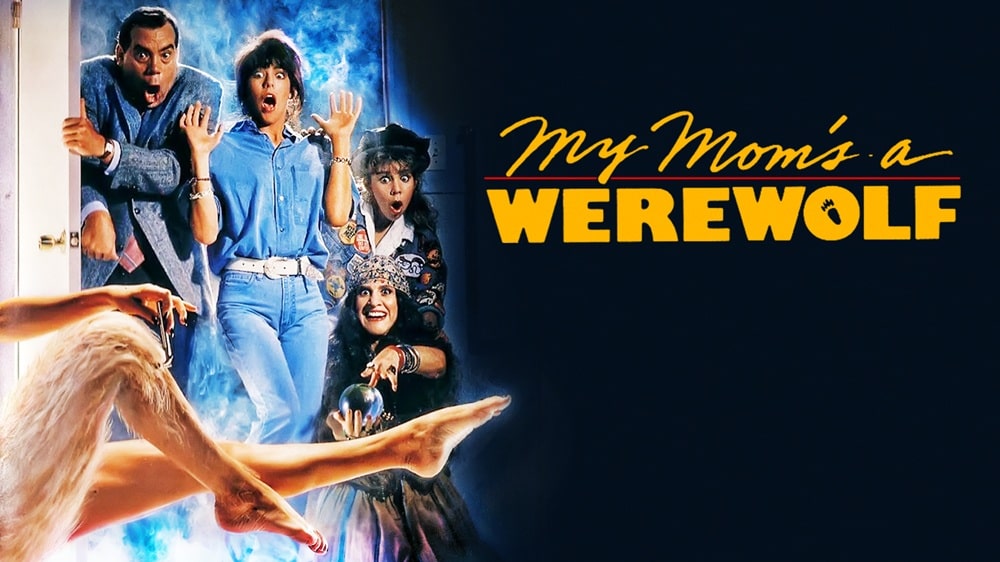 My Mom’s a Werewolf (Crown International Pictures, May 12, 1989)
My Mom’s a Werewolf (Crown International Pictures, May 12, 1989)
A 20 film marathon of werewolf movies I’ve never seen before.
As usual, the films must be free to stream.
I’ve got a bad feeling about this.
My Mom’s a Werewolf (1989) YouTubeMan or beast? Gradual, hairy transformation into rubbish suits.
Howlin’ good time? The 80s are arguably the greatest decade for horror and, perhaps, the much maligned sub-genre of horror comedy, but this one squeaks in at the end hoping to ride some Teen-Wolf coat tails, and it doesn’t quite succeed. The intention is there, everyone gives it their all to a cartoonish level, and John Saxon is awesome, but for me the jokes didn’t always land, and it felt horribly dated.
The film has a similar premise to the OG Fright Night (teen recruits monster nerd friend to combat monster and save family), but it was all a bit too cutesy for my tastes and, despite the promise of a great werewolf at the end, the actual makeups were a bit of a let down. Fun to see Ruth Buzzi again though, looking younger than she did in the 60s.
5/10
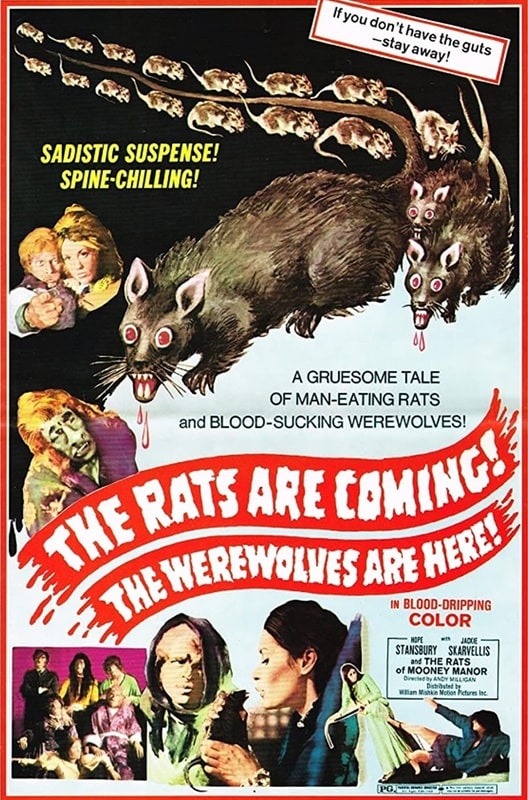
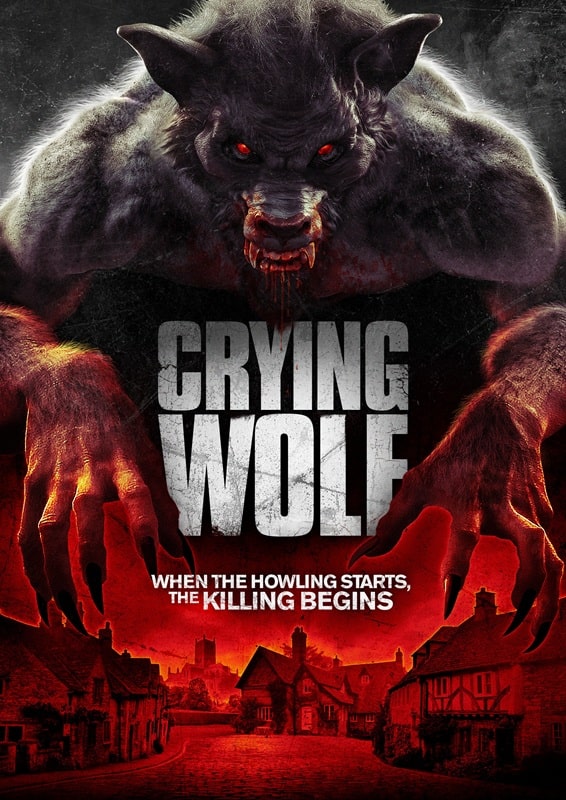
The Rats Are Coming! The Werewolves Are Here! (William Mishkin Motion
Pictures, May 1972) and Crying Wolf (Uncork’d Entertainment, 2015)
Man or beast? Brownface + hairy eyebrow makeups.
Howlin’ good time? This is a film from the notably sleazy mind of Andy Milligan, who once enjoyed stuffing his grindhouse efforts full of sadism and salaciousness. This film, however, is his tamest by far, with nary a whiff of sex or violence (although he does include a ghastly bit of sadistic treatment towards a live mouse, which is unpleasant).
The best thing about this movie is the title, but even the rats are merely a ten-minute distraction, presumably an after-thought, during this dull exercise in miserable family members sitting around moaning about being werewolves. The actual beasts appear at the end, when everyone seemingly turns into one and set upon each other for no good reason. Pretty awful.
3/10
Crying Wolf (2015) TubiMan or beast? CG/gorilla suit hybrids.
Howlin’ good time? Full transparency, I put this one on because Caroline Munro headlines it, but when she disappears after 5 mins, I should have done the same.
This is such an odd film, but not in the charmingly odd sense. Allegedly a comedy, it’s as cutting edge as a Benny Hill sketch but with none of the subtlety, complete with head turn ‘whooshes’ and slide whistles. The thin-as-tissue plot is padded out with flashbacks, and flashbacks within flashbacks, none of which bring anything to the story.
There a couple of fun gore effects, but it’s hampered by some lousy CG and awful werewolf costumes, and the whole affair has been re-dubbed using some lacklustre ADR and one awful American accent. The whole hot mess is narrated by a detective in a pub, and it comes off as a prolonged episode of Garth Merenghi’s Dark Place, but with worse production quality. Terrible.
3/10
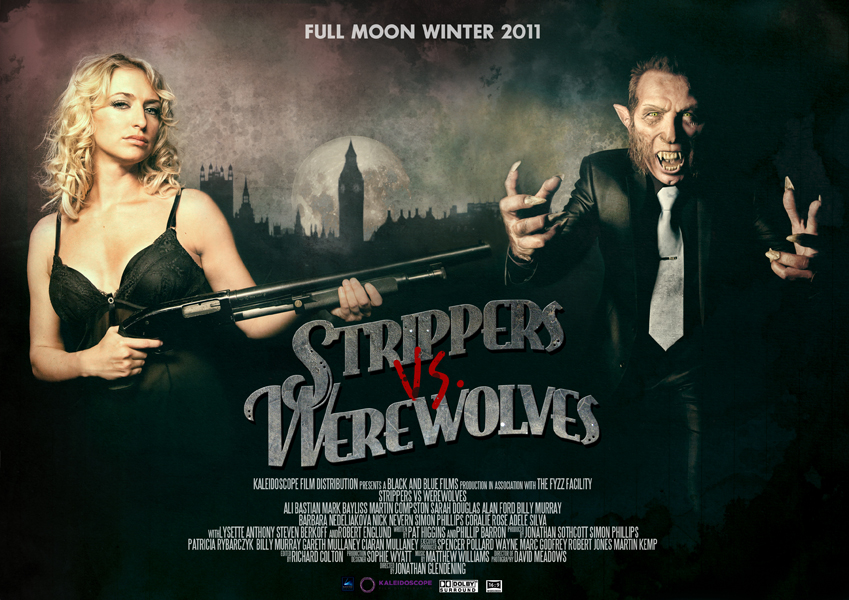 Strippers vs Werewolves (Well Go, April 27, 2012)
Strippers vs Werewolves (2012) Prime
Strippers vs Werewolves (Well Go, April 27, 2012)
Strippers vs Werewolves (2012) Prime
Man or beast? Hairy, humanoid, beast-faced bad boys.
Howlin’ good time? I went into this one expecting the usual crap (having seen Zombies vs Strippers in a moment of weakness a couple of years ago), but was a little surprised by how much I liked it. Don’t get me wrong, it’s still rubbish, released the same year as the superior (but still rubbish) Cockneys vs Zombies, but clearly everyone was having a splendid time, and there were a couple of gags that managed to get a laugh out of me.
It’s a UK production through and through, taking place in Basildon (and finishing in Dagenham!) and full of your stereotypical Essex-types, but I wasn’t ready for the cameos from folks in need of new patios, including Steven Berkoff, Robert England, Martin Kemp, Lysette Anthony and Sarah Douglas (who was the best part of the film). It’s rude, slightly violent and full of knockers, which is to be expected, daft as a brush, but still more fun than many of the films I’ve watched during this project and I didn’t hate the werewolf designs.
Recommended for people who like Alan ‘Brick Top’ Ford and bosoms.
6/10
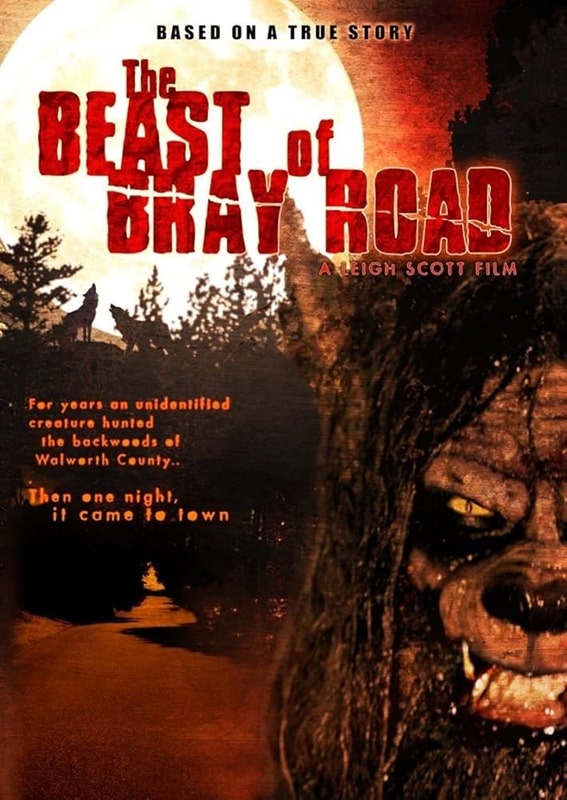 The Beast of Bray Road (The Asylum, September 1, 2005)
The Beast of Bray Road (2005) YouTube
The Beast of Bray Road (The Asylum, September 1, 2005)
The Beast of Bray Road (2005) YouTube
Man or beast? Hairy, humanoid, naughty thing.
Howlin’ good time? It’s an Asylum flick, but don’t let that put you off. Granted, it’s the usual fare; two-dimensional charac… sorry… cannon fodder going through the motions, hitting their marks and spouting uninspiring dialogue. However, a great portion of the budget went on practical effects, including more loops of guts than a back-alley sausage shop. The gore was over the top and fun, the beast however was a bit of a laugh. In fact, this poster doesn’t do the film any favours, and I can’t believe they didn’t hire an artist to paint a kick-ass werewolf for it.
As it is, this one just reminded me of Zeb from Star Wars: Rebels (if you know, you know), and I couldn’t take it seriously. Ultimately though, it’s a better-than-most Asylum effort, and I was entertained, so… congrats?
6/10
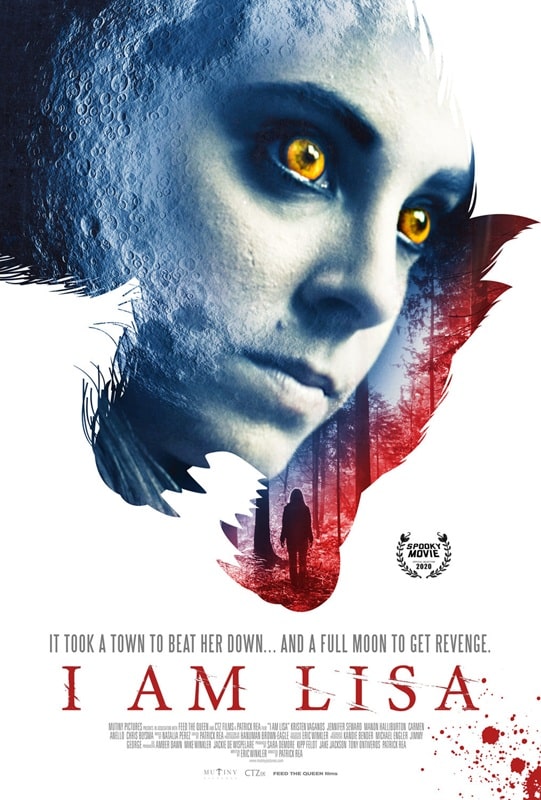
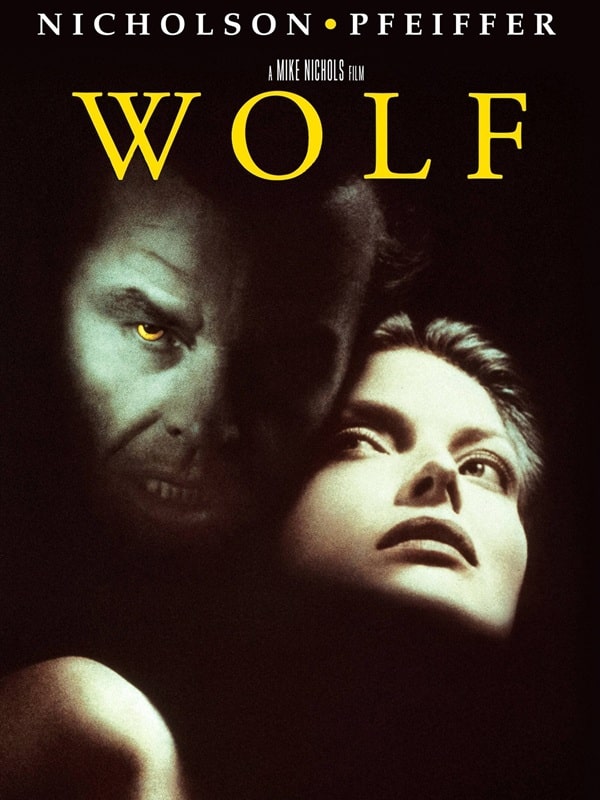
I Am Lisa (Mutiny Pictures, July 2, 2020)
and Wolf (Columbia Pictures, June 17, 1994)
Man or beast? Subtle lady beast.
Howlin’ good time? I’m glad I saved this one until close to the end of my werewolf watch-a-thon, because I was quite impressed with this indie film, shot on a low budget but spending the money wisely. It’s a tale of abuse and revenge, with strong female leads, well-written queer undertones and some lovely cinematography. I thought the director Patrick Rea handled the story really well and the score had a nice throwback vibe to it. In fact, the whole shebang put me in mind of I Spit on your Grave, with more teeth.
My only gripes lay with the sound design and the fight choreography, neither of which packed enough punch and let down the climax, but overall it’s a solid watch and I’m going to go ahead and recommend it.
8/10
Wolf (1994) PrimeMan or beast? Nicholson and Spader being hairy.
Howlin’ good time? Saved a ‘proper’ film for last, because it would be nice to go out with a bit of quality, and I hadn’t seen this before. However, I was wholly unprepared for how ludicrous and dull it actually is.
At the risk of invoking the wrath of those of you who fondly* remember this as being great, let me just express my surprise over so much before and behind the camera talent coming up with this wereturkey. It features amazing actors, Mike (The Graduate) Nichols directing, FX from Rick (American Werewolf in London) Baker and a score by Ennio (Ennio freakin’ Morricone) Morricone, and yet it is still as dumb as a bag of wolf nards. The lycanthropic plot is reduced to a subplot as the main focus is about a guy getting his job back, and its direction is a bit aimless (unlike Jack’s pee).
Is it a satire? Not funny enough. Is it horror? It’s got less teeth than grandma shark. Gah — maybe at this point, now finished with the werewolf movies, I’m jaded, cynical and ready to move on — but I really was expecting better.
6/10
*incorrectly
Previous Murkey Movie surveys from Neil Baker include:
There, Wolves: Part I
There, Wolves: Part II
What a Croc
Prehistrionics
Jumping the Shark
Alien Overlords
Biggus Footus
I Like Big Bugs and I Cannot Lie
The Weird, Weird West
Warrior Women Watch-a-thon
Neil Baker’s last article for us was There, Wolves: Part II. Neil spends his days watching dodgy movies, most of them terrible, in the hope that you might be inspired to watch them too. He is often asked why he doesn’t watch ‘proper’ films, and he honestly doesn’t have a good answer. He is an author, illustrator, outdoor educator and owner of April Moon Books (AprilMoonBooks.com).
Love is in the Air | 9 Steamy Romance Novels to Devour
Okay, romance novel lovers, cuddle up with your warm blanket in your favorite reading spot.…
The post Love is in the Air | 9 Steamy Romance Novels to Devour appeared first on LitStack.
Some Thoughts On The Current European/American Situation
Some Thoughts On The Current European/American Situation
“Closing your eyes isn’t going to change anything. Nothing’s going to disappear just because you can’t see what’s going on. In fact, things will even be worse the next time you open your eyes. That’s the kind of world we live in. Keep your eyes wide open. Only a coward closes his eyes. Closing your eyes and plugging up your ears won’t make time stand still.”
― Haruki Murakami, Kafka on the Shore
Well, we can’t say we weren’t warned.
It was easy to believe, after the end of the Cold War, that Russia was a broken state and would remain so for the foreseeable future. This was obviously inaccurate. There was no danger in both expanding NATO and cutting European military forces to the bone, Europeans thought, nor was there any risk in becoming dangerously dependent on Russian gas and oil. The prospect of Russia being able to rejuvenate herself, as Germany had done after 1918, seemed increasingly remote. The chaos and corruption of the Yeltsin years left a lasting impression. Unfortunately, that impression was severely misplaced.
Since assuming power, Vladimir Putin has pursued a cold-blooded strategy of rebuilding military power, reassuming Russian primacy amongst the surrounding states and generally making it clear that Russia is no longer a military pygmy whose opinions can be safely ignored. To his credit, Putin played a weak hand very well. Russia crushed Chechnya, at appalling cost; Russia Georgia (the country, not the state) firmly in her place, Russia took over and annexed a chunk of Ukraine, Russia deployed a major force to Syria to support their allies in the region (a feat only matched by Britain and America in recent years), all the while manipulating the global economy to ensure that international opposition was limited and largely futile. All of this should have been a wake-up call.
Putin does appear to have believed, to some extent, in his own propaganda. The Russians appear to have developed an overinflated idea of their military prowess, and seriously believed that they could launch a blitzkrieg into Ukraine, capture the capital, and declare victory before any sort of international opposition could possibly be mobilised. In this, they were wrong. Far from being a three-day policing operation, or however else the Russians chose to spin it, the Ukraine war has bogged down into a conflict dangerously reminiscent of the First World War. Russian gains, such as they are, have come at appalling cost. Worse, for Russia, the fact that their military has been exposed as far less powerful and capable as everyone believed means that their neighbours and more distant opponents are more willing to risk conflict with Russia by supporting Ukraine. It was possible to believe that Russia would lose, quickly and badly, and the disaster would lead to Putin accidentally brutally shooting himself in the back several times.
I was not comfortable with that prediction. In 1939, for example, Russia invaded Finland. The initial invasion was a disaster, with the Finns brutally humiliating Russians time and time again. Their valour disguised the fact that Russia was far stronger, numerically speaking, and the natural selection of an ongoing war ensure that Russia would learn from her own mistakes, adjust her tactics, and resume the offensive. Finland did manage to convince Stalin that she was too tough a morsel to swallow, a remarkable feat given that Stalin was far more ruthless than even Putin, but she was effectively beaten. It could have been far worse.
The Winter War gave British, French, and German politicians a seriously understated impression of Russian military power. The British and French, desperate for a way to help Finland, came up with crazy plans to bomb Russian oil fields, convinced the Russians would not be able to retaliate in any substantial way. Hitler, at the same time, became equally convinced that Russia was a paper tiger, that the might of Nazi Germany could defeat the Russians in no more than six weeks (a delusion shared by some in Britain, who held out no hope of Moscow surviving German attack). This was a serious misjudgement. The Russians survived Operation Barbarossa, defeated the Germans soundly, and marched on to conquer Berlin. We all think twice about offending the mighty Russian bear because Russia held half of Europe in a grip of steel for nearly 50 years.
Or we did.
European politicians appear to have pursued a frankly bizarre policy towards the Ukraine War. On one hand, it is greatly to the credit of many politicians that they have offered Ukraine vast amounts of financial, military, and other material support. There is very little sympathy for Russia in Europe, nor should there be. On the other hand, they have refused to grapple with the implications of the Ukraine War, or to consider the very dangerous possibility that Russia will actually win the war, or at least come out ahead. There is both a firm belief that Russia can and must lose in Ukraine and yet, at the same time, there is a dangerous complacency lulling Europe to sleep even as the Russians finally start making some battlefield gains.
The blunt truth is that Europe has cut its military forces to the bone. Europe’s ability to project power outside its own borders is very limited. Europe’s ability to resupply its troops and replace ammunition expended in wartime (usage rates are always higher than predicted) is even more so. European deindustrialisation makes it hard to rebuild, let alone expand what little remains to Europeans. Protected by the United States, European politicians have indulged in fantasies of abolishing nuclear power, moving all those dirty industries to the Third World, and that soft power can make up for a lack of hard power. This did not work out well for Greece, when she was confronted by an expanding Imperial Rome, and it will not work out well for Europe. The key to preventing war is to be ready for it, and Europe is not ready.
How many wake-up calls do we need? Must we wait until the call starts coming from inside the house?
The rot goes deeper. Faith in governments is at an all-time low. Social cohesion is coming apart at the seams, the problem of mass migration and government unwillingness to deal with it firmly and decisively empowering more radical political parties; government censorship and two-tiered justice is undermining confidence in government, the media, and nearly everything else. It is difficult to believe that many Europeans will willingly fight for countries that appear to have turned their backs on the native population, and punish them for daring to complain. I think is fairly safe to say that patriotism is on the decline too, or that it is benefiting the more radical parties rather than centrists. But then, if reasonable voices refuse to acknowledge a problem and deal with it, unreasonable voices will take advantage of the problem to promote themselves.
It is difficult to believe, too, that conscription will ever be reintroduced in Europe. It would be extremely unpopular. Like I said, very few people want to fight for the current order. But even if it is introduced, how will Europe arm those soldiers? It is incredibly difficult to produce modern weapons, from main battle tanks and fighter jets to man-portable antitank and anti-aircraft missiles, without a major industrial base. The problem will not be solved by recruiting vast numbers of soldiers, willing or not. Those soldiers need to be armed, and that means Europe must build up its industrial base too.
But this too is a problem European politicians have chosen to ignore.
This leads neatly to a second problem.
There has always been a strong isolationist streak in the United States of America. It is easy for European politicians to forget this, because every president from FDR onwards has been an internationalist (including Trump, to some extent). America has hugely benefited from being the world’s policeman, but not unlike the European Union the benefits of this policy have not been spread evenly. A sense has been growing in American thought that argues, not unreasonably, that Europe should pay more towards her own defence, and build up her own military forces to the point they can serve as more than a tripwire. During the Cold War, the Europeans could be relied upon to give a good account of themselves. Now, it isn’t so clear they could. It may not be entirely fair to say that the Europeans are wholly dependent on America, but there is a great deal of truth in it.
It is difficult to understate how offended and hurt many Americans were by European reluctance to provide major support after 9/11. It is easy to make fun of people who renamed ‘French Fries’ as ‘Freedom Fries,’ or insist on pronouncing “European” as “Your-A-Peon,” but such humour masks a more serious reality. The political consensus that America could and should bolster European defence was severely weakened, with Americans openly questioning the value of NATO to the United States. Why should the United States send its young men and women to defend nations that were not only unwilling to defend themselves, but spent much of their time criticising the United States and/or take advantage of America to undercut its economy? This is not a new thing – similar concerns were raised about Japan, although those faded away after the Japanese crash – but the world is now a very different place. The American failures in Iraq and Afghanistan have given the isolationists good reason to think twice about foreign entanglements. What does the United States get out of them, except body bags?
You may be reading this and thinking that that is a stupid argument. You might be right. But others disagree.
Every American President since Clinton has tried to nudge Europe to spend more money on its own defence. Bush43 tried. Obama tried. Trump tried. Biden tried, and his arguments were backed up by a full-scale war exploding in Europe’s backyard. The response was always the same, more military cuts. It is a simple fact of life that people grow tired of giving, no matter how good the cause, and America was slowly falling out of love with NATO. To help someone get back on their feet after being knocked down is one thing – in fact, it is the core of right-wing charity – but to keep supporting them the rest of eternity is quite another. American Internationalists are slowly being superseded by American Isolationists, who are deeply suspicious of international involvements and have no particular interest in writing blank cheques.
It is easy to blame the current crisis on Donald Trump and JD Vance. Vance certainly fits into the American Isolationist tradition far more than Donald Trump. In Trump’s case, matters are made worse by the fact he genuinely did point out the dangers of becoming dependent on Russian oil and gas (as well as being one of the first presidents to send large arms shipments to Ukraine), and response he got from Europeans was largely mockery and casual dismissal. A stronger and more mature man than Donald Trump would find this very hard to take, and in Trump’s case he would have the grim awareness that he had been right all along and his detractors were not. (European governments supporting Kamala Harris in the 2024 election are another display of European complacency, a foolish move no matter what you think of Donald Trump and/or his chances of victory in 2024.) The combination of European complacency, refusal to believe that history has restarted (in truth, it never stopped), and head-in-the-sand thinking has produced a very dangerous situation, in which Europe is exposed to enemy attack while at the same time alienating the one hope of a conventional defence.
Let me be very clear on one point. Putin and Russia are in the wrong. The Russian justifications for the war make sense from a geopolitical point of view, but they do not justify a full-scale invasion and conquest of Ukraine. Might does not make right. But as anyone who has dealt with a schoolyard bully knows, the only way to stop him is to give him a bloody nose and the only way to do that is to prepare for conflict. We now have a situation where Ukraine cannot continue the war for much longer, cannot recover her territories through her own efforts (no matter how many weapons we send them), and we are unable as well as unwilling to send our own troops to drive the Russians out. It is possible, true, that Russia’s economy will collapse, or that some kindly soul will assassinate Putin, take power, and order a withdrawal. The former is unpredictable. The latter, as pleasant as it sounds, will mean that Putin’s successor (assuming he manages to take power without a fight, which isn’t guaranteed) will face the same dilemma currently challenging Vladimir Putin. If Russia gains nothing for her efforts, it will be fatal for her leader. Any successor will look at the example of 1918, where the German civilian government found itself forced to accept an extremely unpopular peace, and think twice about making any agreement that will look like a defeat, let alone a surrender.
In Europe, politics are genteel. In Russia, they can be lethal.
The blunt truth is that European politicians are no longer serious men. They have grown so used to the American umbrella that they have surrendered the tools they need to shape the world, even in their own backyard. Faced with a slowly shifting situation, a growing split between America and Europe, they have chosen to ignore the problem rather than take steps to address it. Faced with an outright war, they have made grandiose statements without taking measures to prepare for an expansion of the conflict. They have been long on words, and short on action. And in doing so, they have made the world a much more dangerous place.
In recent days, many commenters have raised the spectre of Munich. That is unfair. Neville Chamberlain was a fool who believed the Nazis were overwhelmingly powerful (they weren’t), that any war in 1938 would be long and bloody (probably incorrectly), and the cost of the war would doom the already fragile British Empire (probably true). If Chamberlain had stood up to Hitler at Munich, the world would be a very different place and much of the slaughter of the next six years would have been averted. But Chamberlain believed he was buying time to rearm, to catch up with the Germans and prepare for a war. He may have severely misjudged German military power, but he was laying the groundwork to defeat it. The same cannot be said for modern-day European politicians. They have created a situation in which they are playing poker with neither cards nor stake against an opponent who understands the realities of power in a way they cannot match.
Stalin famously asked how many divisions the Pope had. Putin could easily ask the same about European politicians who have no conception of how weak they have become, or that the wake up calls they have heard over the last two decades have become the howl of the approaching wolf.
We need a change. And fast.
THE SHADOW OF THE TORTURER by Gene Wolfe
Two Howards Fathering Sword and Sorcery – Swords Together!
Left: The memorial booklet for Howard Andrew Jones given to attendees at the February
22nd Celebration of Life. Right: Sean CW Korsgaard gives his eulogy for Howard.
Foreground: Christopher Rowe, Cinda Hocking, John C. Hocking. Photo by John O’Neill
A Celebration of Life for Howard Andrew Jones (HAJ) was just held in Evansville, IN, Feb 22, 2025. The event gathered friends, family, and over a dozen author colleagues. Numerous online memorials and tributes had been posted leading up to this. Links to many are listed at the bottom of the post; reading these reveals wonderful insights. This article aims to honor HAJ slightly differently by echoing excerpts from his blogs intermixed with remembrances and emphasizing the importance of community.
It struck me that when discussing HAJ, there are always references to REH (Robert E. Howard, indisputable “Father of Sword & Sorcery Genre”). Whereas REH kicked off the genre with his heroes in the 1920-30s (Conan, Bran Mak Morn, Kull, etc.), a hundred years later, the other Howard, our dear HAJ, championed S&S, wrote S&S, and built a community of S&S readers & writers.
You may already know that HAJ edited the online Flashing Swords ezine (links to internet archives below), grew Black Gate in print and online, edited the Harold Lamb series, led the Tales from the Magician’s Skull Magazine, and wrote copious amounts of pulp and fantasy fiction (Asim & Dabir, Ringsworn, Pathfinder, Hanuvar). He did all that while immersing himself with authors and readers.
A lifetime of activity is impossible to capture, but several montages of his writer-focused activities were captured and shared at the celebration (PDF link); and Sean CW Korsgaard created a spectacular video playlist of HAJ interviews, panels, and more.
We’ve been conditioned to believe that there aren’t any real heroes and that everyone’s in it for themselves; we’ve been trained to be skeptical and ironic and detached and sarcastic and hip. Yet even as we sneer and laugh with our friends, we know it’s a lie. — HAJ 2008Herein, you’ll learn his thoughts behind the “New Edge” S&S term he coined, how he inspired the Goodreads S&S group, how he conjured up the Day of Might, and more! HAJ was a mentor and coach to many dozens and a father figure to some (as Hanuvar champion and Bean editor Sean CW Korsgaard attested in his remembrance, image above).
I suspect HAJ would balk at being called “The only father of all S&S communities.” Heck, being called a simple role model made him uncomfortable (sorry, Howard). But his community building and influence are undeniable. They deserve to be called out and remembered. Funny enough, Howard called “Harold Lamb the grandfather of S&S” (evidence herein). With REH being the father, maybe that makes HAJ the grandson?!
Whatever. Read on, mortal dogs, and imbibe the contagious sorcery of a hero recently passed. Hear now his closing line for his editorials, which resonates with comradery:
Swords Together!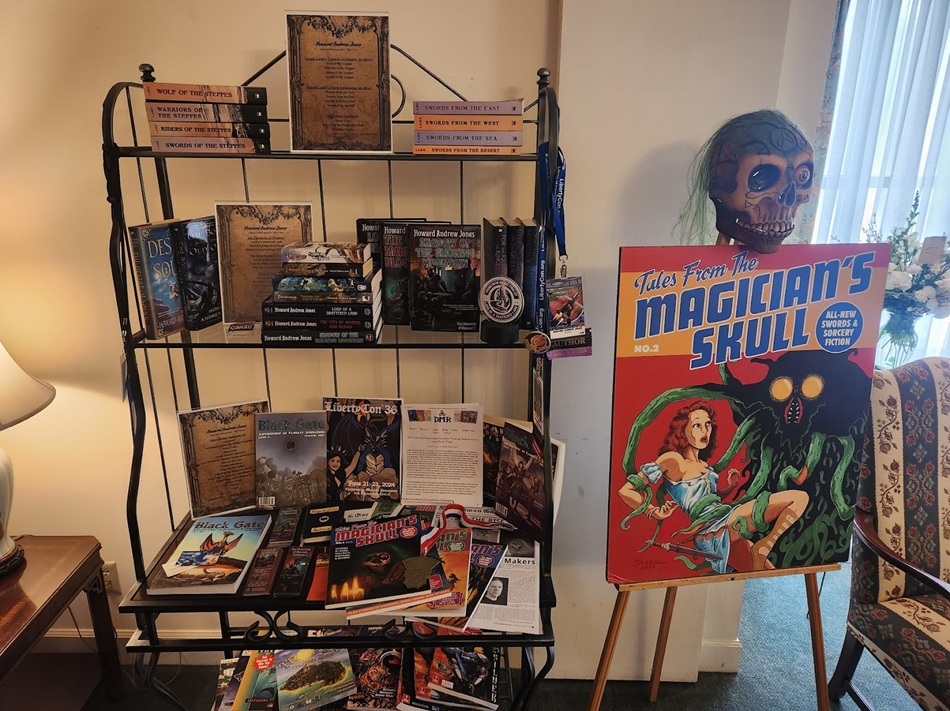 The Writing Display of Howard Andrew Jones at his Celebration of Life, February 22, 2025
Goodreads Sword & Sorcery Group
The Writing Display of Howard Andrew Jones at his Celebration of Life, February 22, 2025
Goodreads Sword & Sorcery Group
The Goodreads S&S Group began in 2012, initiated by Periklis Begzos. We struck a friendship, and I became a lead moderator for 10 years before getting pulled into organizing the Gen Con Writers Symposium over the Covid era (not ironically, a role that followed after HAJ encouraged me to volunteer for the convention). Anyway, S&S GR group still exists, but activity has waned. Regardless, I share a moving anecdote from Periklis that captures how Howard helped others and they helped him:
“Regarding Howard’s touch, I remember discovering his book “The Desert of Souls” in early 2012. I loved it. I was following Black Gate magazine and what struck me the most was the love for the culture (of both S&S and adventure/pulp fiction) that Howard spread. At the same time he announced a competition for naming the Dabir & Asim series. I submitted the name “The Chronicles of Sword and Sand” and was awestruck when it won. Along came a gift pack of all of Howard’s published works, with a printed map and a lovely letter from him. It really pulled me from a dark place I was going around that time and allowed me to start the public Goodreads group about sword and sorcery. So I would think that Howard’s generosity of character and his altruistic involvement with all things Sword & Sorcery are keeping inspired to this day.” Periklis Begzos
Harold Lamb is the ‘Grandfather of S&S’?Perusing HAJ’s comments in the Goodreads Sword and Sorcery Group, I came across this gem that showcases his love for Lamb and S&S.
I stumbled across one of his Cossack collections when I was in high school and was immediately reminded of one of the Leiber collections of Fafhrd and Mouser stories. Not because Khlit the Cossack is a thief and bravo, because he isn’t, but because both Lamb and Leiber wrote serial stories with continuing characters — almost like a TV series — stuffed full of action and adventure and sense of wonder.
I’ve argued at length, in many places, that Lamb is the unsung grandfather of sword-and-sorcery, because he’s got nearly EVERYTHING except the imaginary world and real sorcery. He occasionally (very occasionally) suggests the fantastic. And he is one of the very first to write adventure fiction with a mostly modern feel. He’s still compulsively readable today. Combine that with his laconic style and pacing and sense of adventure — not to mention surprise — and you have something phenomenal.
I was astonished when I discovered how many of his stories that had not been collected were excellent. His work isn’t like, say an obscure rock band that’s only good when you listen to their greatest hits. Even many of his deep album tracks are strong. I dreamed that one day I could find them all and read them. Slowly I did. And because the only job I could find in the economic downturn of the ’90s was as a third shift proofreader, I ended up becoming an editor, which made it possible for me to cold call Bison Books and pitch the collections. I knew how to talk “book” in the language of “editor” and I’d amassed a sizable collection of obscure Lamb texts by that point. Because I loved his stories I’d accidentally become an expert, and because of my accidental training I was perfectly positioned to make it happen. Serendipity. — HAJ 2016, Goodreads Threads
Magazine Editing and Honing A New EdgeIn 2005-2007, Howard edited the first six 6 e-zones of Flashing Swords (this link goes to the archived internet that offers the PDFs! Go get them!). How influential can an e-zine be? Read the introduction of Return of the Sword where esteemed heroic fiction champion Jason M Waltz lists Flashing Swords as one of his inspirations (and provided Jason an opportunity to become an assistant editor; Rogue Blades Entertainment and Foundation evolved from Jason’s own passion to build an S&S community).
In 2006, Howard moved along to take a position as Associate Editor at Black Gate. As John O’Neill mentions in his tribute and oral remembrance, Howard quickly rose from exuberant writer and associate editor to Black Gate’s first Managing Editor. HAJ grew the website driven by a passion to get fresh content posted daily and enlisted over thirty staff. In 2016 Black Gate Magazine was awarded a World Fantasy Award, a recognition that John O’Neill has said reflects Howard’s devotion (keep in mind, John is also a superb, understated mentor/hero who deflects compliments).
In 2008, as Managing Editor at Black Gate, HAJ posted his “manifesto” regarding a resurgence brewing in Sword & Sorcery fiction: Honing A New Edge Part 1 & Part 2 (these originally appeared in the introductory editorials Issue 3 & 4 as “The New Edge”). Excerpts are below. This sentiment resonated with many authors and editors, and a decade after its posting, directly inspired the creation of New Edge Sword & Sorcery Magazine (though editor Oliver Brackenbury has a slightly different definition than that of HAJ, read Oliver’s interview on BG for more). Incidentally, New Edge S&S 2025 has another crowdfunding running now, check out the link for the new Jirel of Joiry.
Traditional S&S Heroes (from Honing A New Edge Part 1)The protagonists in sword-and-sorcery fiction are most often thieves, mercenaries, or barbarians struggling not for worlds or kingdoms, but for their own gain or mere survival. They are rebels against authority, skeptical of civilization and its rulers and adherents. While the strengths and skills of sword-and-sorcery heroes are romanticized, their exploits take place on a very different stage from one where lovely princesses, dashing nobles, and prophesied saviors are cast as the leads. Sword-and-sorcery heroes face more immediate problems than those of questing kings. They are cousins of the lone gunslingers of American westerns and the wandering samurai of Japanese folklore, traveling through the wilderness to right wrongs or simply to earn food, shelter, and coin. Unknown or hazardous lands are an essential ingredient of the genre, and if its protagonists should chance upon inhabited lands, they are often strangers to either the culture or civilization itself. — HAJ 2008
Being Heroic (from Honing A New Edge Part 2 )We’ve been conditioned to believe that there aren’t any real heroes and that everyone’s in it for themselves; we’ve been trained to be skeptical and ironic and detached and sarcastic and hip. Yet even as we sneer and laugh with our friends, we know it’s a lie. Heroes really are out there. They’ve lived and breathed and sacrificed right here on this very Earth, and some of them are still at it. Students of history know them. Sometimes we can even find them covered by our local news stations. Stories of heroes, not of dejected mopers, have inspired us since the dawn of humanity, and we should not be embarrassed if they continue to fire our imagination. — HAJ 2008
HAJ: So what are those New Edge guiding principles? Briefly:-
A hardboiled tone — as in terse and unsentimental
-
Exotic settings and/or settings that live — as in NOT faux Tolkien (if the settings echo Tolkien or other writers then they must be twisted or seen from some new perspective)
-
Evoking a sense of wonder — magic is never banal or easy, the fantastic should not be mundane
-
High energy storytelling — as in fast and without padding
From a 2012 editorial post, we learn HAJ’s gratitude for being part of a community.
We wouldn’t be working so hard to get published in this genre if we didn’t love the genre, and I can trace a lot of my success back to actually becoming involved in it (I already posted about the exact steps to my book deal a year or two ago). Corresponding with other writers, writing reviews for genre sites, reading slush, writing editorials, editing for ‘zines and magazines. Eventually, a whole lot of people had heard of me, so that I wasn’t a complete unknown when it got to be time to try to promote my books.
I didn’t know that was going to happen — I just couldn’t stay away from fantasy fiction, particularly heroic fiction. But it DID happen, and even though every author’s journey is a little different, surely there’s some lessons from this story some of you out there could find useful. — HAJ 2012
When you begin your writing career, you’re joining a community — HAJWriting is a lonely business and I wanted to meet some kindred spirits. What I didn’t realize was that I was also forming a network of friends and allies, AKA “networking.” I dislike that word, though, because it suggests that one is cold-bloodedly setting forth to make friends to climb the ladder, probably before callously putting them aside for new and better and more powerful contacts as one advances. I realize now that I was becoming part of a writing community.
Many writers grow up thinking of the writing profession as a noble romantic one, where we sit alone in a tower room with our raven on a bust of Poe and a cat in our lap. Well, okay, I never pictured that, exactly, but I expected that I would write stuff and I just had to send it out until some editor finally printed me, probably sooner rather than later. As I became a regular at various magazines, I realized just how rewarding it was to be exchanging letters with editors and fellow authors and even readers from the various magazines. After I jumped the editorial fence, I started to comprehend that part of what you’re doing with a magazine is helping to build a community of writers and readers. — HAJ 2012
The Evil Skull versus the Heroic HanuvarIn 2017 (Kickstarter Link), Howard teamed with Joseph Goodman (Goodman Games) to create Tales from the Magizian’s Skull (as Joseph describes in his tribute).
Howard shared my appreciation of how fiction can inspire great gaming. We were both fans of several of the same things: D&D and DCC RPG, Appendix N, and Weird Tales, the publication that first published many of the Appendix N authors. We decided to start a fiction magazine together. From there we created Tales From The Magician’s Skull. The issues of that magazine that I published are among the Goodman Games publications of which I am most proud. Tales From The Magician’s Skull stands out from every other periodical in its category for its titular hero (or perhaps villain?), who would not exist were it not for the weird melding of Howard’s and my brains. Somehow our mutual creativity synthesized this bizarre character who seemed completely real to both of us. The Magician’s Skull was so integral to our mutual imaginations that we tag-teamed to write the editorials, articles, and memorandums attributed to the Skull. — JG 2025
The magazine moved ownership from Goodman Games to Outland in 2024 (here is their KS page for issues 13+ and their current store). The magazine’s run was a creative fusion of Howard and Joseph, but Howard was the frontman under the mask and editor. I shared my thoughts within the Science Fiction Writers of America (SFWA) obituary, and echo them here since they capture how Howard and the Skull persona complemented each other:
Howard’s Skull’s persona resonated since it was the antithesis of him. Whereas the villainous champion of the titular magazine spitefully called his readers ‘mortal dogs’ and regularly ‘immolated’ his interns, the man behind the mask was known to be overly gracious, coaching aspiring, mature, and professional writers in myriad conventions, editing, blogs… for decades! He mentored tirelessly even as his body failed. A week before he was diagnosed with terminal cancer, he improvised a personalized ‘Hey Jude’ song at Gen Con Writers Symposium to inspire me on the piano beside the green room, and the lyrics motivate/haunt me continuously. How did he exude so much vitality?
His Hanuvar character embodies Howard more accurately, a veteran striving to save his shattered family and reunite his community (refreshing compared to the flood of immoral, vengeful protagonists available). Howard could strike a friendship up in minutes, and combined with his passion for storytelling, [this] makes him one to be remembered as much as for his heroes as for his own heroism. Howard was the quintessential role model. I imagine him inspiring us now in our time of mourning: ‘Behold, mortal readers, do your morning stretches, carry on, and realize the stories inside you. Swords together!’ — SEL
A Confluence of S&S Community Builders In 2022, I reported on the S&S Rogues in the House podcast for Black Gate. As the Rogues moved beyond podcasts to build the Sword & Sorcery community, they started publishing anthologies including the just-released A Book of Blades. With my Event Coordinator role for the Gen Con Writers Symposium, I did my best to gather the Rogues and other contributors to A Book of Blades on several panels. Collected were the Rogues in the House podcasters, HAJ of the Skull magazine, Jason Ray Carney of Whetstone Amateur Sword & Sorcery Magazine, and myself. We gathered in Marriott Ballroom #4 to record this special session. At 6:45 min:sec, the Skull crashes the party and awards his only named intern an award. Click here to listen: The Rogues on Hallowed Ground (link to Aug 8-2022 podcast episode)“Rogues, old and new, meet at the mecca called Gen Con. In this very special episode, Deane Geiken and Matt John are joined by Howard Andrew Jones, Seth Lindberg, Steve Diamond, Sean CW Korsgaard, Jason Ray Carney, and *shudders* The Magician’s Skull himself. Topics include sword and sorcery (of course) as well as our “top picks” from Gen Con.”
 2023 Gen Con, the Skull with Joseph Goodman, Matt John, Seth Lindberg
Day of Might
2023 Gen Con, the Skull with Joseph Goodman, Matt John, Seth Lindberg
Day of Might
The Skull is responsible for creating the first Sword & Sorcery holiday to be celebrated every October 23rd. A cartoon excerpt from Tales from the Magician’s Skull explains the inception (below) and Skull TV captures essential broadcasting of the initial days.
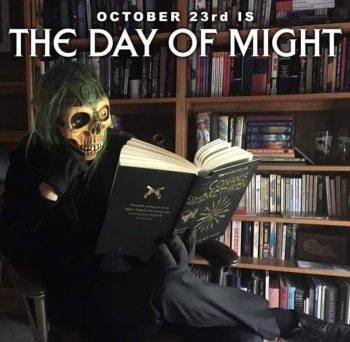

I have been grateful to HAJ for many years, from being a fan of his S&S blogs and appearances at World Con 2010, to meeting him at Gen Con and having him coach me into volunteering at the Writers Symposium ~2017 (which grew into me chairing it in 2023), for bridging the connection to John O’Neill to edit for Black Gate online magazine (~2019 onward), and for being able to intern for his magazine Tales From the Magician’s Skull as acquisition editor and for being a social media intern for the Skull (~2022).
The outpouring of memorials speaks to HAJ’s character and influence. Each instance, even the shorter obituaries, amplifies his life and reveals nuances. Below I list several so I, and anyone visiting here, can learn more about the man we miss. There are many more tributes than those listed below. More may be added after the original posting date as I track those down.
Did you know Howard… was once a TV cameraman? Created an official Walk Through Guide for a Castlevania game? Coined New Edge Sword & Sorcery?- Locus: abbreviated verionHoward Andrew Jones (1968-2025); longer version by CSE Cooney, John O’Neill, John Hocking, Matthew John, Scott Oden) available in Issue 769 also inside the celebration display p16.
- SFWA: In Memoriam: Howard Andrew Jones [John O’Neill, SE Lindberg, Martha Wells, Sean CW Korsgaard]
- Joseph Goodman (Skull publisher) A Tribute to Howard Andrew Jones
- John ONeill (Black Gate): Howard Andrew Jones, July 19, 1968 – January 16, 2025
- Jason Ray Carney: Howard Andrew Jones, a Mentee’s Perspective
- Bob Byrne An Important Life – Howard Andrew Jones (1968 – 2025)
- Brian Murphy: Rest in peace, Howard Andrew Jones
- Sean CW Korsgaard This is one of the hardest things I’ve had to write in my career. Howard Andrew Jones is dead
- Mark Rigney (Celebration of Life farewell)
- Greg Mele: “Swords Together, buddy” Private Facebook Post
- Matt John — Devastated to learn my friend, Howard Andrew Jones, has passed.
- Deuce Richardson (DMR) Howard Andrew Jones Has Fought His Last Battle
- Vanessa Armstrong Author Howard Andrew Jones Passes Away at Age 56
- Michael Grossberg Acclaimed fantasy writer and Prometheus finalist Howard Andrew Jones, R.I.P.
- Paizo (Pathfinder) Paizo Remembers Howard Andrew Jones
- Morgan Holmes Remembering Howard A. Jones
- Keith West RIP, Howard Andrew Jones
 Howard Andrew Jones’ Office in Evansville
Heroes really are out there. They’ve lived and breathed and sacrificed right here on this very Earth, and some of them are still at it. Students of history know them. Sometimes we can even find them covered by our local news stations. Stories of heroes, not of dejected mopers, have inspired us since the dawn of humanity, and we should not be embarrassed if they continue to fire our imagination. — HAJ 2008
Howard Andrew Jones’ Office in Evansville
Heroes really are out there. They’ve lived and breathed and sacrificed right here on this very Earth, and some of them are still at it. Students of history know them. Sometimes we can even find them covered by our local news stations. Stories of heroes, not of dejected mopers, have inspired us since the dawn of humanity, and we should not be embarrassed if they continue to fire our imagination. — HAJ 2008
S.E. Lindberg is a Managing Editor at Black Gate, regularly reviewing books and interviewing authors on the topic of “Beauty & Art in Weird-Fantasy Fiction.” He has taken lead roles organizing the Gen Con Writers’ Symposium (chairing it in 2023), is the lead moderator of the Goodreads Sword & Sorcery Group and was an intern for Tales from the Magician’s Skull magazine. As for crafting stories, he has contributed eight entries across Perseid Press’s Heroes in Hell and Heroika series, and has an entry in Weirdbook Annual #3: Zombies. He independently publishes novels under the banner Dyscrasia Fiction; short stories of Dyscrasia Fiction have appeared in Whetstone, Swords & Sorcery online magazine, Rogues In the House Podcast’s A Book of Blades Vol I and Vol II, DMR’s Terra Incognita, and the 9th issue of Tales From the Magician’s Skull.
Maggie The Undying: Title Reveal
We interrupt this scheduled broadcast with breaking news.

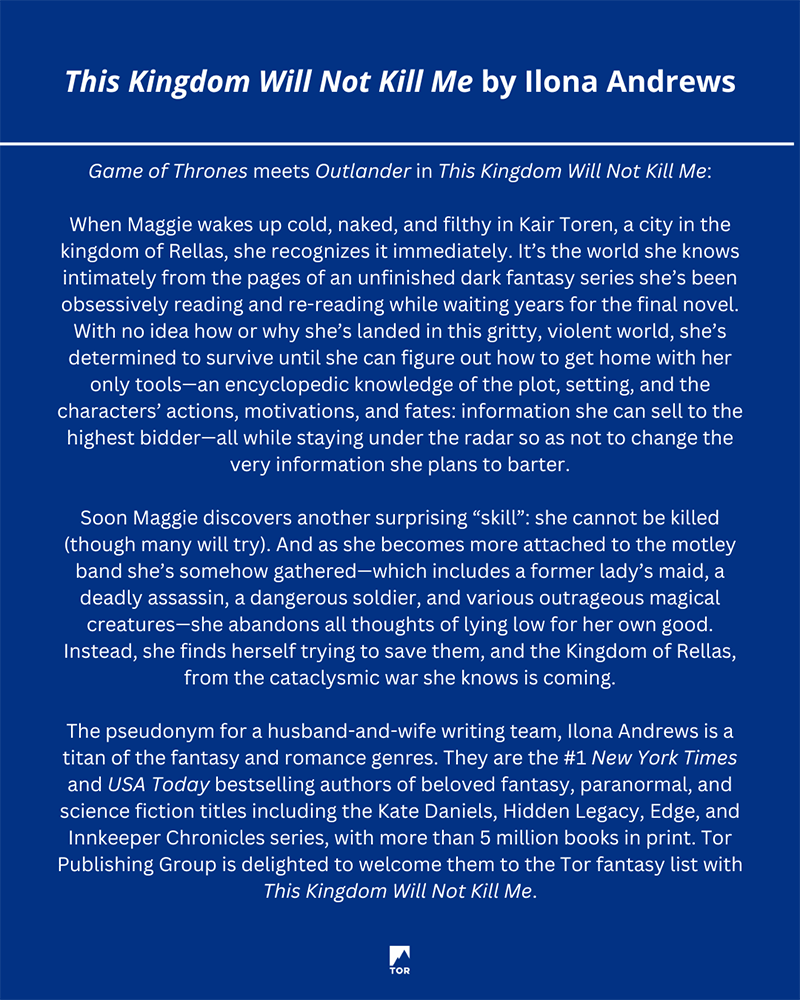
Text of the Announcement:
This Kingdom Will Not Kill Me by Ilona AndrewsGame of Thrones meets Outlander in This Kingdom Will Not Kill Me
When Maggie wakes up, cold, naked, and filthy in Kair Toren, a city in the kingdom of Rellas, she recognizes it immediately. It’s the world she knows intimately from the pages of an unfinished dark fantasy series she’s been obsessively reading and re-reading while waiting years for the final novel. With no idea how or why she landed in this gritty, violent world, she’s determined to survive until she can figure out how to get home with her only tools – an encyclopedic knowledge of the plot, setting, and the characters’ actions, motivations, and fates: information she can sell to the highest bidder – all while staying under the radar so as not to change the very information she plans to barter.
Soon Maggie discovers another surprising “skill”: she cannot be killed (though many will try.) And as she becomes more attached to the motley band she’s somehow gathered – which includes a former lady’s maid, a deadly assassin, a dangerous soldier, and various outrageous magic creatures – she abandons all thoughts of lying low for her own good. Instead she finds herself trying to save them, and the Kingdom of Rellas from the cataclysmic war she knows is coming.
And then there is a nice paragraph about us and our writing stuff.
To reiterate:
Series title: Maggie the Undying.
Book 1 Title: This Kingdom Will Not Kill Me.
Book 1 Release date: March 31, 2026
Why is this announcement happening now?
Because TOR has learned that the Book Devouring Horde is not to be denied. They were planning to keep the title and release date under wraps until we had the cover, but it was concluded by all that since this book will be presented at London Book Fair next week, BDH will surely find out the details and will blast them all over the internet.
Congratulations, you are mighty!
How dark and gritty is this?
As we are finishing up the edits – page 649 of 808 – actually, not that dark and gritty. The Game of Thrones in the blurb above refers to the epic fantasy nature of the series and the Outlander reference is about the portal nature of the books, where the main character is transported into another world.
There are some tough scenes, but it’s nothing that exceeds our usual. If you’ve read Kate Daniels or Hidden Legacy, you should be fine. There is no on page rape, although sexual assault does happen in this world. The book overall has an uplifting trajectory.
Is this truly a fantasy?
Yes. Knights, assassins, weird magical beasts, swordfights, unhinged mages, the whole thing. This is meant to be a world of epic fantasy tropes.
Is there romance?
Yes. There is a romantic arc, but this is not a romance. This is an epic fantasy. That said, if you are a romance reader, you will likely enjoy this.
Is this one of those stories where it was all a dream and she wakes up and nothing changed and she is back in her own world…
No. I hate the dream thing. Not a dream. We would not put you through an emotional wringer to just then make it not matter.
That’s it. More to come, as our agent likes to say.
PS. Mod R has a fun post which will go out on Monday.
The post Maggie The Undying: Title Reveal first appeared on ILONA ANDREWS.
Lights Out - Book Review by Voodoo Bride
 Lights Out (Into Darkness #1)by Navessa Allen
Lights Out (Into Darkness #1)by Navessa AllenWhat is it about:I want someone with a soul as black as night. Someone who would burn the world down for me and not lose a single minute of sleep over it.
Trauma nurse Aly Cappellucci doesn’t need any more kinks. She likes the one she’s landed on just fine. To her, nothing could top the masked men she follows online. Unless one of those men was shirtless, heavily tattooed, and waiting for her in her bedroom. She dreams about being hunted by one in particular, of him chasing her down and doing deliciously dark things to her willing body. She never could have guessed that by sending one drunken text, those dreams would become her new reality.
I want things most people don’t, craving darkness and depravity instead of light and love.
Josh Hammond has spent his life avoiding the limelight, but his online persona is another story. At night, he posts masked thirst traps for his millions of fans to drool over, but one follower has caught his eye: Aly. After reading a comment begging him to break into her house wearing a mask, he decides to take her up on her offer.
Together, Aly and Josh live out their darkest fantasies, unaware that Aly has captured the attention of someone else. Someone with far more sinister intentions than a little light stalking. As Josh turns from predator to protector and the stakes heighten, he must ask himself how far he’s willing to go for the woman he’s obsessed with.
What did Voodoo Bride think of it:*Might be a tiny bit spoilery*
Either I'm more depraved than I thought, or there needs to be a serious discussion about what a Dark Romance is.
Because this wasn't dark at all in my opinion!
Not that that was a bad thing: I haven't laughed so much while reading a Romance in a long time. And not because the story is laughable, but because it really is meant to be funny.
I liked Aly and Josh from the start. Josh is a bit of a social disaster, but otherwise they're both just really fun people. I enjoyed learning more about them and seeing them fall for each other.
There were two minor annoyances:1 - Even though their backstories were entertaining, I didn't like it that those were used as an explanation for their kinks. You don't need a trauma or tragic event to enjoy kinks.2 - Saying "No safe word. Just say stop, and I'll stop." = a safe word!!!!!But those were minor as I said. I could easily put it aside for the sake of the story.
All in all I had a great time with this, and even Sullivan got invested when real danger was introduced to make things a bit more suspenseful. He also really liked Fred, the cat.
You bet we will get hold of the next book.
Why should you read it:It's a very enjoyable Dark Romance

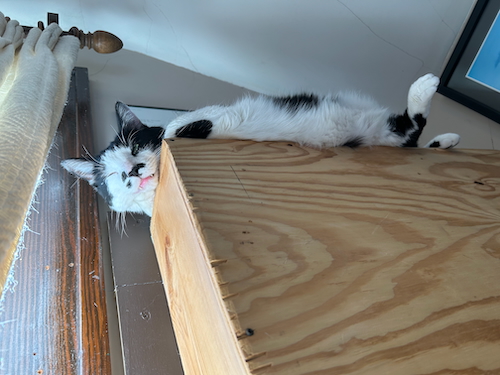

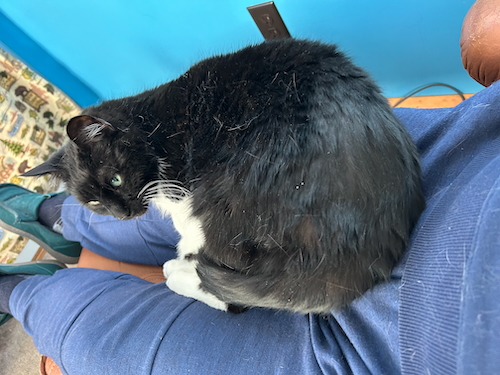
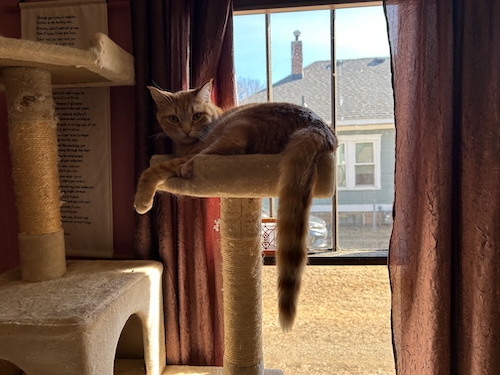
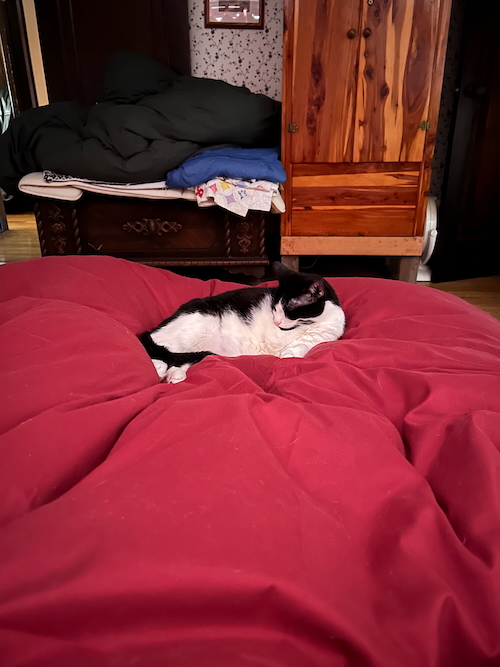



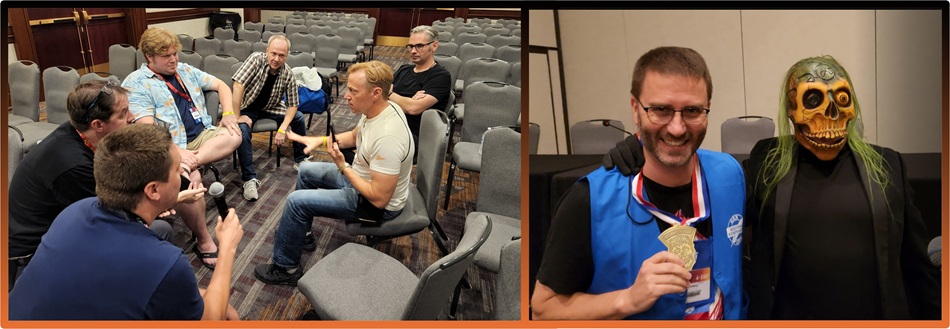
Recent comments